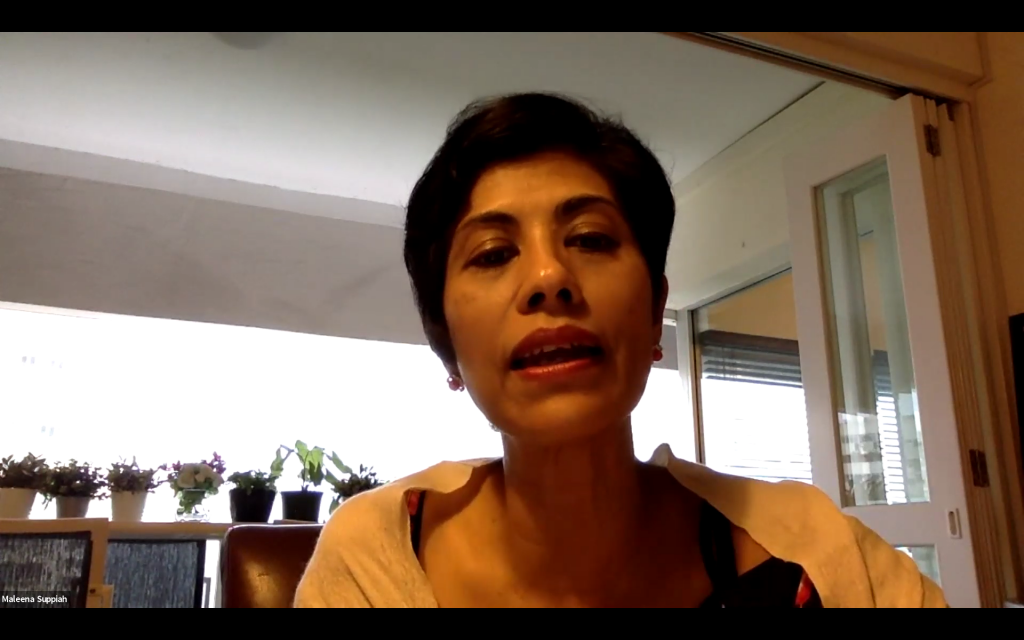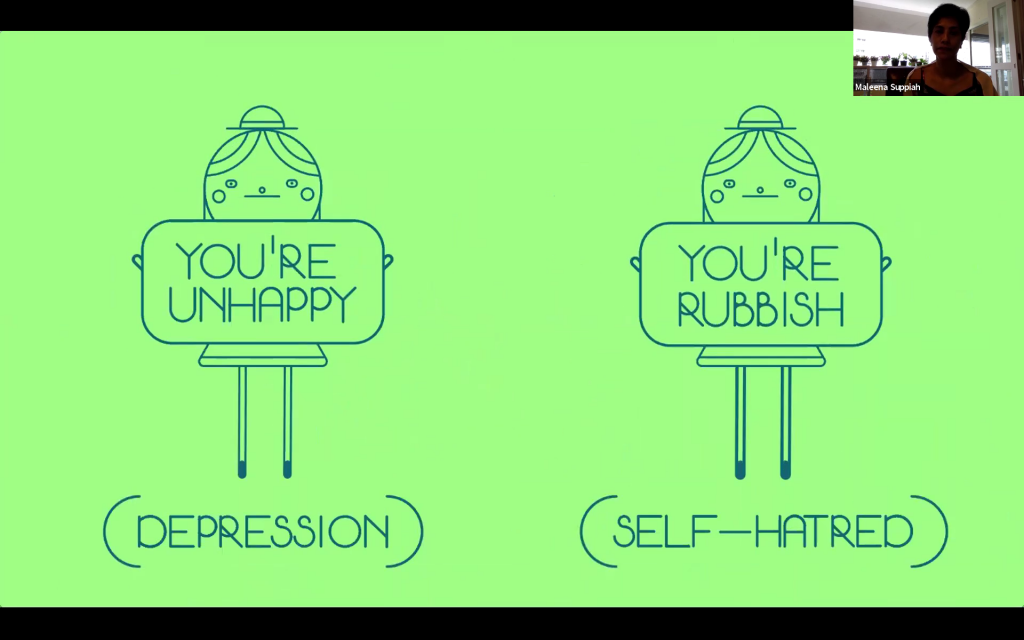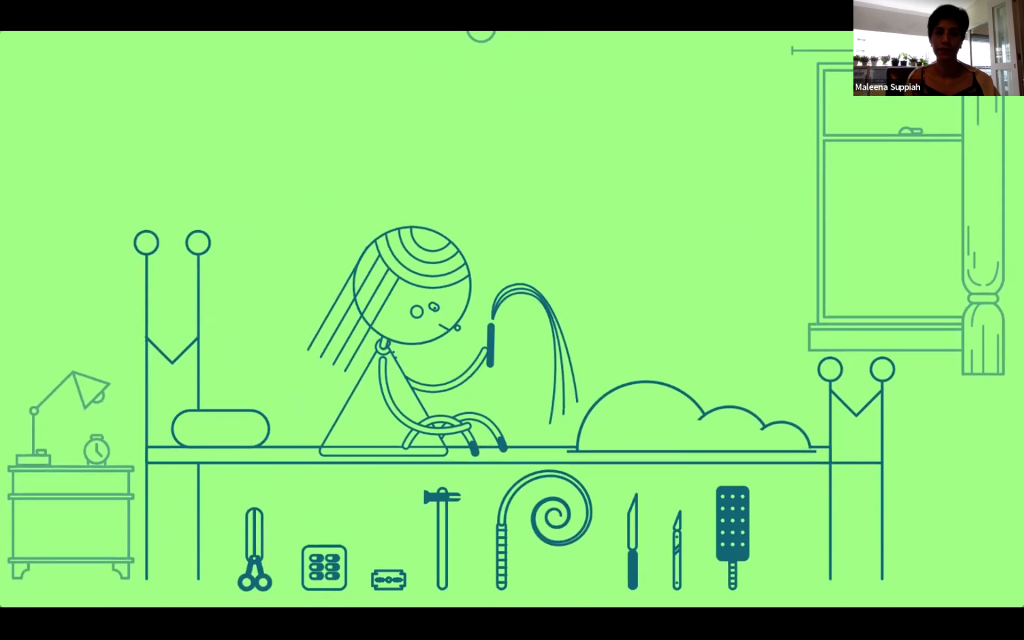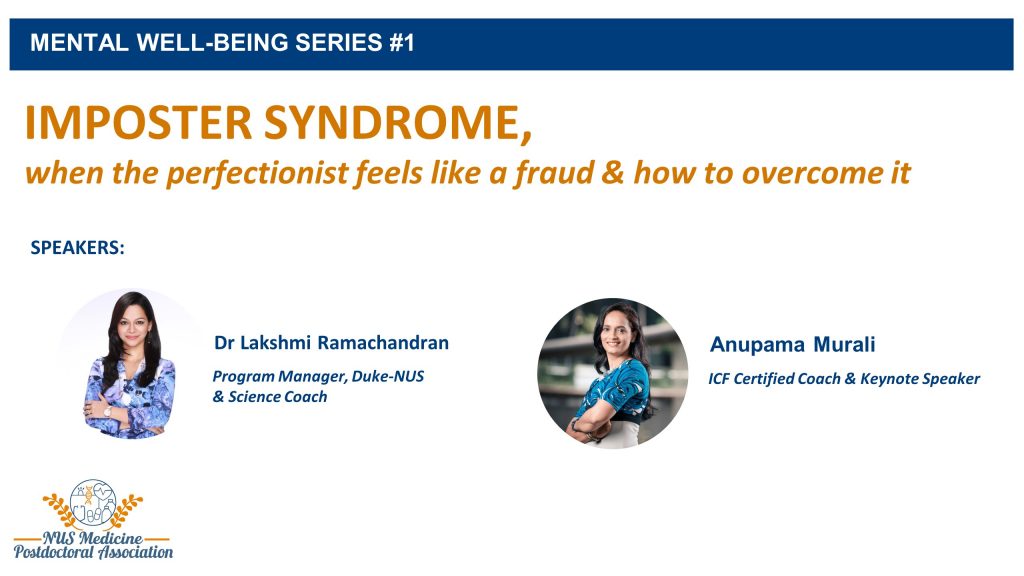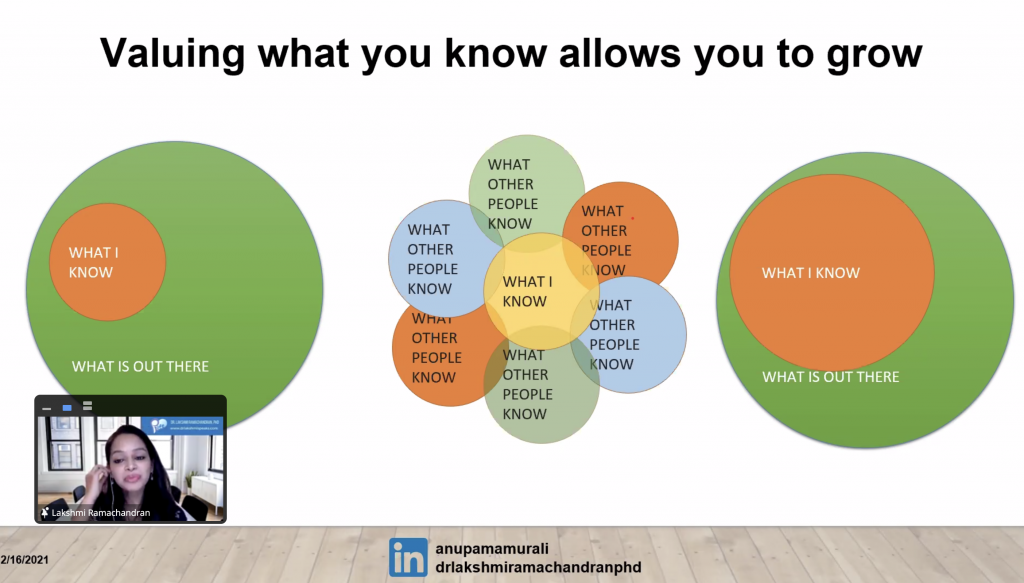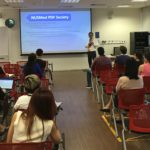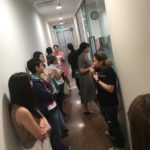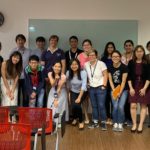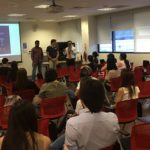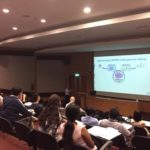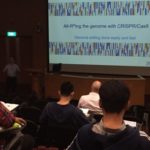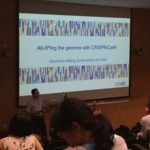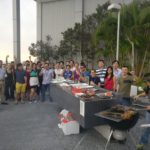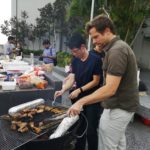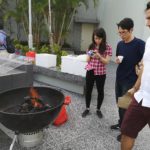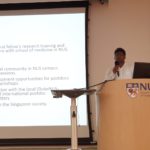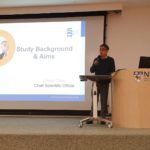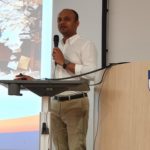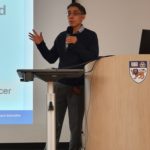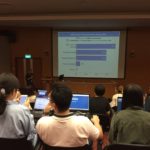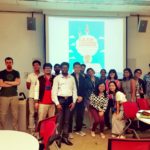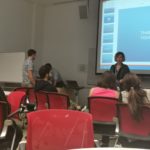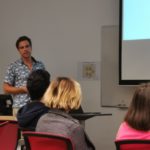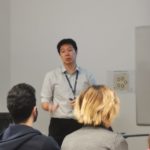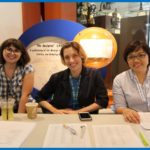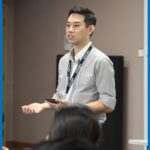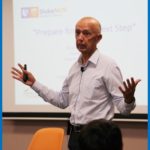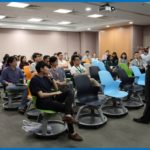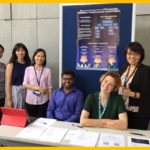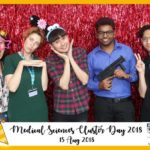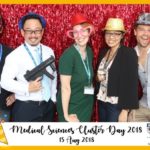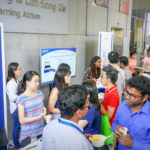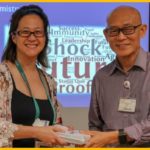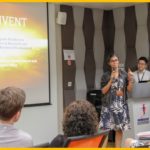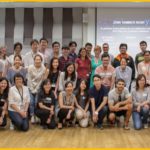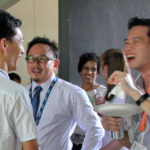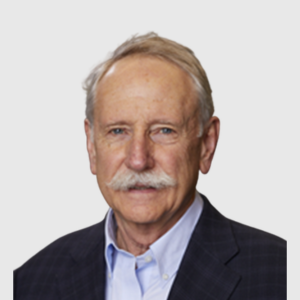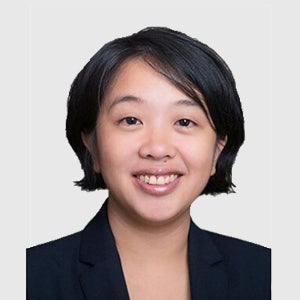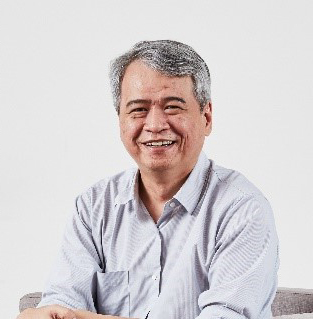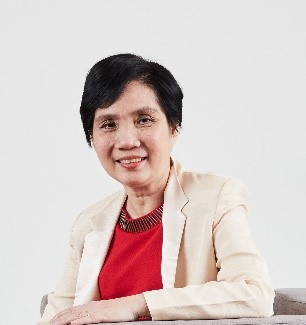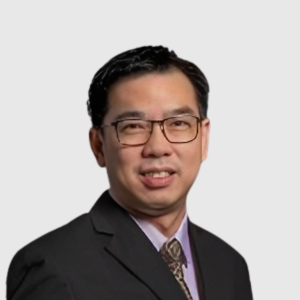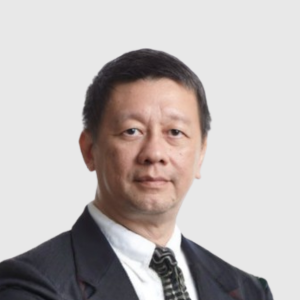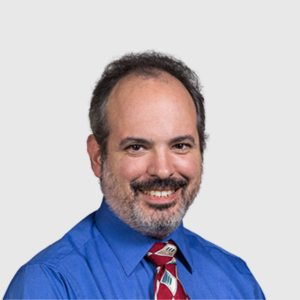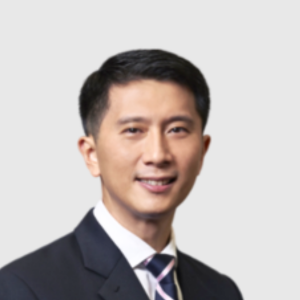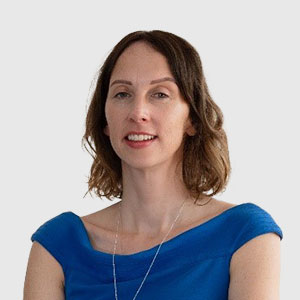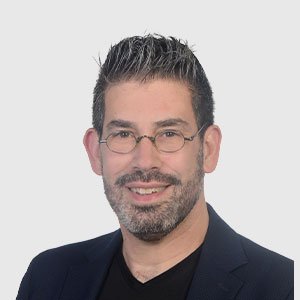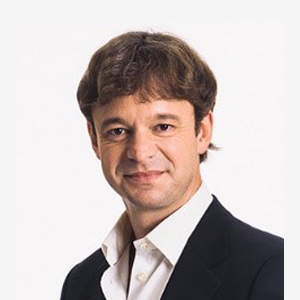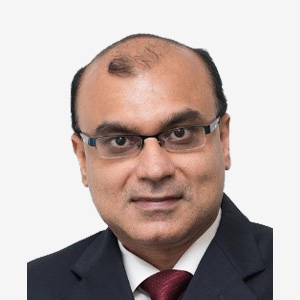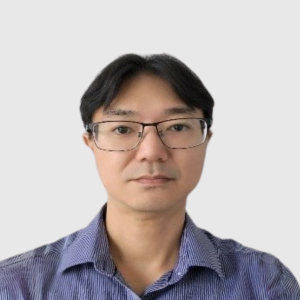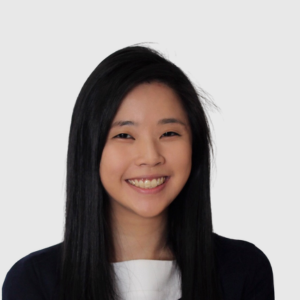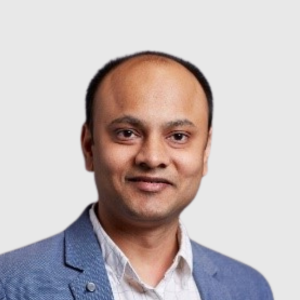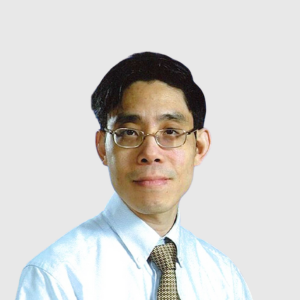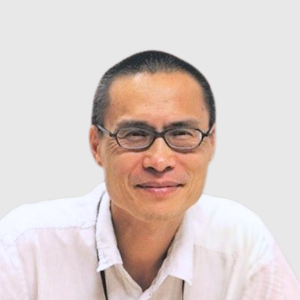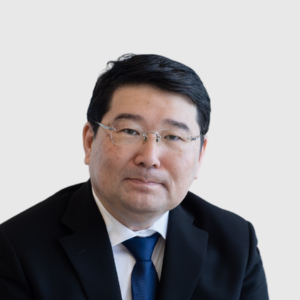The NUSMed Postdoctoral Association aims to build a vibrant community and provide career development opportunities for fellow postdocs. As part of the NUSMed postdoc family, we welcome you to join our line-up of events, which may be anything as informal as social gatherings to serious events like career workshops. Here are the events that we have organised so far.
2024-25 Events
PDA Day: Unlocking New Frontier for Postdoctoral Excellence – 24 Apr 2025
The NUS Yong Loo Lin School of Medicine Postdoctoral Association (PDA) celebrated its annual flagship event, PDA Day 2025, bringing together over 200 postdoctoral researchers from across Singapore. The event offered a dynamic platform to explore diverse career pathways, including academia, education, biotech, and consulting, while gaining insights into Singapore’s thriving healthcare and bioscience ecosystem.
Sessions spanned a range of career-focused topics. Participants received practical guidance on building an academic career, from early research experiences to teaching and mentoring. Other sessions highlighted the mindset shifts, agility, and resilience needed to transition from academia to industry, providing an unfiltered view of Singapore’s biotech landscape and the opportunities available for postdocs in health innovation.
The event also showcased real-life career journeys, emphasizing the value of soft skills, purposeful networking, and embracing nonlinear paths. Participants were encouraged to leverage every experience, develop transferable skills, and approach career transitions with flexibility and confidence.
Interactive panel discussions and Q&A sessions covered consulting careers and other professional pathways, providing practical advice on entering competitive fields and using them as launchpads for broader opportunities. With a mix of insights from academia, industry, and real-world career experiences, PDA Day 2025 inspired postdoctoral researchers to explore, pivot, and thrive in their next career steps.
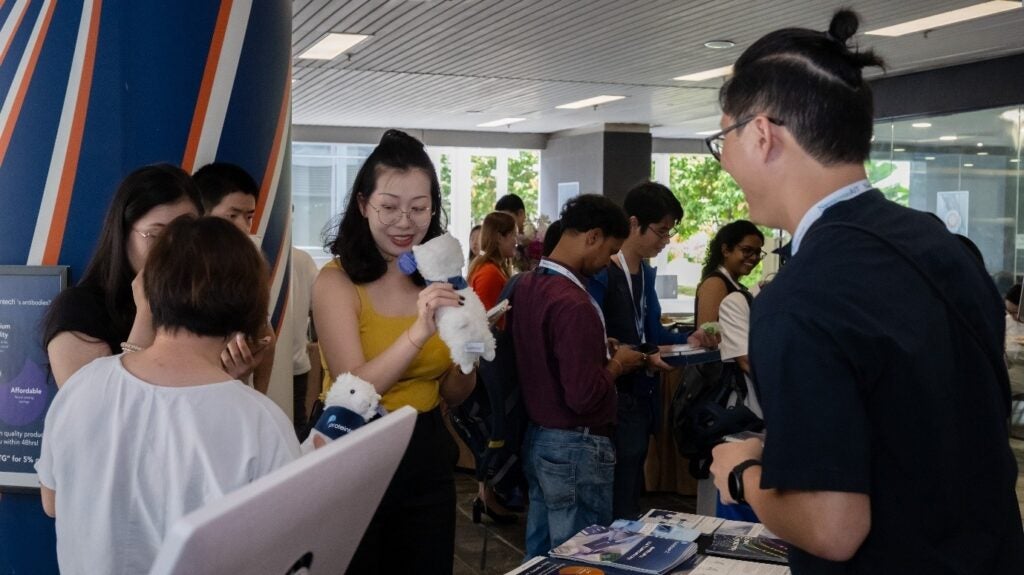
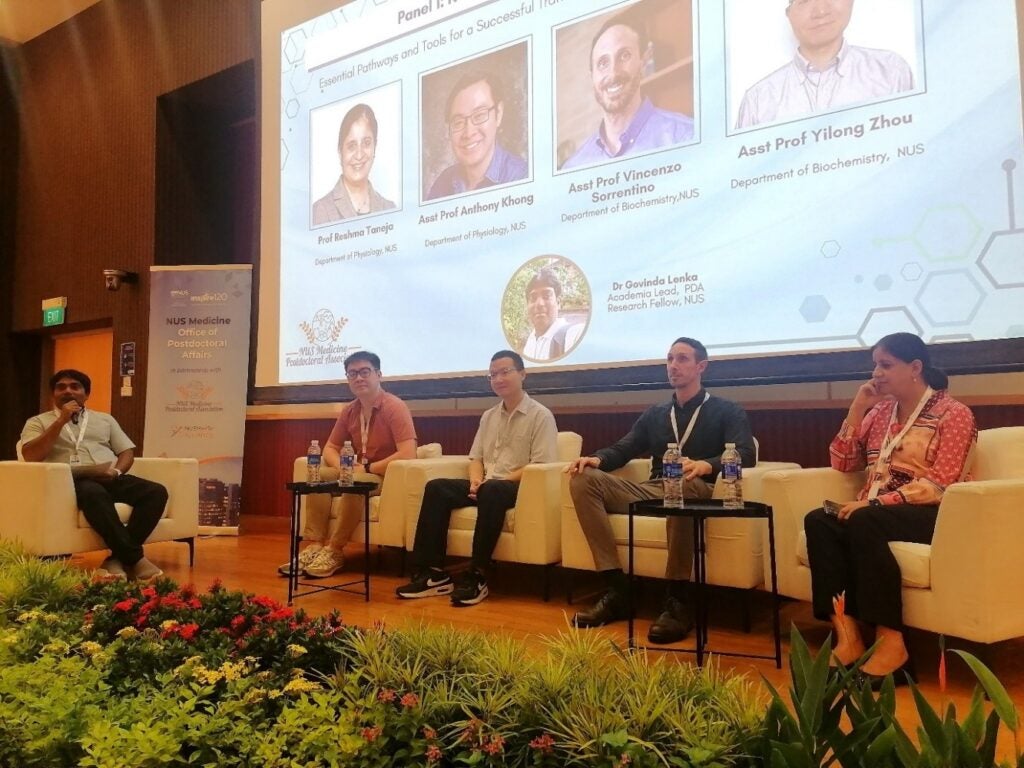
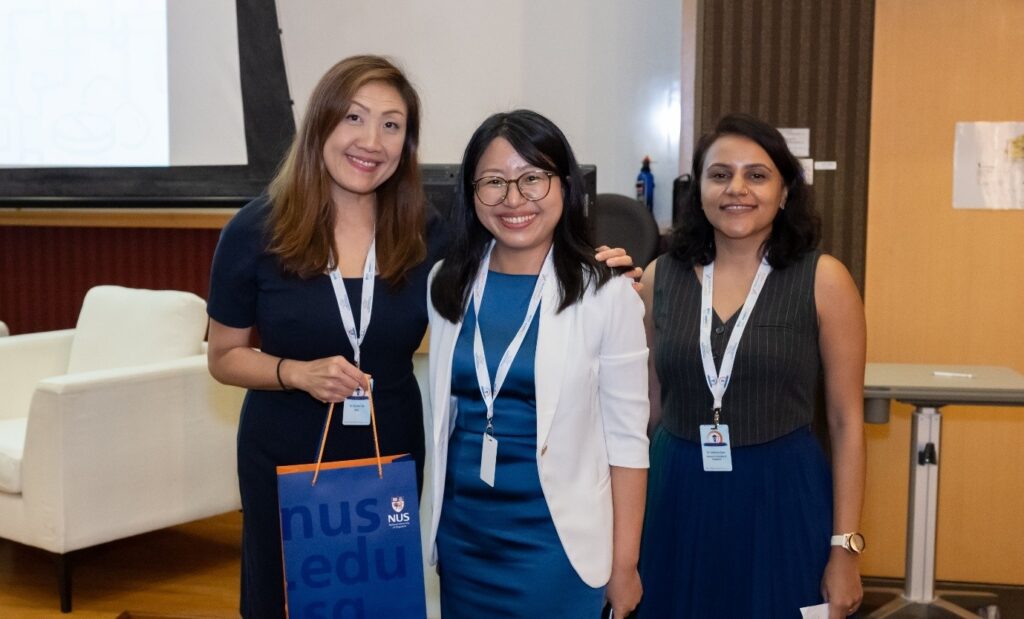
Pre-Launch for NUS Medicine OPA x ProteinTech collaboration – 4 Apr 2025
The recent Pre-Launch showcased how industry and academia can come together with purpose. The session highlighted exciting opportunities exclusively for postdoctoral researchers and graduate students, including upcoming grant calls, image competitions, and early-career resources for those considering a transition into industry. This partnership, born from a shared vision, promises even more collaborations in the future.
Participants were among the first to hear about exclusive benefits, such as discounts on cutting-edge research tools, free premium antibodies, and tailored resources to accelerate academic growth. The event also provided a valuable networking experience, complete with a coffee cart, candy buffet, and a live Q&A session to address participants’ questions. The first 50 attendees (or more) even received a cute alpaca plushie, adding a touch of fun to the professional program.
Designed for both career development and community engagement, this Pre-Launch session offered postdocs and graduate students the chance to exchange ideas, discover new opportunities, and connect with fellow researchers. It was a celebration of curiosity, collaboration, and the shared commitment to advancing research and innovation.
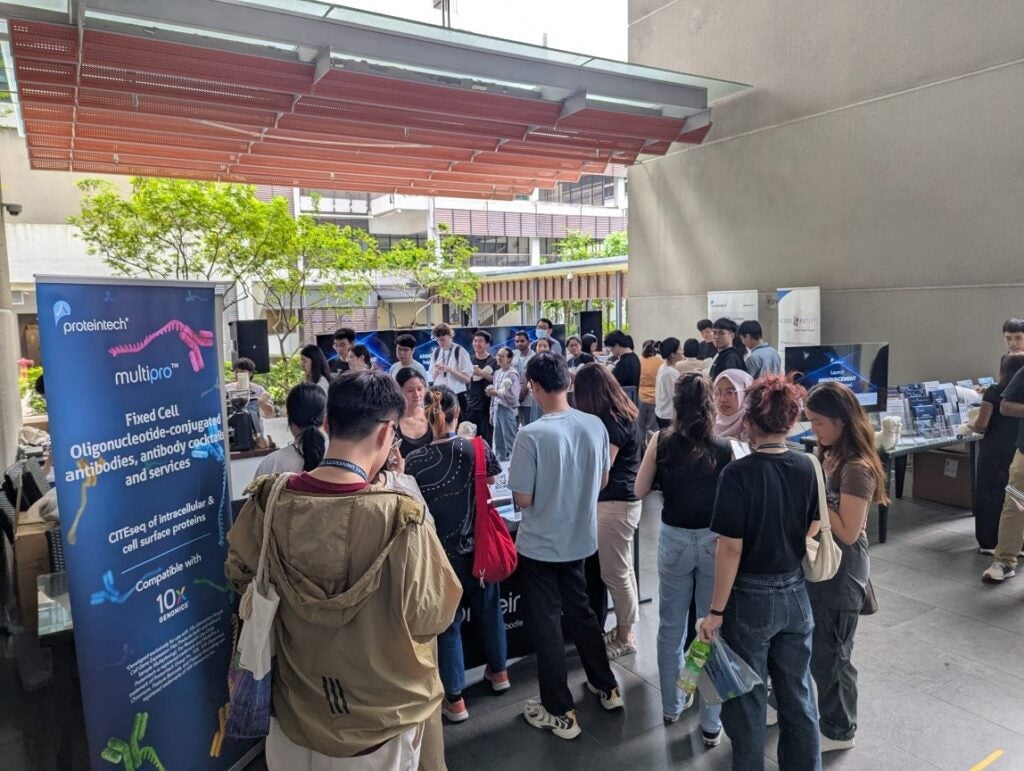
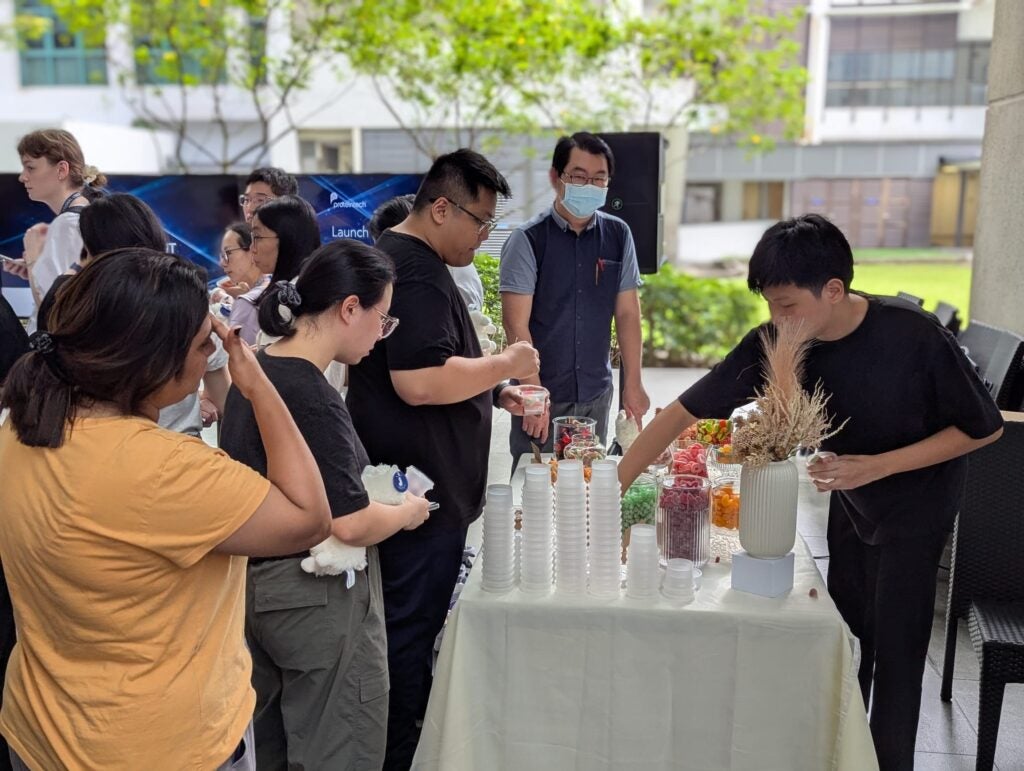
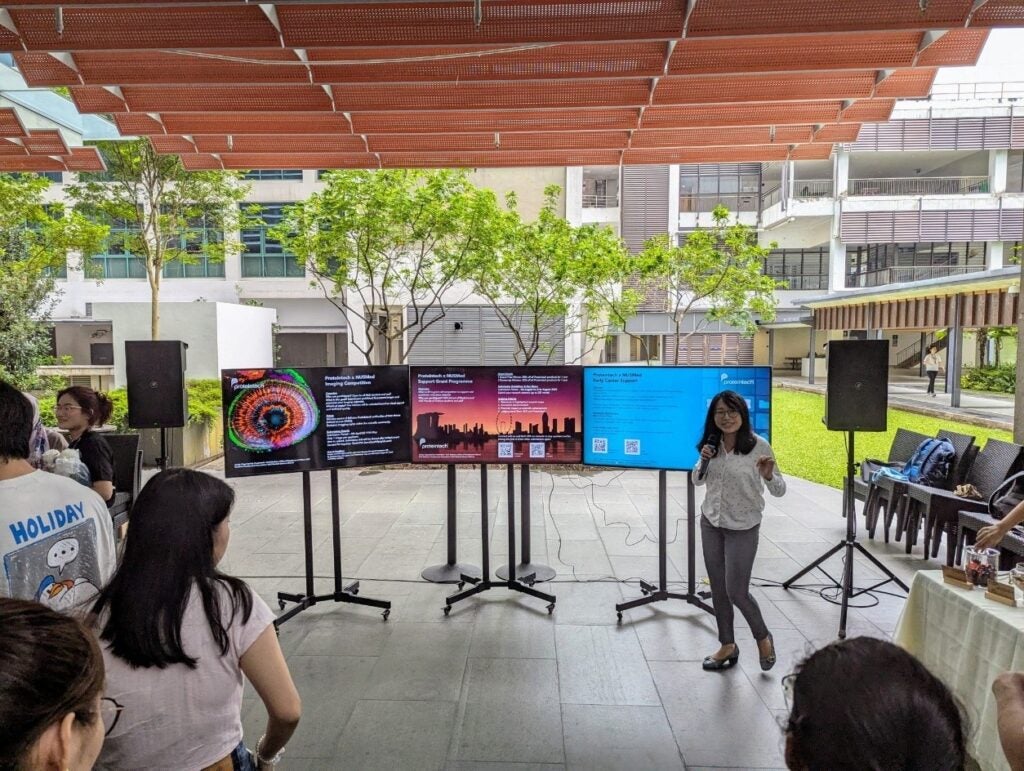
Celebrate the winners of NUS Medicine OPA x Merck Postdoctoral Research Grants – 3 Mar 2025
We were delighted to recognise the outstanding achievements of our postdoctoral researchers at the recent Research Grant Awards ceremony, supported in partnership with Merck Group. Each awardee received a SGD 10,000 grant to advance their innovative projects, which ranged from basic research on repurposed drugs and stem cells to a clinical trial on exercise interventions.
Congratulations to Dr Adrian Oo, Dr Mick Lee, Dr Hang Liu, and Dr Joyce Chong for their brilliant proposals and inspiring presentations. Their passion and dedication shone through, making the event both memorable and energising. These grants aim to accelerate the progress of their research and bring us closer to real-world impact.
We extend our sincere thanks to Merck Group and Ahreum (Dana) Kim for their invaluable partnership and support in making this event possible. This celebration of research excellence underscores our commitment to empowering postdoctoral researchers in their pursuit of discovery and innovation.
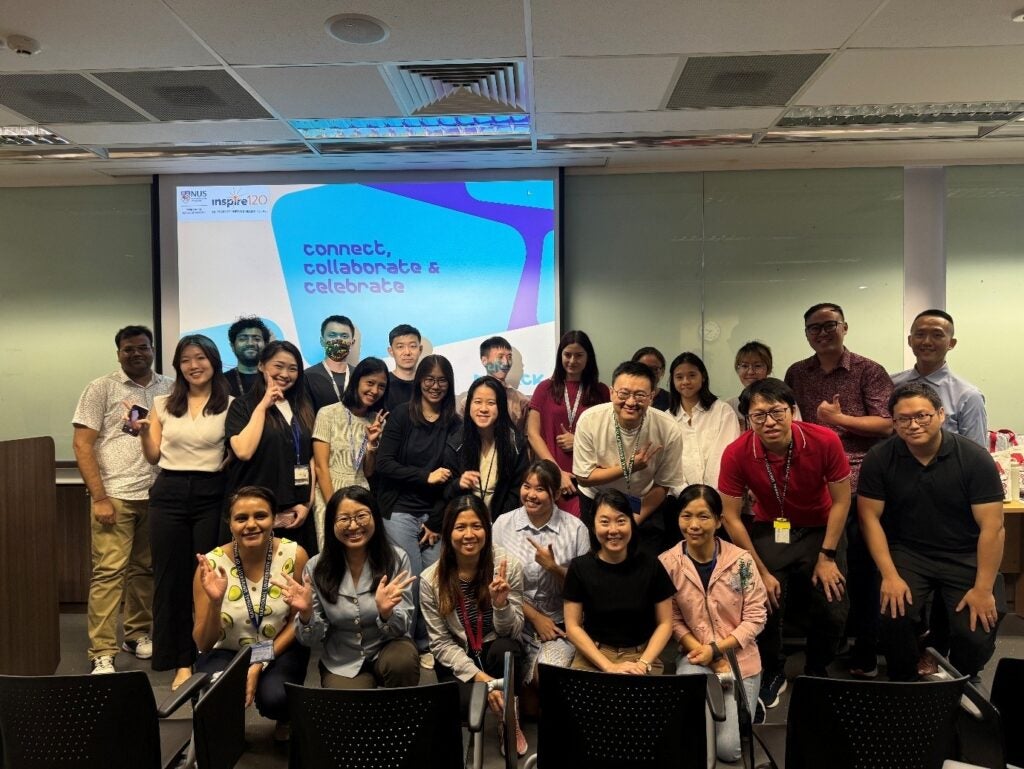
Unlock New Horizons: Transitioning from Graduate Student or Postdoc to Educator – 28 Feb 2025
Our recent session, Educators in the Making: A Strategic Guide for Postdoc Career Transitions, brought together postdocs and PhD holders eager to explore pathways into teaching careers. The event offered clear guidance on transitioning into educator roles, essential skill-building strategies, and candid sharing of real-world experiences from seasoned educators. An engaging Q&A segment further addressed participants’ concerns, leaving many with renewed clarity and confidence.
The session was led by Neelima Gupta and Noof Abdullah Saad Shaif, with insightful contributions from panelists Inthrani Raja Indran, Arthur Lau, David Fann, Wong Lik Wei, and Ira Agrawal. Their open and practical advice resonated strongly with the audience, providing not only inspiration but also actionable tips for building teaching portfolios and gaining relevant experience.
Participant feedback was overwhelmingly positive. One attendee remarked, "The candid sharing by yourself and the rest of the speakers have confirmed for me some of the things I’ve always known about being an educator (it’s hard work- mad respect to you all for choosing this path!). But more than that, I’ve walked away with very practical tips on building a portfolio that can be implemented at the current stage of my research career, getting experience and plenty of good questions to ask myself, to find out if I really can do this for the long run. The event was very helpful and thoughtfully organised, Neelima! Thank you for your time and hard work."
This session highlighted the strong interest among our research community in pursuing education-focused careers and reaffirmed the importance of supporting postdocs and PhDs in navigating diverse career transitions.
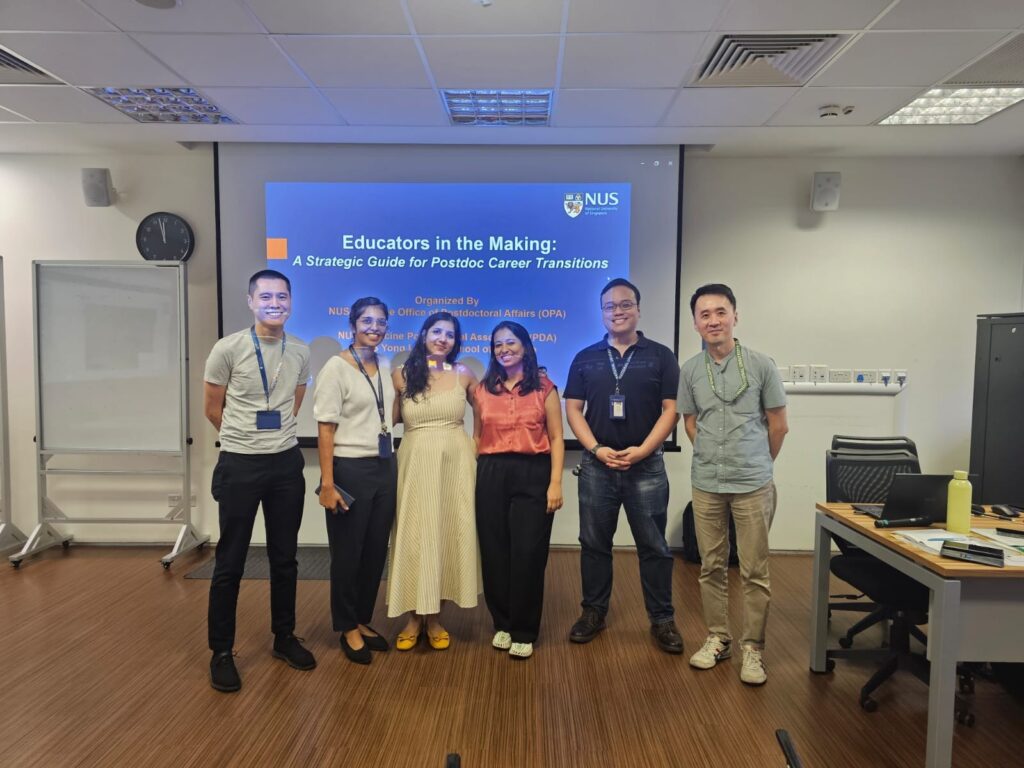
Elevate Your Career: Consulting Opportunities with Simon-Kucher – 24 Jan 2025
A recent career talk featured guest speakers from Simon-Kucher: Melanie Weller, Xin Ying Chua, Joshua Siow, and Ruchi Hotchandani, who shared valuable insights on transitioning from academia to consulting and what career progression in the field looks like.
One of the key takeaways highlighted during the session was the importance of clear communication, not only for making a successful transition into consulting but also for excelling in the role. The discussion demonstrated how consulting can offer a dynamic pathway for PhD holders to apply their expertise beyond research.
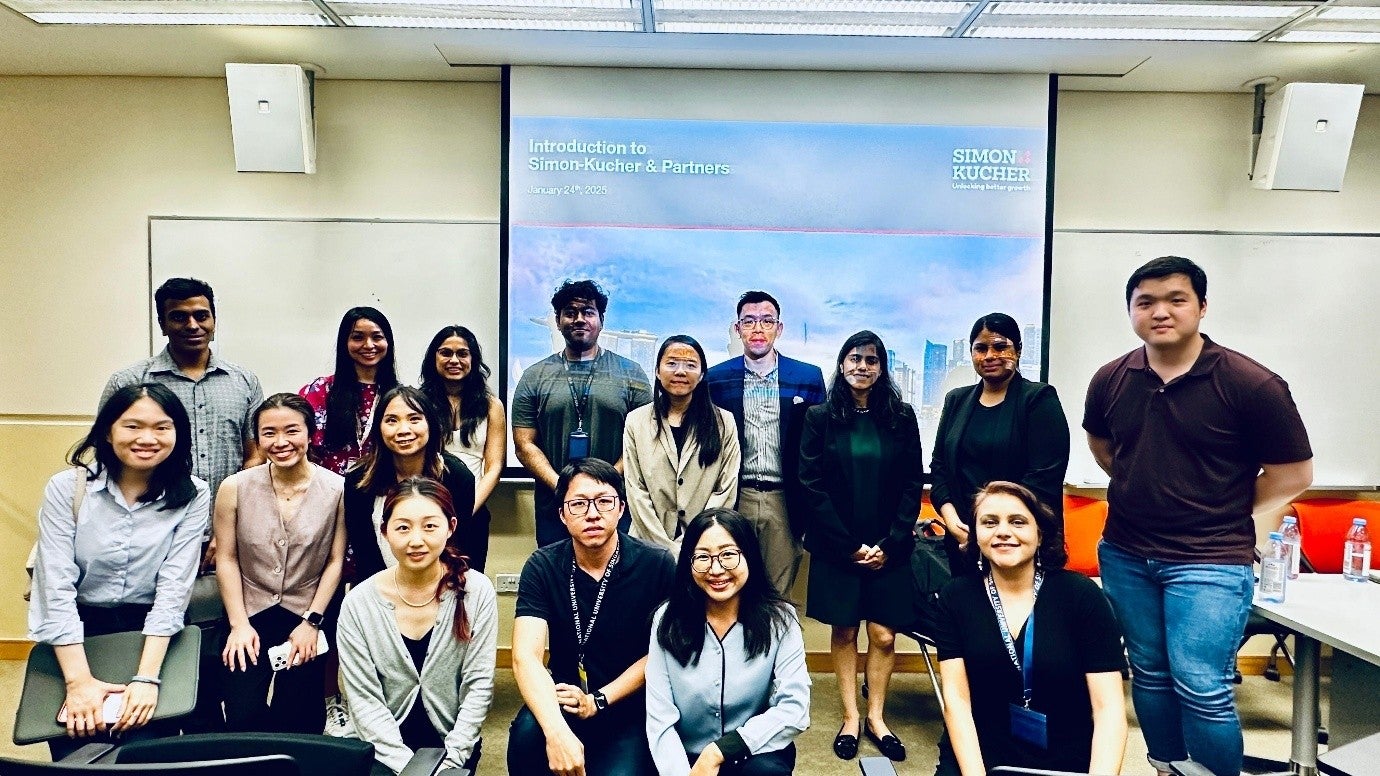
A Dialogue with Nobel Laureates: Transforming Scientific Breakthroughs into Real-World Solutions - 8 Jan 2025
NUS Medicine Office of Postdoctoral Affairs (OPA) hosted an inspiring dialogue with Nobel Laureates as part of the Global Young Scientists Summit (GYSS) ecosystem events. Jointly organised by the National Research Foundation Singapore and the NUS Department of Pharmacy and Pharmaceutical Sciences, the event brought together leading minds in science to share how transformative discoveries can be translated into solutions that benefit society.
The distinguished panel featured Professor Sir Richard Roberts (Nobel Prize in Physiology or Medicine, 1993), Professor Aaron Ciechanover (Nobel Prize in Chemistry, 2004), and Professor Sir David Klenerman (Millennium Technology Prize, 2020), with contributions from other eminent scientists. In a lively discussion, the laureates reflected on their scientific journeys and candidly shared insights on the qualities that drive meaningful research: passion, curiosity, resilience, and mentorship. They also highlighted the importance of academic systems that nurture genuine innovation, rather than being overly focused on metrics such as publication counts.
The panel also explored how the research landscape is evolving, particularly with the integration of artificial intelligence (AI) into scientific discovery. While acknowledging the powerful role of AI in accelerating progress, the laureates emphasised the need for researchers to remain critical, reflective, and committed to rigorous science. The dialogue concluded with personal anecdotes about the impact of receiving the Nobel Prize, underscoring the enduring joy of discovery and the responsibility to inspire the next generation of scientists.
The event closed with tokens of appreciation presented to the laureates and a group photograph, followed by closing remarks from Professor Sow Chorng Haur, Vice-Dean (Outreach and Admissions), NUS Faculty of Science. This memorable session not only celebrated the remarkable achievements of the laureates but also reinforced NUS’s commitment to advancing impactful research and fostering a culture of innovation in tackling global challenges.
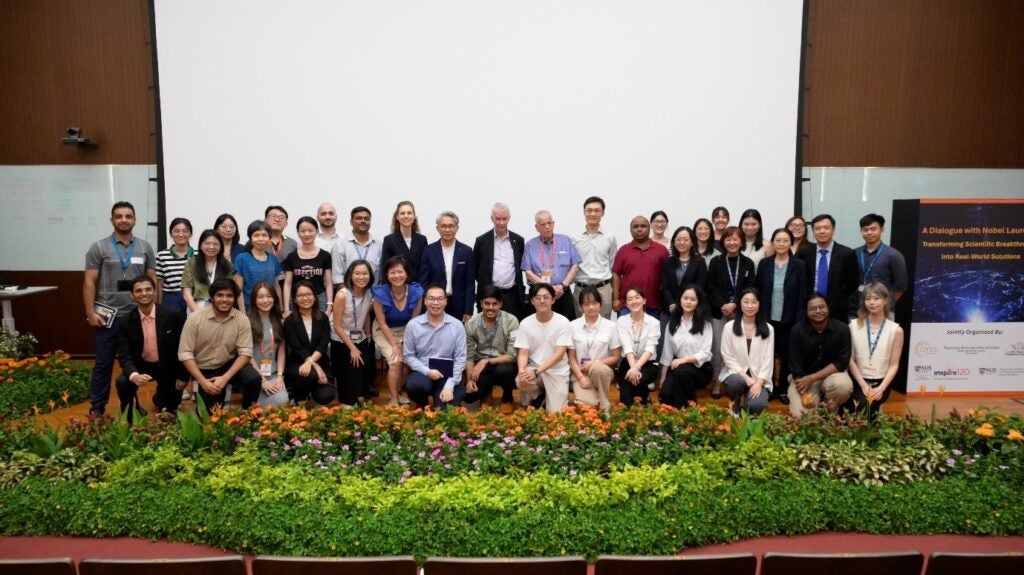
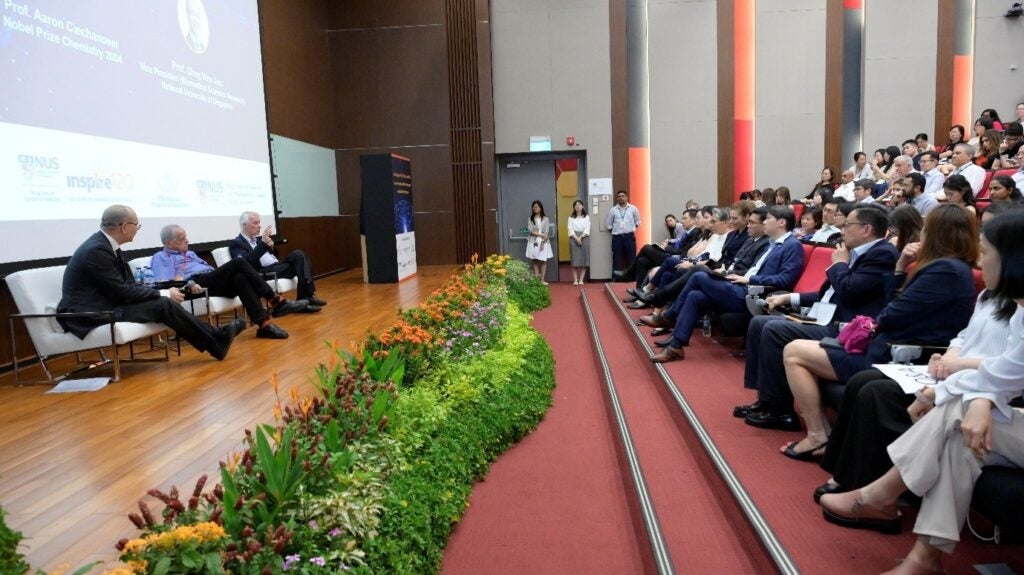
FEBS-IUBMB-ENABLE Conference – 4 to 6 December, 2024
Co-Organized by NUS Medicine, NTU LKC Medicine and A*STAR
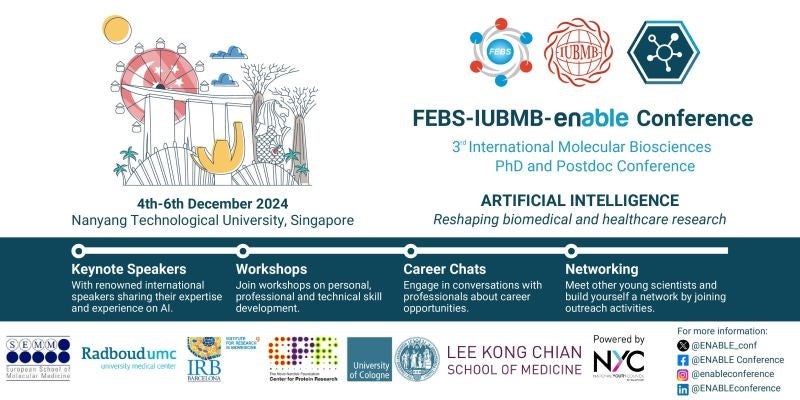
NUSMed Office of Postdoctoral Affairs (OPA) is honoured to be part of the organizing committee of FEBS-IUBMB-ENABLE conference, first time in Asia.
Titled “Artificial Intelligent: Reshaping Biomedical and Healthcare Research”, the conference brought together diverse perspectives on:
🔹 Revolutionizing diagnostics with predictive analytics
🔹 Ethical considerations (especially on equity and equality) in implementing AI-driven solutions
🔹 The evolving role of researchers and healthcare professionals in the AI era especially on data training and also education
A heartfelt thank you to everyone who made this experience so memorable. Here’s to more opportunities for collaboration, learning, and growth!
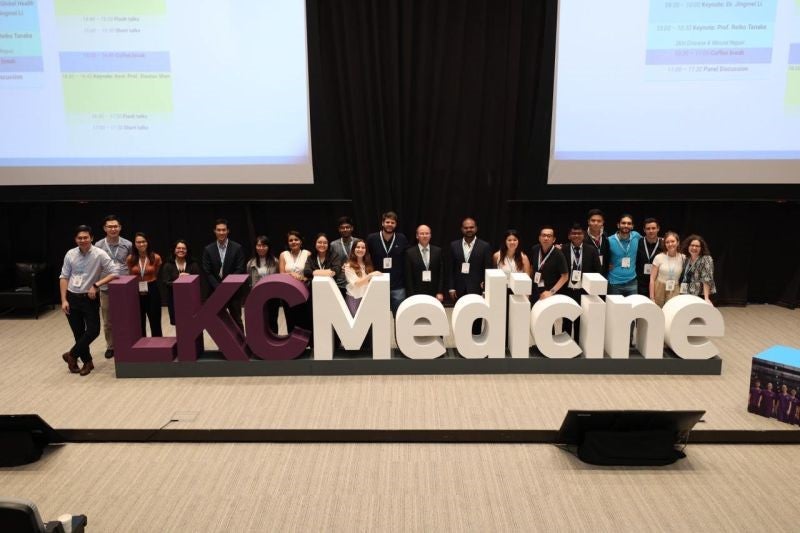
ReINVENT: Leadership Workshop – 21 November, 2024
Organized by NUSMed Office of Postdoctoral Affairs (OPA), presented by Dr Ameek Kaur from NUS Business School
Yesterday, NUS Yong Loo Lin School of Medicine Office of Postdoctoral Affairs (OPA) hosted an insightful leadership workshop (part of ReINVENT) led by Dr. Ameek Kaur. It was an engaging session that explored various aspects of leadership, from understanding different leadership styles to self-assessing our levels of assertiveness and responsiveness.
One of the highlights was the group activity, where we collaborated to evaluate leadership, decision-making, and relationship-building styles in diverse contexts. These discussions emphasized how flexibility and adaptability are key to effective leadership in dynamic environments.
Grateful for the opportunity to learn, reflect, and connect with fellow participants. Here’s to building stronger leadership skills together!
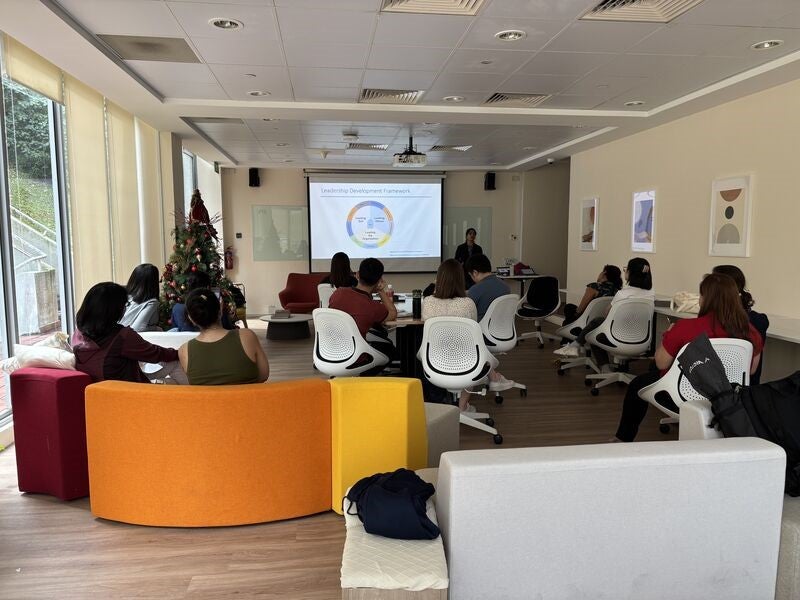
Outreach Activities at Shanghai – 8 November, 2024
Organized by NUSMed Office of Postdoctoral Affairs (OPA)
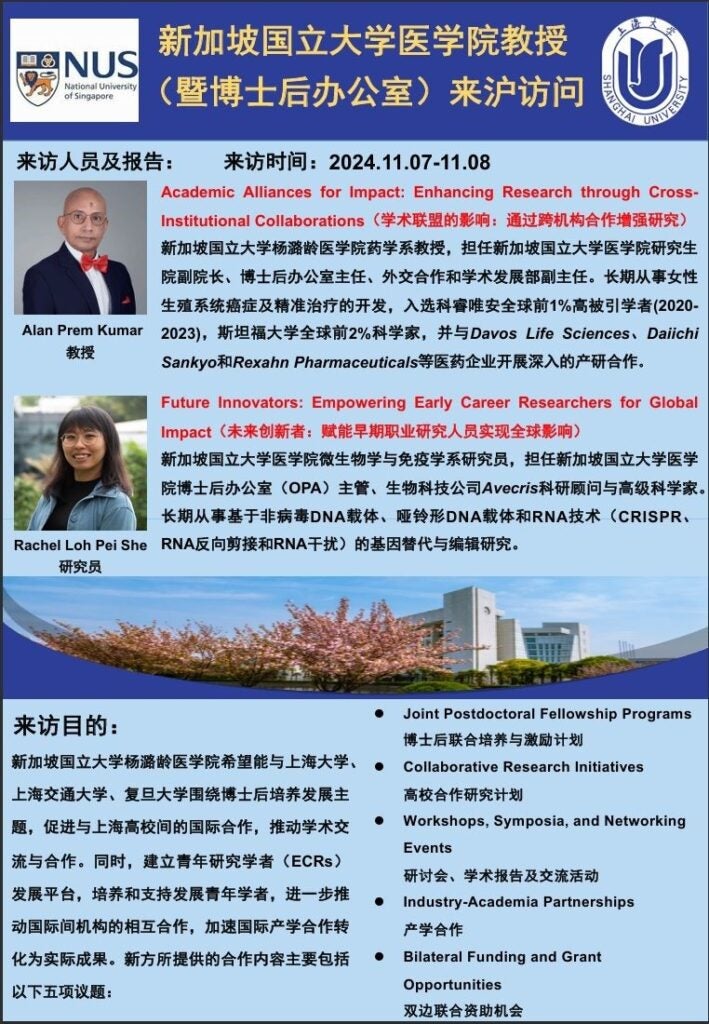
NUS Yong Loo Lin School of Medicine Office of Postdoctoral Affairs (OPA) is honoured to have the opportunities to visit Shanghai University in November. During our visit to Shanghai University, we were joined by esteemed deans from Fudan University and Shanghai Jiaotong University.
This visit was a remarkable opportunity to exchange ideas, discuss new collaborative initiatives, and deepen the ties between our institutions. A heartfelt thank you to our hosts and organizers for their warm hospitality and meticulous planning. We’re excited about the potential synergies ahead as we continue to push the frontiers of research, innovation, and postdoctoral development together.

ReINVENT: Effective Communication Workshop – 25 October, 2024
Organized by NUSMed Office of Postdoctoral Affairs (OPA), presented by Ms. Aileen Lam from NUS Centre for English Language Communication (CELC)
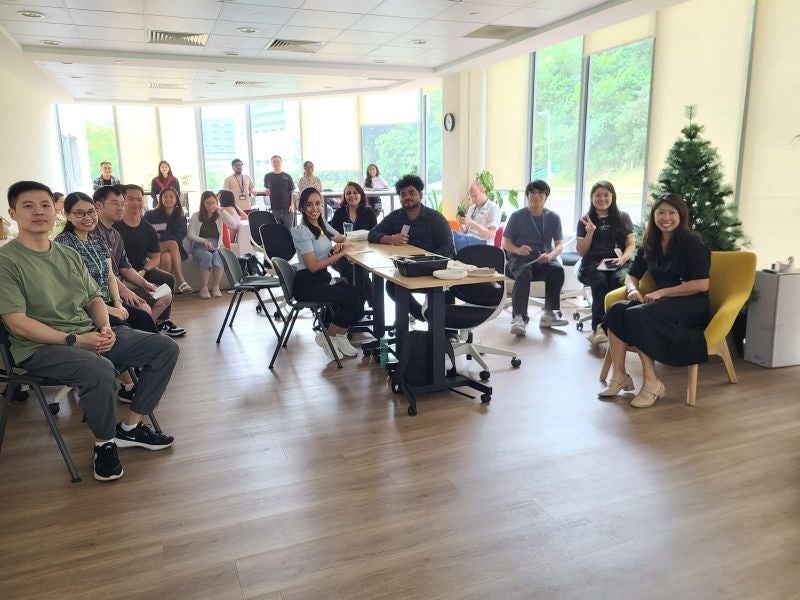
NUS Medicine Office of Postdoctoral Affairs recently wrapped up an engaging communication workshop provided by Ms Aileen Lam as part of our ReINVENT initiative—and it was a blast! Met so many new faces and immersed ourselves in hands-on practice sessions and role-playing activities. It was a reminder that practice truly makes perfect!
Here are a few personal takeaways from this workshop:
1. Always answer the crucial question in your pitching or presentation: "What's in it for me? What's in it for you? And what's in it for us". Tailoring your message to your audience’s needs ensures they see the value right away!
2. Start with a strong hook to capture your audience’s attention—whether it’s a story, a surprising fact, or a powerful quote.
3. Storytelling comes in many forms—discover the style that suits you best and makes your message resonate.
A huge shoutout to everyone who joined and made the workshop lively and interactive! Looking forward to seeing how these new skills will empower our postdoc community to shine even brighter.
NUSMed Postdoc Research Support Grant Launch & 2nd Official Postdoc Gathering – 4 October, 2024
Organized by NUSMed Office of Postdoctoral Affairs (OPA), supported by Merck
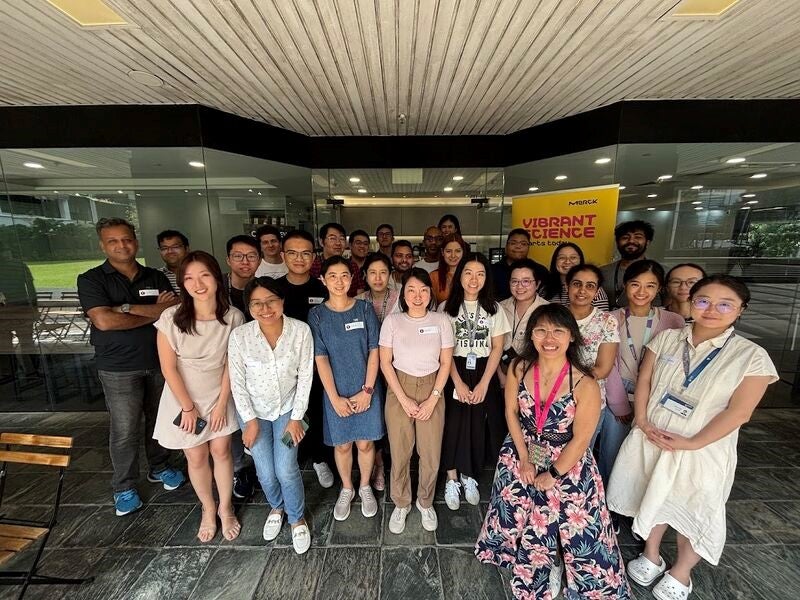
We’re thrilled with the turnout for the Second Official Postdoc Gathering, held in conjunction with the launch of the NUS Medicine Office of Postdoctoral Affairs Research Support Grant for Postdoctoral Researchers.
It was an inspiring event filled with engaging discussions, new connections, and the exchange of ideas. Networking is at the heart of innovation, and we’re grateful to everyone who attended and made the gathering so impactful.
At the same event, The NUSMed Office of Postdoctoral Affairs (OPA) is excited to announce the NUS Medicine Office of Postdoctoral Affairs Research Support Grant for Postdoctoral Researchers.
Thank you to everyone who attended last Friday’s info session – your enthusiasm was incredible! We’re now gearing up to accept submissions by the end of October. This grant will empower postdocs to push the boundaries of innovation, and we can’t wait to see the exciting projects ahead!
Nucleate Singapore’s Anniversary Biomixer – 1 October, 2024
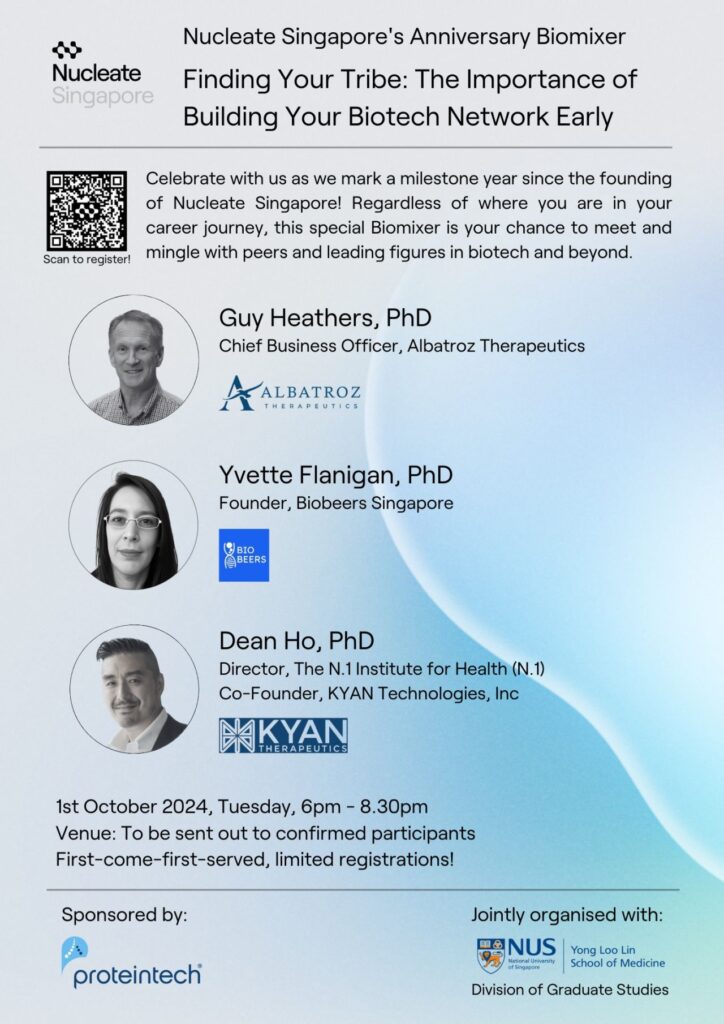
Co-organized by NUSMed Office of Postdoctoral Affairs (OPA)
NUS Yong Loo Lin School of Medicine Office of Postdoctoral Affairs (OPA) was honored to support Nucleate Singapore in celebrating their one-year anniversary. It was a fantastic opportunity to collaborate and contribute to building a thriving biotech community in Singapore!
The journey to scientific innovation is rarely a solo effort. Nucleate Singapore explored the importance of Building Your Biotech Network Early with Prof Dean Ho, Yvette Flanigan and Dr Guy Heathers.
As we discussed the exciting potential in the field, one key takeaway stood out: networking early is crucial. Building a strong community of collaborators and mentors can help turn ideas into reality and pave the way for future breakthroughs.
Kudos to the entire team at Nucleate Singapore for their outstanding work and dedication! Let’s keep the momentum going by connecting with each other, exchanging ideas, and exploring new opportunities! Whether you’re at the beginning of your journey or an established leader, the biotech ecosystem thrives when we come together.
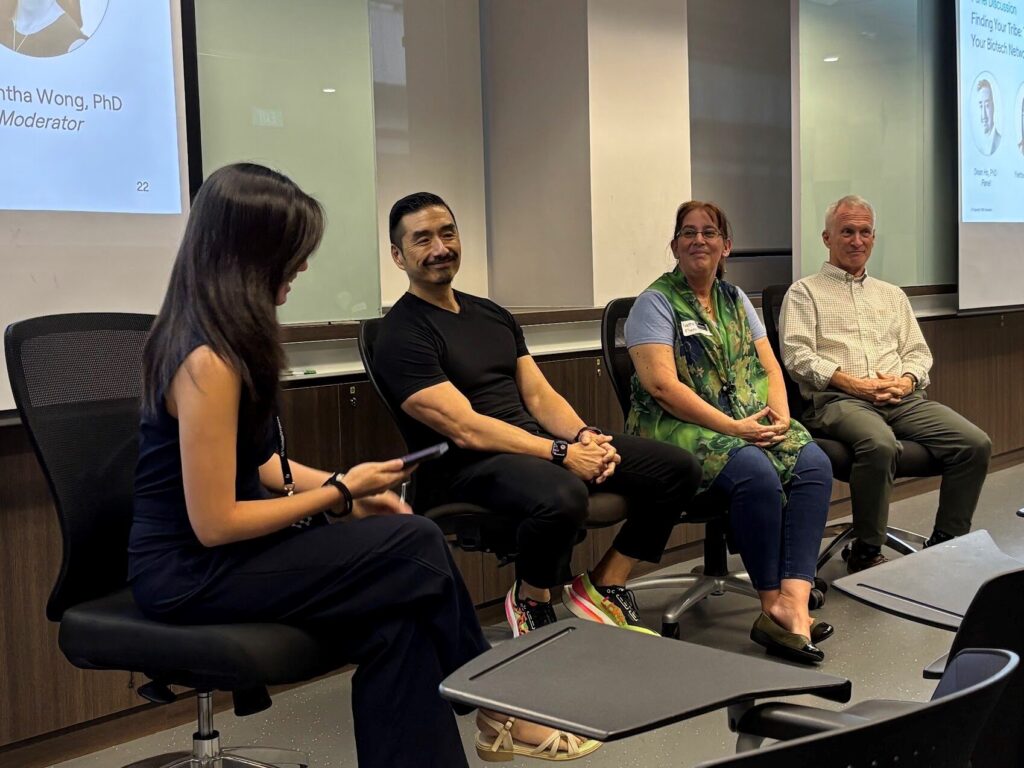
Outreach to University of West Australia (UWA) and Murdoch University – 30 August, 2024
Organized by NUSMed Office of Postdoctoral Affairs (OPA)
NUS Yong Loo Lin School of Medicine Office of Postdoctoral Affairs (OPA) had the opportunity to visit University of West Australia (UWA) and Murdoch University.
This visit aimed to foster collaboration, exchange insights on initiatives that foster postgraduate students and postdoctoral fellows, and explore new opportunities for partnership between our institutions. By engaging in dialogue with UWA and Murdoch University, we continue to strengthen our global network and advance shared goals in advancing postgrad and postdoc personal and professional progression.
Exciting times ahead as we work together to shape the future of biomedical professionals!
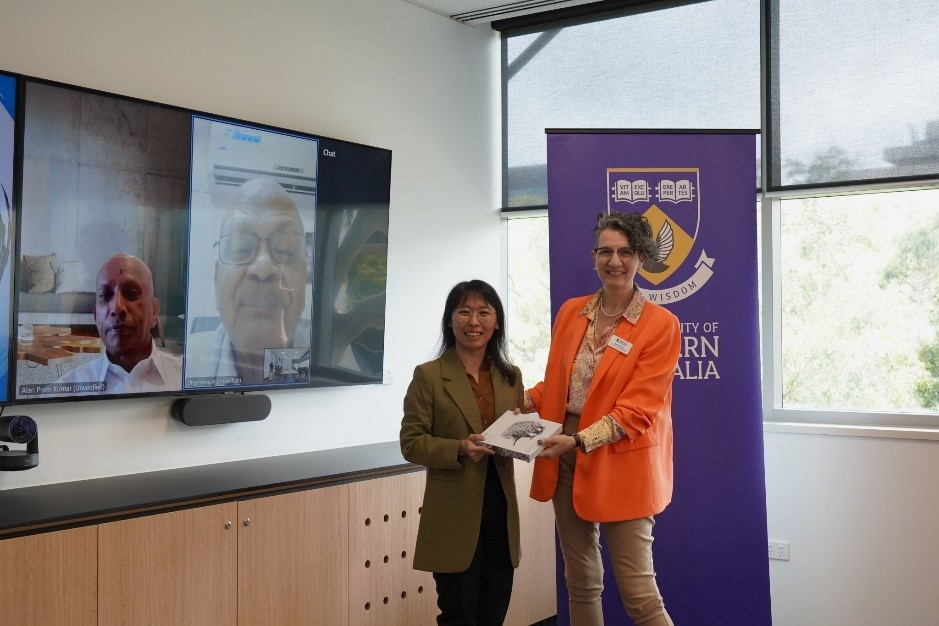
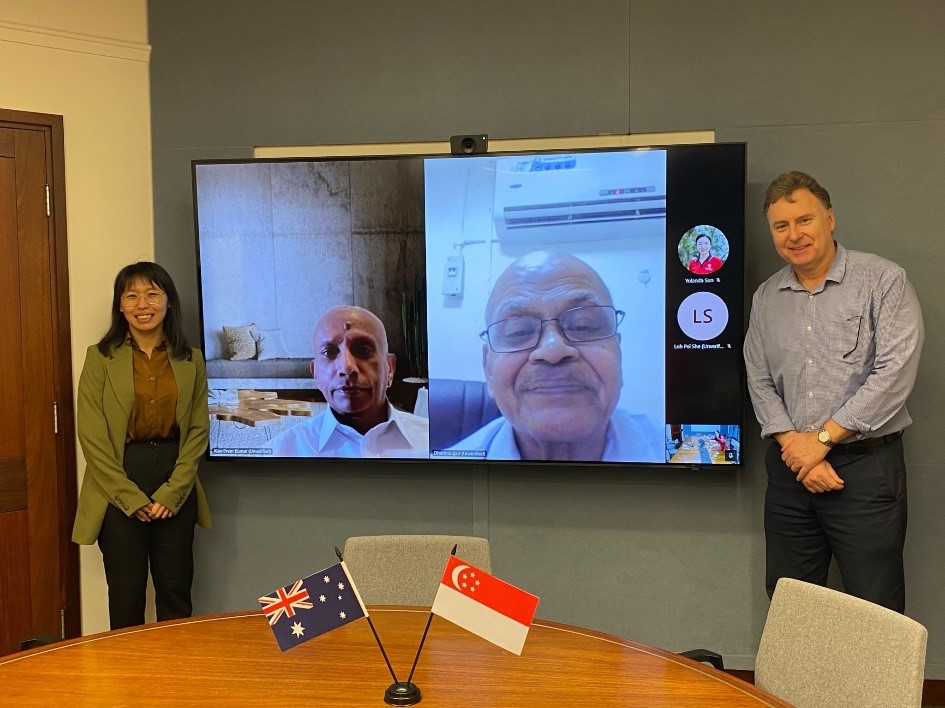
From Postdocs to PI – 30 August, 2024
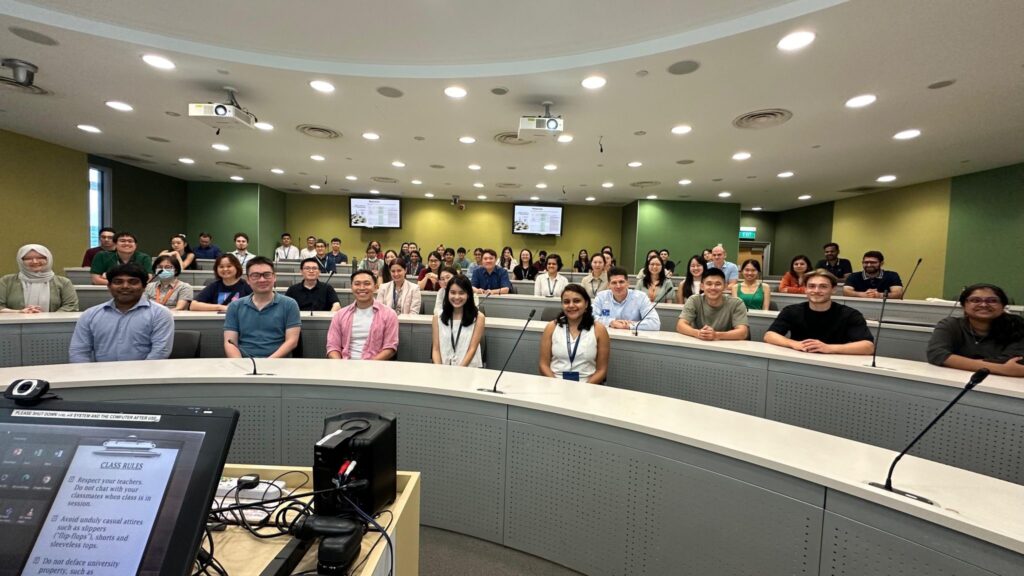
Organized by NUSMed Postdoctoral Association (PDA)
The NUS Yong Loo Lin School of Medicine Office of Postdoctoral Affairs (OPA) and the Postdoctoral Association (PDA) organised an insightful "Postdoc to PI: Tips and Experiences from Recent PIs" seminar, led by Dr Allison Chan and Dr Govinda Lenka. We were honoured to have Dr Anthony Khong and Dr Jun Siong Low as our speakers, who shared their invaluable experiences transitioning from postdoctoral fellows to principal investigators (PIs).
The seminar covered essential topics such as navigating the challenging path to a tenured position, the importance of early preparation, and the various fellowship opportunities available globally. We are thrilled by the overwhelming turnout.
Key takeaways included:
1️) The need to publish quality papers
Publishing high-quality research papers is crucial in establishing credibility within the academic community.
2️) Applying for as many opportunities as possible
The PIs also emphasised on the importance of resilience and persistence, as securing a PI position is a highly competitive process that often requires numerous applications and interviews.
3️) The mindset shift required when stepping into a PI role
Aspiring PIs must be prepared for the increased responsibilities and leadership challenges that come with the role.
A special shoutout to our speakers for their candid sharing. The session was filled with practical advice and real-world experiences, making it a must-attend for anyone aspiring to move from postdoc to PI. We look forward to having you again next time!
Patent Your Ideas: From Concept to Protection – 20 August, 2024
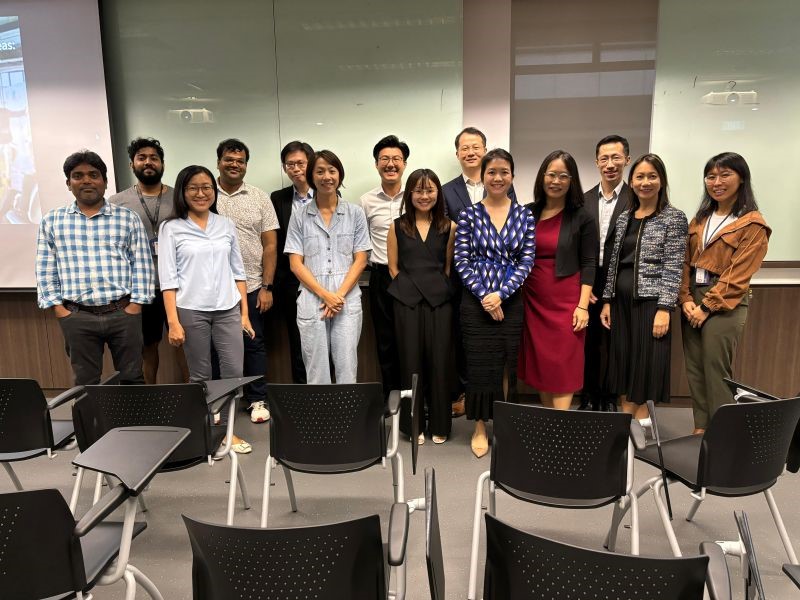
Organized by NUSMed Office of Postdoctoral Affairs (OPA) and Postdoctoral Association (PDA)
As part of the Industry Track Programme by NUS Yong Loo Lin School of Medicine Office of Postdoctoral Affairs (OPA) and Postdoctoral Association (PDA), we had an enlightening and educational session on "Patent Your Ideas: From Concept to Protection," in collaboration with NUS Technology Transfer and Innovation (TTI).
Moderated by Debashis Majee (NUSMed PDA) and Pei Lin LOW (A&G), the expert team from Allen & Gledhill LLP Asia, including Dr. Tou Zhi Qiang, Dr. Bolin Chen, Lucille Ong, and Jia Yi Toh, provided an in-depth look at the patenting process, particularly in the medical and software sectors, offering crucial insights for protecting intellectual property.
If you missed the session, fret not, here are some key takeaways:
1) Patentability Requirements: We explored the importance of novelty, inventive steps, and industrial application in securing a patent, with a focus on the unique challenges faced in the medical and software fields.
2️) Non-Patentable Subject Matter: The session clarified what cannot be patented, such as scientific theories and mathematical methods, guiding innovators to focus on protectable elements of their inventions.
3️) Software and AI Patents: The complexities of patenting software and AI were discussed, including practical examples to help differentiate between patentable inventions and non-patentable methods.
4️) Strategic Claim Drafting: The importance of drafting patent claims to maximize licensing value was emphasized, with strategies to cover various forms of inventions for broader protection.
5️) Patent Enforcement in Singapore: We have a quick overview of enforcement options, including litigation, arbitration, and the Simplified Process for Certain IP Claims, provided insights into achieving quicker and more cost-effective IP dispute resolutions.
This collaborative session was highly informative, equipping attendees with the knowledge needed to navigate patent law complexities and effectively protect their innovations. A big thank you to our speakers and collaborators for their valuable insights!
DDOP x NUSMed OPA Networking Event – 14 August, 2024
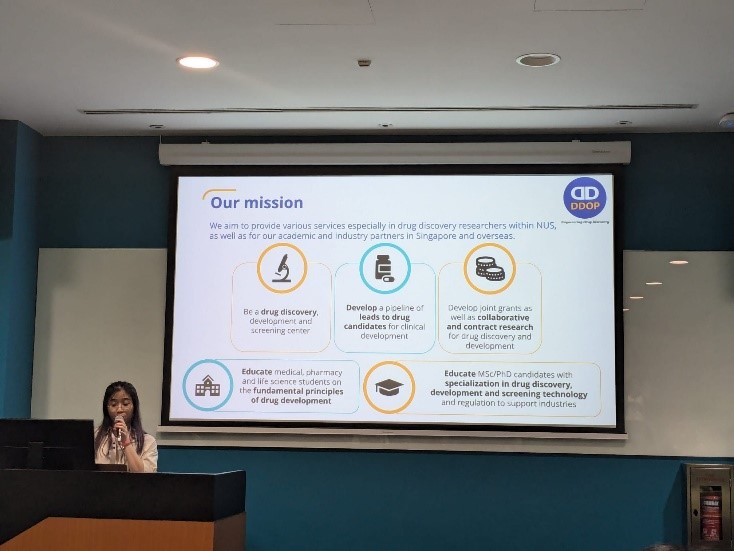

Organized by NUSMed Office of Postdoctoral Affairs (OPA) and Drug Discovery and Optimization Platform (DDOP)
NUS Yong Loo Lin School of Medicine Office of Postdoctoral Affairs (OPA) and Postdoctoral Association (PDA) are excited to recap our recent networking event in collaboration with NUS Yong Loo Lin School of Medicine’s Drug Discovery and Optimization Platform (DDOP), sponsored by Merck Life Science.
This event was organized as part of the Milliplex® Assays Discovery and Education Partnership Seminar Series, a partnership between Merck and DDOP. Together, we brought together researchers and professionals to discuss the latest advancements in drug discovery and foster valuable connections within the scientific community.
We’re thrilled to see more collaborative initiatives like this at NUS! More information about DDOP can be found at https://lnkd.in/gsU7gnWY.
Integration of Digital Technology in Building a Sustainable Learning Community – 14 August, 2024
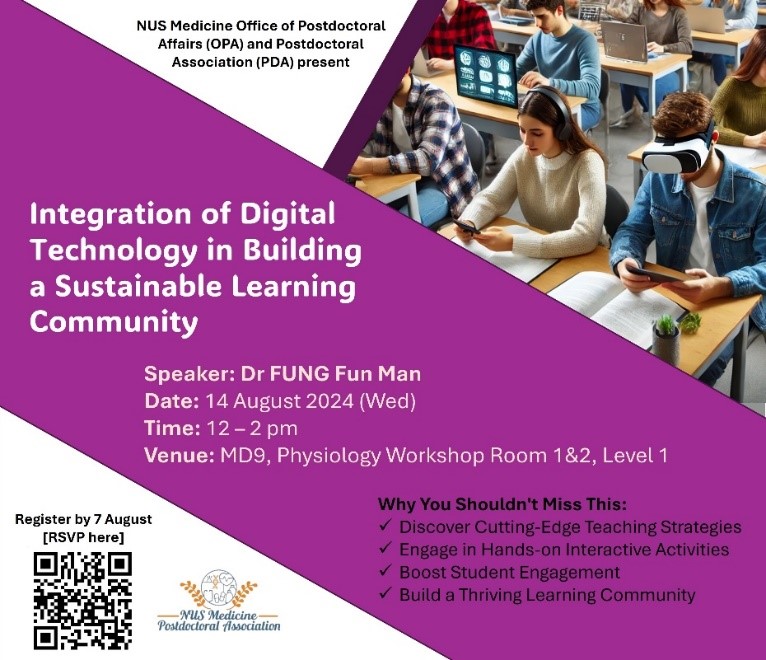
Organized by NUSMed Office of Postdoctoral Affairs (OPA) and Postdoctoral Association (PDA)
Facilitated by Dr Fung Fun Man, Chemistry Department, NUS
The event marked a significant milestone in our collaborative efforts between NUSMed OPA and PDA, where we officially launched the 'Education Enhancement Initiatives.' These initiatives are specially tailored to support educators transitioning from research to teaching, as well as those looking to further refine their skills. The session was the first in a series of workshops designed to explore how digital tools and social media can create dynamic and lasting active learning environments, especially in STEM.
Led by Dr Fung, this hands-on, interactive workshop offered a comprehensive overview of various digital platforms and social media tools that foster sustainable and inclusive learning communities. Participants learned about innovative technologies, such as augmented reality, and gained practical insights into selecting the right platforms to enhance active learning. The engagement level was remarkable, with participants expressing high satisfaction with the facilitator, the relevance of the materials, and the overall content.
The meaningfulness of the event lay in its real-world applicability—providing educators with actionable tools and strategies that can directly enhance their teaching approaches. It was not just a theoretical exploration but a transformative experience that equipped participants with the skills to shape the future of learning.
Feedback:
“The topic was so relevant, and the speaker provided his own experience”
“Interactive”
"Demo on how to use different technologies"
"More and longer workshops with the same speaker"
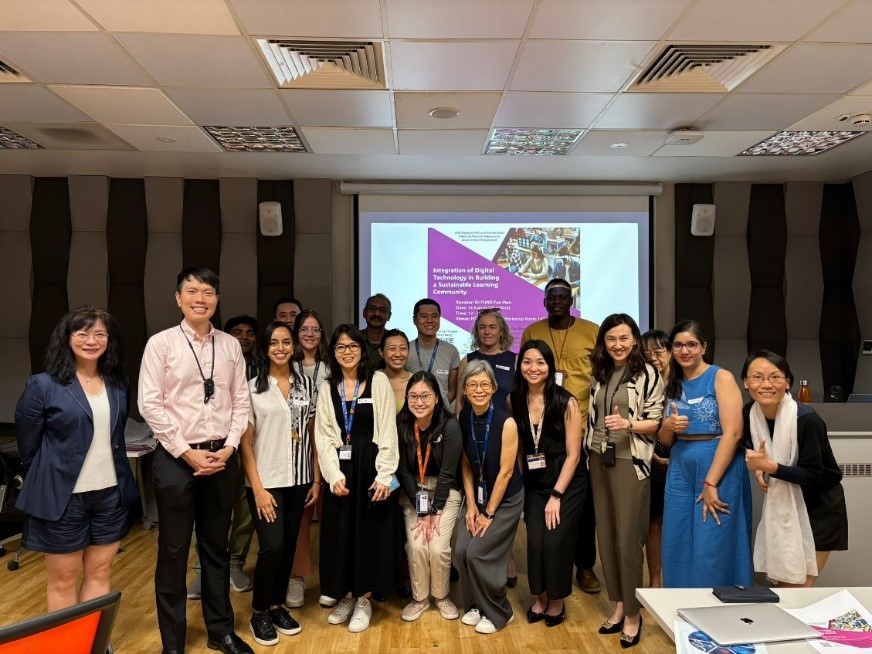
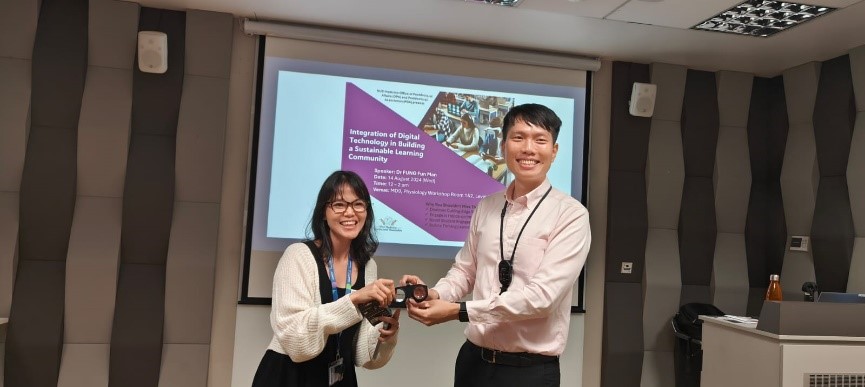
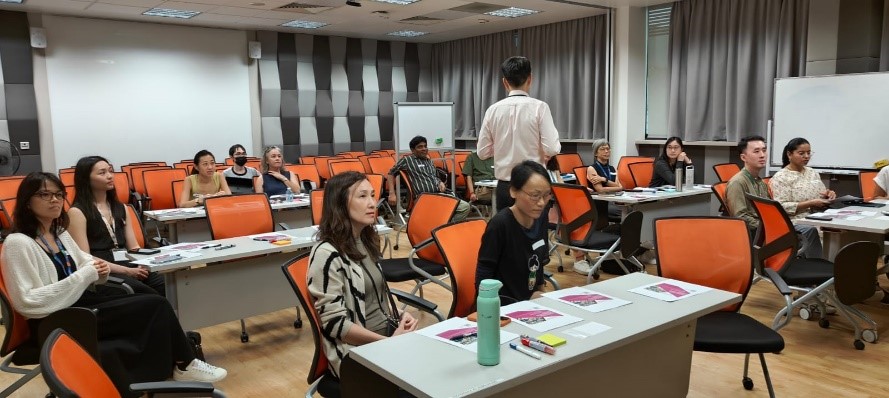
2023-24 Events
First Edition of Official Postdoc Gathering – 31 July, 2024
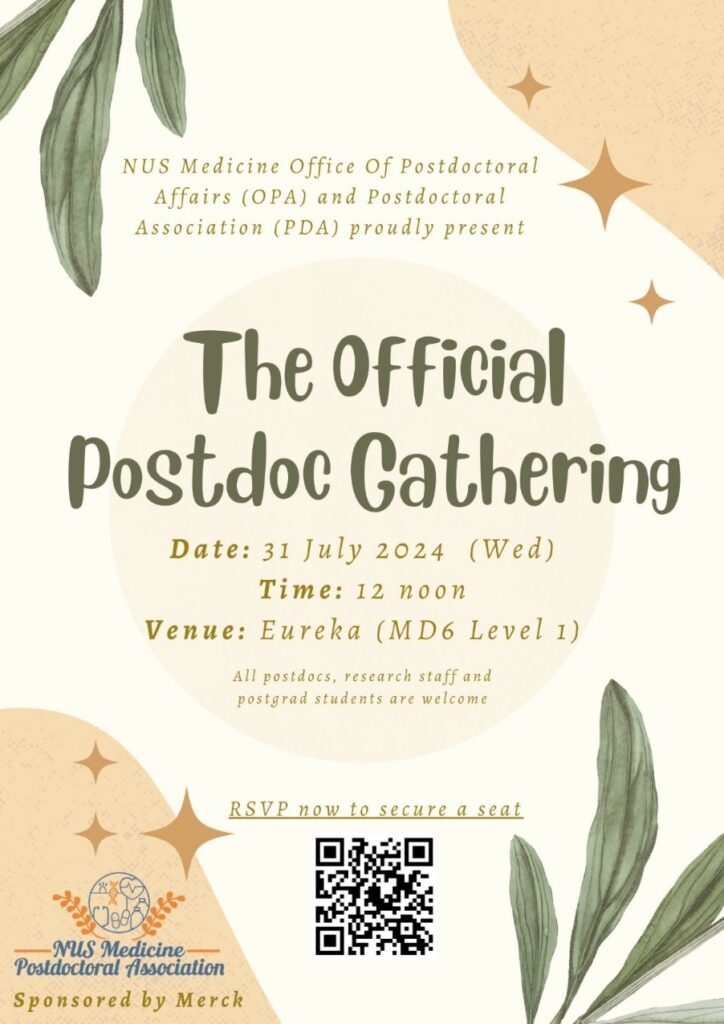
Organized by NUSMed Office of Postdoctoral Affairs (OPA) and Postdoctoral Association (PDA), sponsored by Merck
We are delighted to share the success of the first edition of the Official Postdoc Gathering organized by the NUS Yong Loo Lin School of Medicine Office of Postdoctoral Affairs (OPA) and the Postdoctoral Association (PDA), proudly sponsored by Merck.
The event was a fantastic opportunity for postdoctoral fellows to network, share their research experiences, and build a stronger community within NUS. We were honored to have the support of Merck, which made this gathering possible.
Thank you to everyone who attended and contributed to the vibrant discussions.
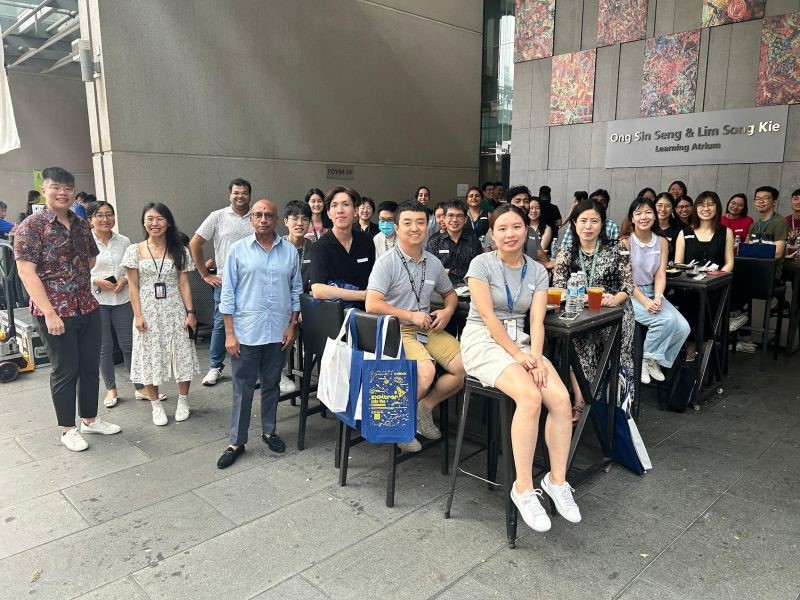
Outreach Event at Sunway University ECRN-PG Symposium – 5 July, 2024
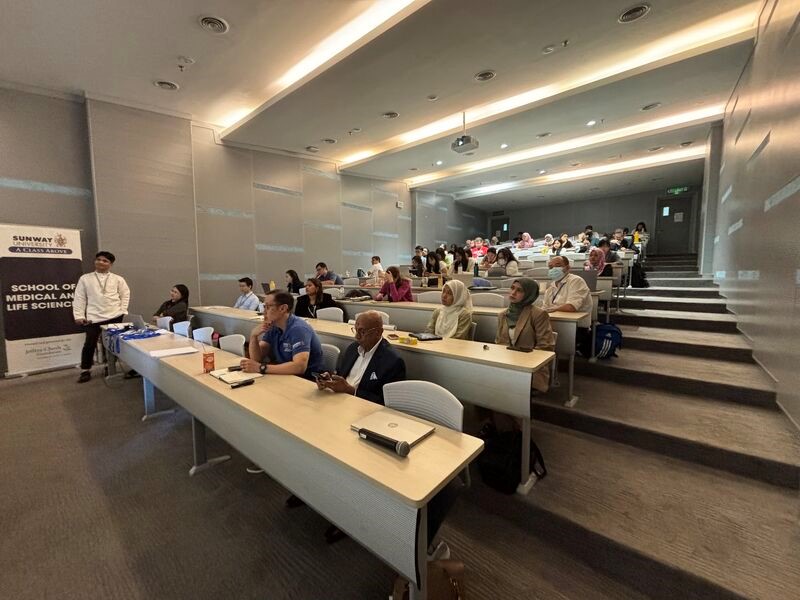
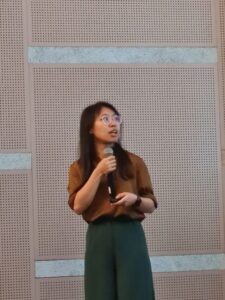
Organized by Sunway University
Dr Rachel Loh had the privilege of representing NUS Yong Loo Lin School of Medicine Office of Postdoctoral Affairs (OPA) and Postdoctoral Association (PDA) to give an invited talk at Sunway University, where she shared insights into the initiative and framework developed by NUSMed OPA and PDA for early career scientists.
A quick key points on our framework included:
- Structured mentorship and coaching programs to guide postdoctoral fellows.
- Workshops and seminars on career development and skills enhancement (such as communication, grant writing etc).
- Networking events and unofficial gathering to connect postdoctoral fellows.
- Funding opportunities partnering with industry.
It was inspiring to engage with the brilliant minds at Sunway University and discuss how we can collectively contribute to the enhancement of professional and personal growth of early career researchers.
Outreach Event at Sunway University ECRN Seminar Series – 3 May, 2024
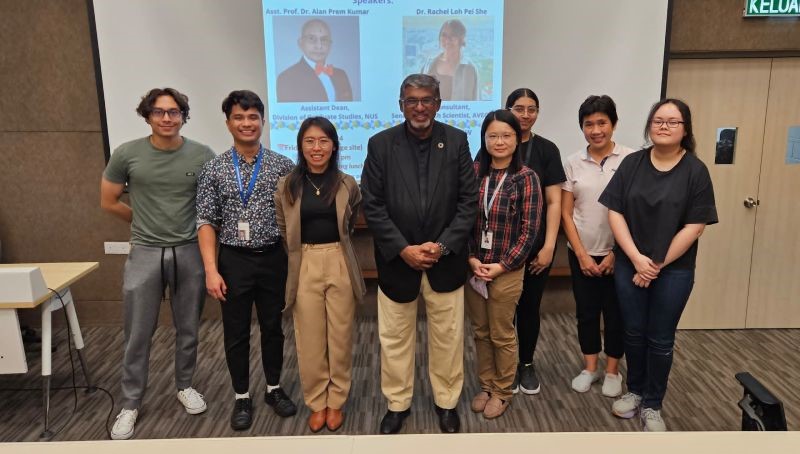
Organized by Sunway University
Dr Alan Prem Kumar and Dr Rachel Loh from the NUS Yong Loo Lin School of Medicine Office of Postdoctoral Affairs (NUSMed OPA) are thrilled to share about our recent work from OPA and Postdoctoral Association (PDA) at Sunway University recently!
A heartfelt thank you to all who attended and participated in our session. It was a remarkable opportunity to connect with emerging postgraduate students and delve into transitioning from academia to industry, as well as exploring ways to bridge the gap between these two vital worlds.
We are eager to engage with more universities across the APAC region, and we extend our sincere gratitude to Sunway for this wonderful opportunity.
Outreach Event at TAR UMT, Kuala Lumpur, Malaysia – 2 May, 2024
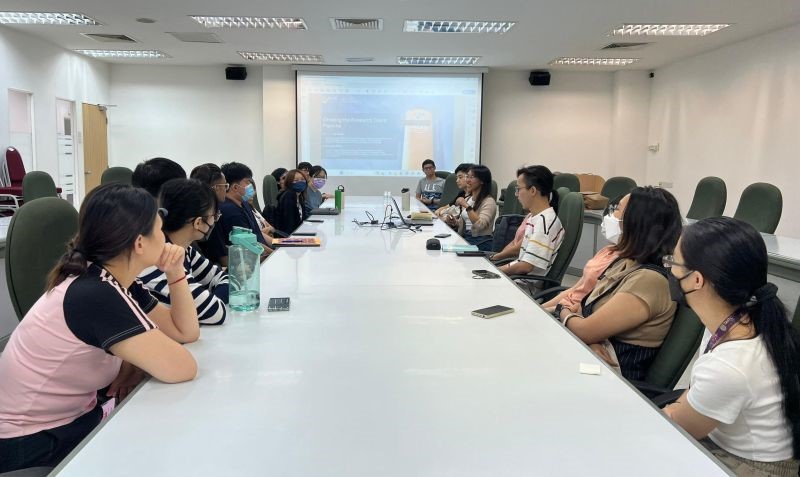
Organized by NUSMed Office of Postdoctoral Affairs (OPA) and TAR UMT, KL
Dr Alan Prem Kumar and Dr Rachel Loh were delighted to represent NUS Medicine Office of Postdoctoral Affairs (OPA) to share about our initiatives at OPA to postgraduate students at TAR UMT hosted by Dr Tan Hui Yin and Dr Ler Hui Yin.
To postgraduate students:
As you navigate through your academic journey, don't overlook the power of networking. It's not just about grades and research papers; it's about building connections that can open doors to exciting opportunities in your field. From collaborations to job prospects, networking is your key to unlocking a world of possibilities. We hope that our sharing session helps to ignite passions in you to network!
Start building those relationships now and watch how they enrich your postgrad experience and beyond!
Formation of Postdoctoral Association 24/25 – 19 Apr, 2024
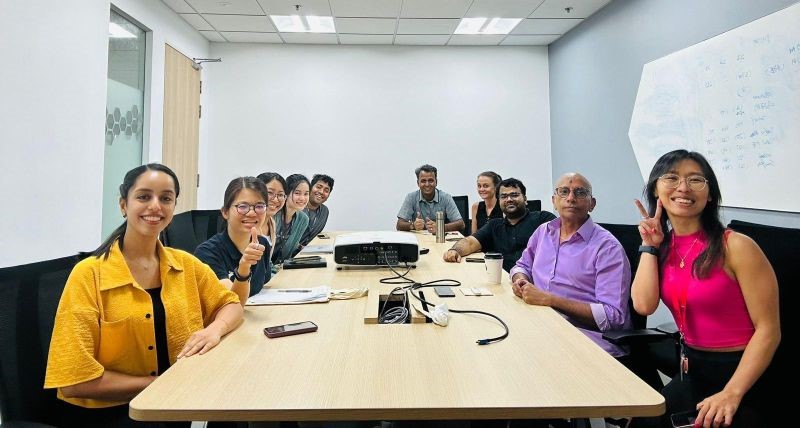
Organized by NUSMed Office of Postdoctoral Affairs (OPA)
We are happy to announce that this year PDA will be lead by Bibek Dutta and co-led by Grishma Rane.
And we welcome the members from the exco and subco:
President - Dr Bibek Dutta
Vice President - Dr Grishma Rane
Secretary - Dr Allison Chan
Treasurer - Dr Shuo Deng
Academia & Teaching - Ms Noof Abdullah Saad Shaif, Dr Govinda lenka and Dr Allison Chan
Industry - Dr Debashis Majee, Dr Deng Shuo and Dr Bibek Dutta
Marketing & Wellbeing - Dr Grishma Rane
Dr Alan Prem Kumar and the NUSMed OPA team eagerly anticipates a year filled with stimulating and enriching events alongside NUSMed PDA. Here's to embarking on fresh beginnings and embracing the extraordinary voyage that lies ahead!
Fireside Chat with Prof. Harvey Lodish: Starting and Building a Biotechnology Company – a Team Sport – 26 Mar, 2024
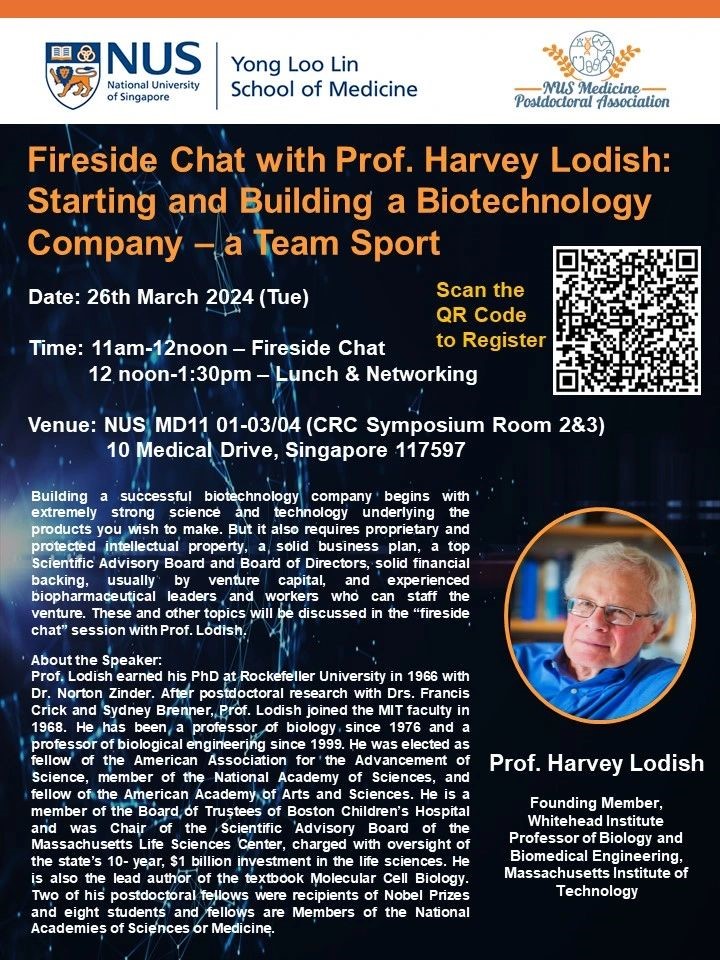
Organized by NUS Medicine Office of Postdoctoral Affairs (OPA)
Speaker: Prof Harvey Lodish
The NUS Medicine Office of Postdoctoral Affairs (OPA) was thrilled to host Prof. Harvey Lodish yesterday for an engaging session on his remarkable journey in launching and developing a biotech company.
Harvey's passion for supporting young scientists ignited a spark of inspiration in us all. And here's some takeaways from this inspiring fireside chat.
1. Innovation with Purpose
In the quest for innovation, it’s critical to zero in on unmet needs. While patents are crucial, they should only serve as valuable tools that enhance the worth and competitive edge of your company. Instead, forge solutions that tackle real-world challenges head-on. By focusing on purpose-driven innovation rather than technology searching for a problem, we pave the way for meaningful change.
2. Building a Diverse Team
Launching a startup? The secret sauce is a diverse team! It's not just about gathering experts from various fields like finance, science, or HR but also about including seasoned veterans in your squad. This rich mix is the cornerstone of a successful venture.
3. Embracing Teamwork
The entrepreneur journey is all about collaboration. The magic happens when diverse minds and hearts come together towards a common goal.
4. A Balanced Life
Harvey also shared his personal regimen for success – 8 hours of sleep and a 2km walk daily. A powerful reminder of the importance of self-care in sustaining our passion and productivity. If he can have 8hr of sleep, why can't we?
Harvey illuminated a profound truth – biotech entrepreneurship is uniquely rewarding. Unlike academia or textbook writing, it offers a direct pathway to impact patients' lives and contribute to curing diseases. Conversation with Harvey reinforced the belief that with the right team, a clear purpose, and a balanced lifestyle, we can achieve extraordinary things.
We hope that this conversation was not just enlightening but also deeply motivating. Here's to innovating for a better tomorrow!
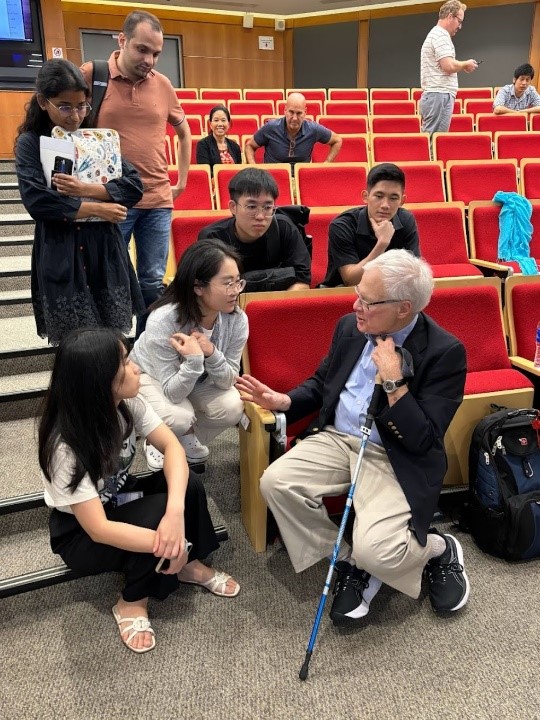

Grant Writing Workshop with Dr Howard C. Bauchner – 12 Mar, 2024
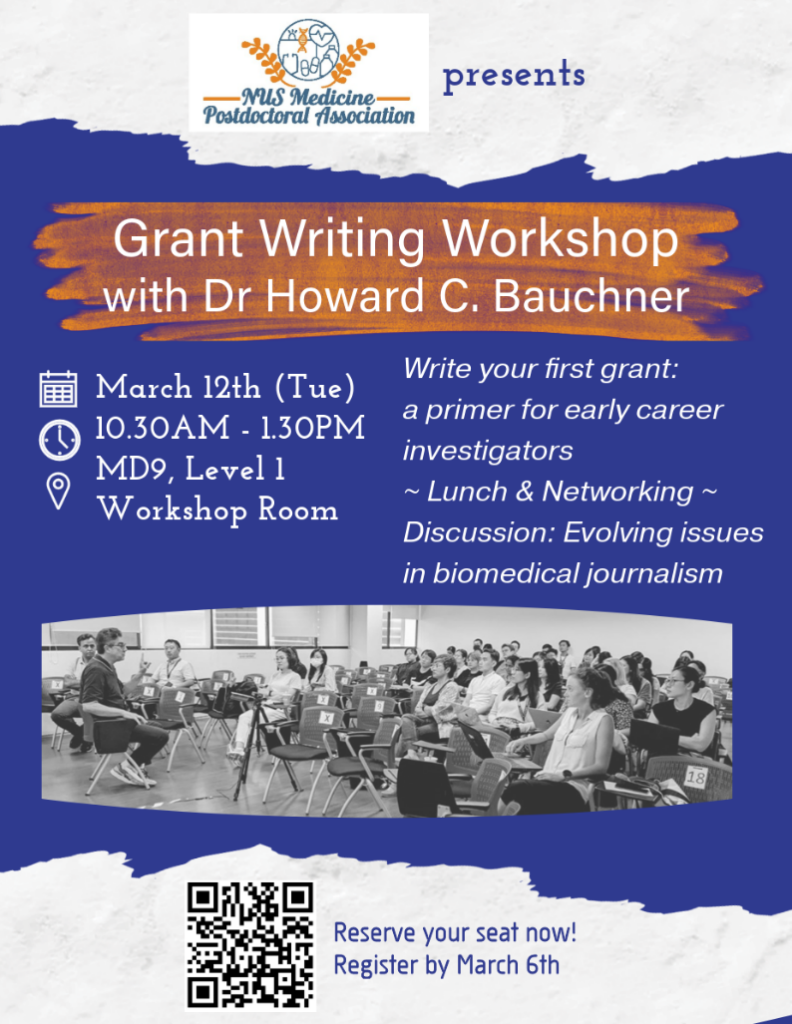
Organized by Office of Postdoctoral Affairs (OPA)
Speaker: Dr Howard C. Bauchner
Writing your first grant can feel like navigating uncharted waters. In this workshop hosted by NUS Medicine Office of Postdoctoral Affairs (OPA), we are honoured to have Prof Howard who shared his invaluable experiences from his tenure as the former Editor-in-Chief of the Journal of the American Medical Association.
Some key take home messages
1 - Begin ahead of time and strategize wisely: Establish a realistic roadmap and budget. This proactive approach ensures a well-thought-out plan, enabling you to navigate the complexities of grant writing with confidence and clarity.
2 - Absorb wisdom from the experts: Analysing successful grant applications provides invaluable insights into the elements that distinguish winning proposals.
3 - Weave a compelling narrative: The concluding section of your proposal should vividly outline the future trajectory of your research and its potential to revolutionise the field. Paint a picture of how your project will contribute to advancing knowledge, setting the stage for a transformative impact.
4 - Ensure clarity and precision: A meticulously proofread grant proposal not only reflects your attention to detail but also upholds your credibility as a researcher. Spelling and grammatical errors can undermine the perceived competence of your work, so prioritise readability to maintain a professional and trustworthy presentation.

Outreach Event at iPHARMA-THON event at Kuala Lumpur, Malaysia – 2 Mar, 2024
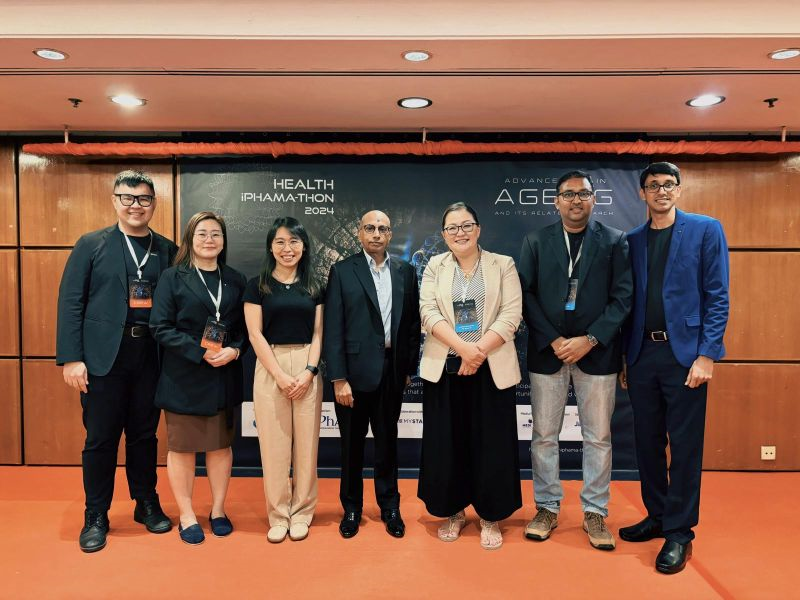
Organized by Digital A Plus Healthcare
Speakers: Dr Alan Prem Kumar and Dr Rachel Loh
Dr Alan Prem Kumar and Dr Rachel Loh are profoundly honored to have had the opportunity to share our effort at NUSMed OPA over the years at HEALTH iPHARMA-THON organized by Digital A Plus Healthcare Sdn. Bhd.
We are deeply thankful for the enriching exchanges of ideas with esteemed representatives from Sunway University and TAR UTM. These interactions have not only broadened our perspectives but have also forged valuable connections that inspire our ongoing work.
NUSMed OPA looks forward to continuing these meaningful collaborations and will continue our mission to empower postdoctoral fellows by providing them with the essential knowledge and skills needed to become leaders of the future, ready to innovate and lead in both academia and industry.
Annual General Meeting of NUS Medicine Postdoctoral Association (PDA) – 1 Mar, 2024

Organized by NUS Medicine Postdoctoral Association (PDA)
As we wrap up our annual NUSMed Postdoctoral Association (PDA) Annual General Meeting, we (PDA23/24 exco) are filled with gratitude and enthusiasm for what lies ahead. Exciting Times Ahead with support from NUSMed Office of Postdoctoral Affairs (OPA), we look forward to embarking on ambitious projects with the upcoming PDA exco. Stay tuned for exciting updates and opportunities to engage!
Medicine Meets Entrepreneurship: Bring Your Impact From Bench To Bedside – 20 Feb, 2024
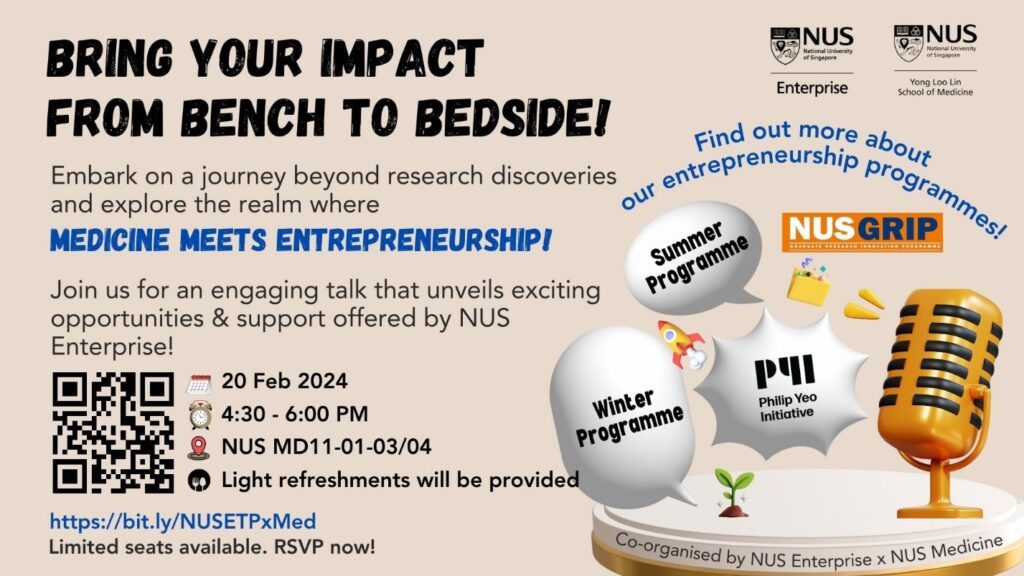
Organized by Office of Postdoctoral Affairs and NUS Enterprise
Speakers:
1. Claire Cheong, Associate Director, NUS Enterprise Academy
2. Debashish Pal, Venture Architect, Associate Director, Graduate Research Innovation Program (GRIP), NUS
The session was conducted by NUS Enterprise, Phillip Yeo Initiative and NUS Graduate Research Innovation Programme (GRIP). This informative session offered NUSMed postdocs and postgraduate students a clear overview of the different exciting opportunities and support provided by NUS Enterprise. The representatives kindly shared insights into the array of internship and entrepreneurship programs available to undergraduate, graduate students, and postdoctoral fellows.
For more information on the different programmes, please visit:
NUS Enterprise Summer Internship Programme
NUS Enterprise Winter Internship Programme
Philip Yeo Initiative Fellow Programme and Grants
NUS GRIP
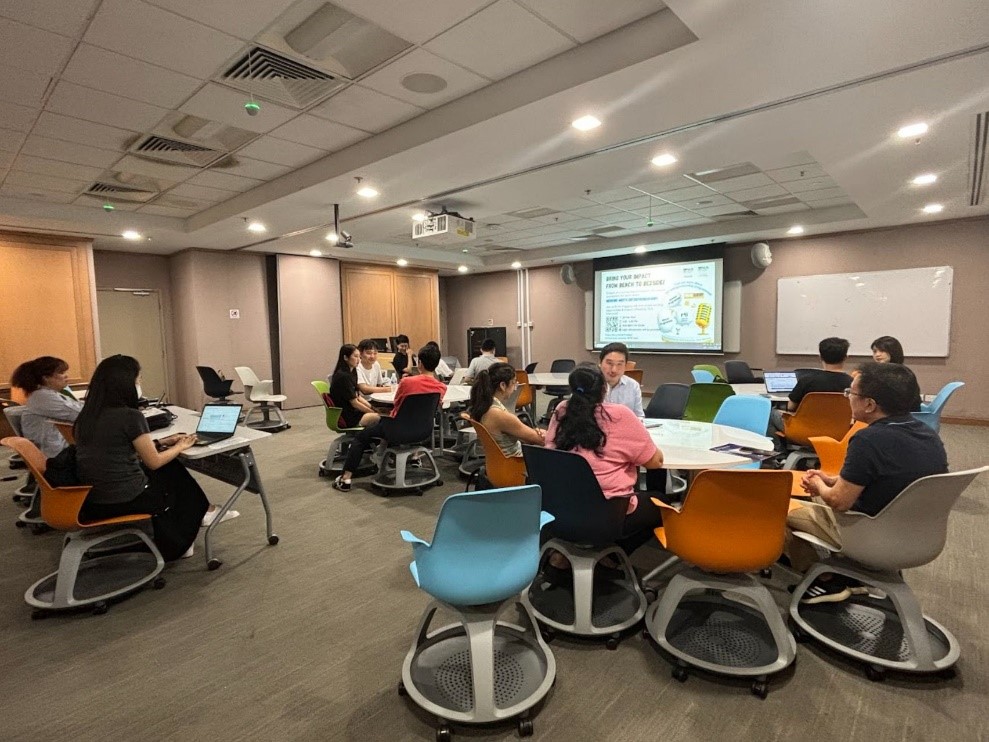
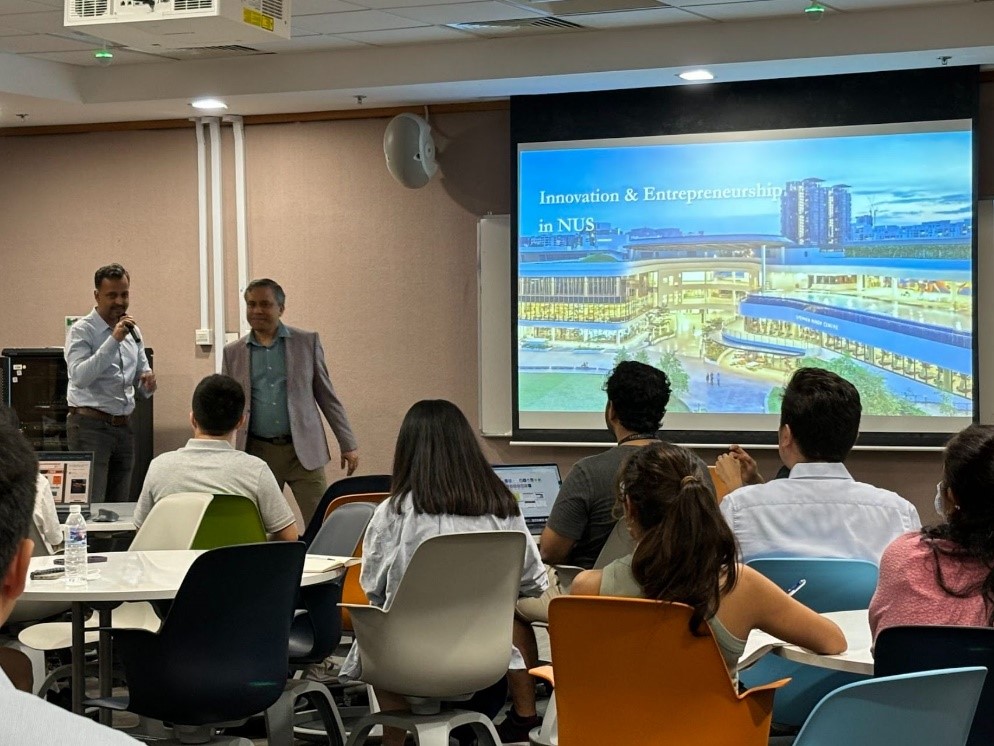
Fireside Chat: How Postgrads and Postdocs Can Benefit from The NUS Medicine Coaching Programme – Feb 2, 2024
Organised by Office of Postdoctoral Affairs
Speakers : A/Prof Marie-Veronique Clement and Prof Kesavan Esuvaranathan
The session was conducted by A/Prof Marie-Veronique Clement and Prof Kesavan Esuvaranathan. This interactive session offered NUSMed postdocs and postgraduate students a valuable chance to experience a trial of the coaching programme under the guidance of certified coaches.
Take-home messages on some of the benefits of coaching:
1. Clarity and Goal Setting: Coaches help individuals clarify their goals and priorities. Through structured conversations and exercises, they assist in defining what you want to achieve.
2. Accountability: Coaches hold you accountable for your actions and commitments. Knowing that you have someone to report to can boost your motivation and help you stay on track.
3. Self-Awareness: Coaches serve as mirror and encourage self-reflection and self-awareness. It helps you understand your strengths, weaknesses, values, and beliefs, which is crucial for personal growth.
Coaching is a personalised journey tailored to your unique needs and objectives. If you missed the firechat session but you are interested in participating in the coaching programme, do sign up at https://forms.office.com/r/PHr0hY3DxC?origin=lprLink.
Feedbacks:
“Great session. I hope that everyone would benefit from this. I’ve been trying to coach my students and staff but I feel that I need guidance as well.”
“Very insightful, thanks for the session!”
“Hope that have more people getting benefited from the program.”
“Thank you so much for giving us this opportunity to be in this wonderful program.”
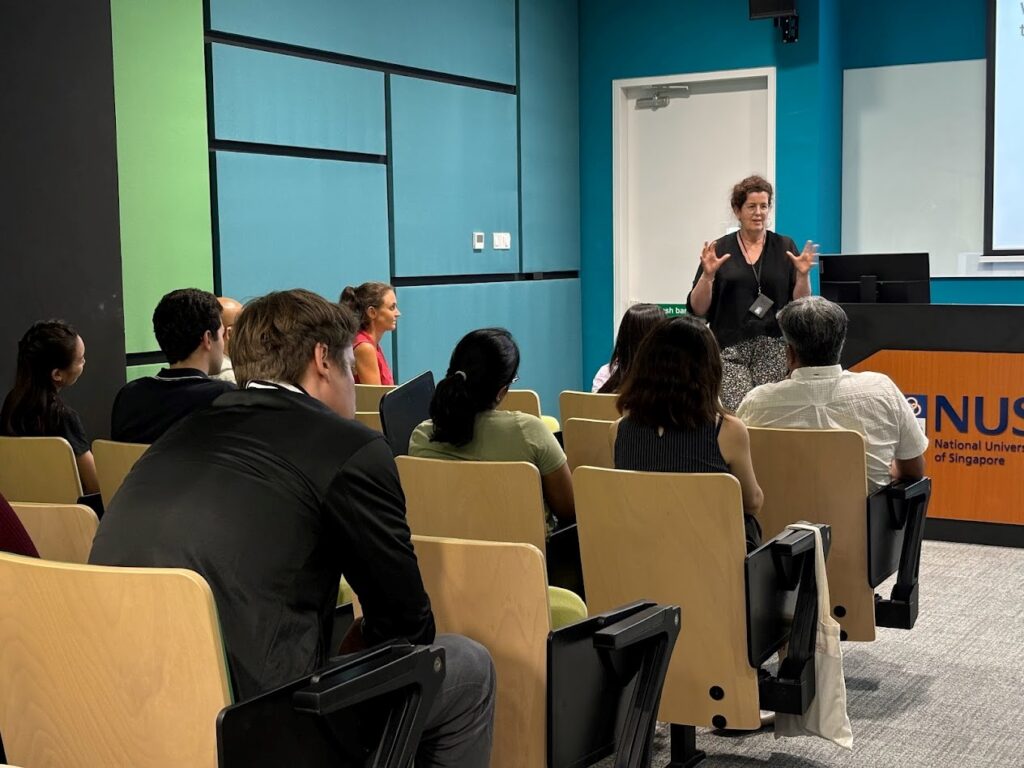
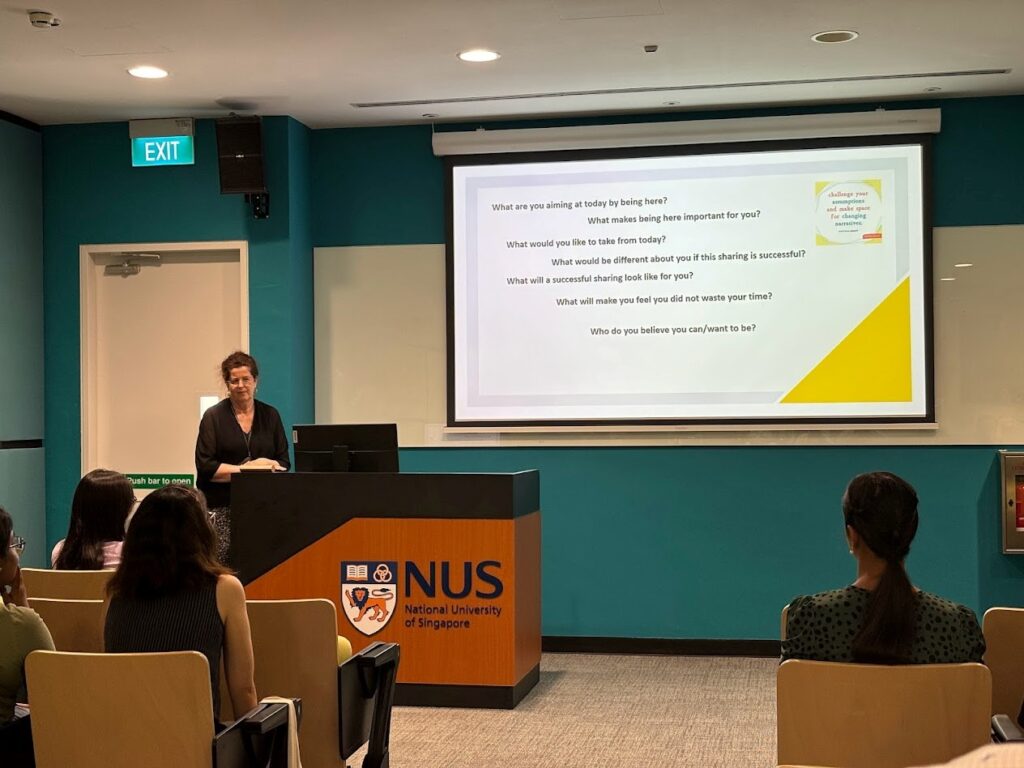
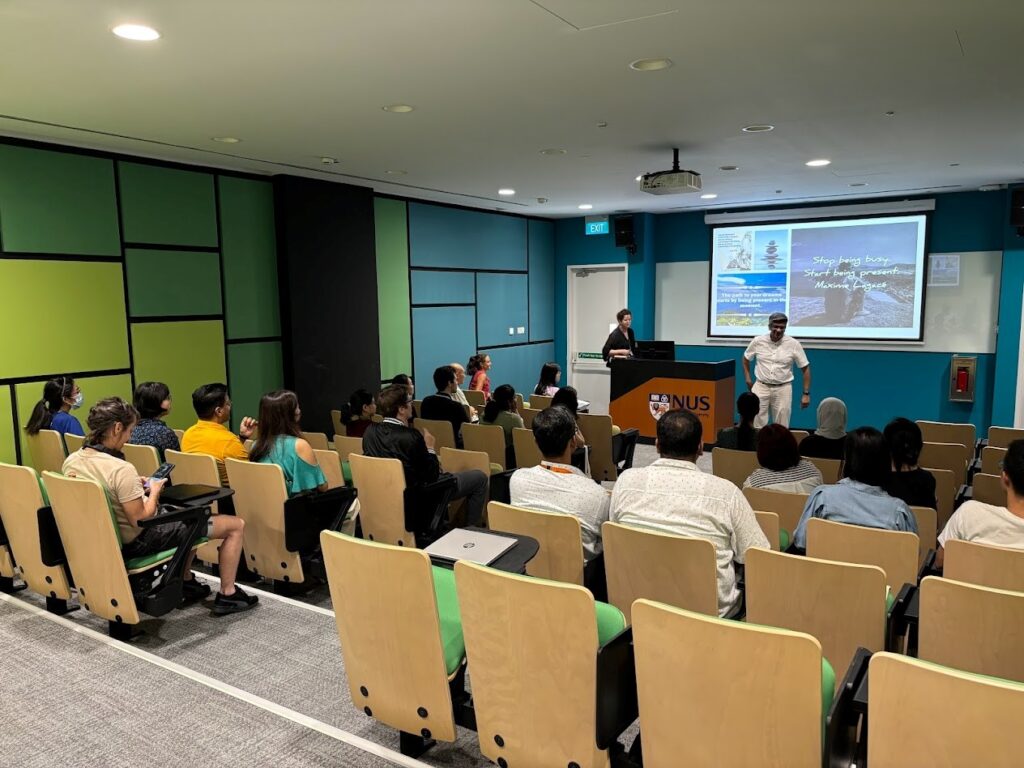
PostDoc Level UP – Career Pathing: Find Yours – Jan 12, 2024
Organised by Office of Postdoctoral Association
This annual PostDoc Level UP was hosted by Postdoctoral Association (PDA) to empower attendees with essential skills and introduce attendees to resources that will enhance their experience during postdoctoral or postgrad training.
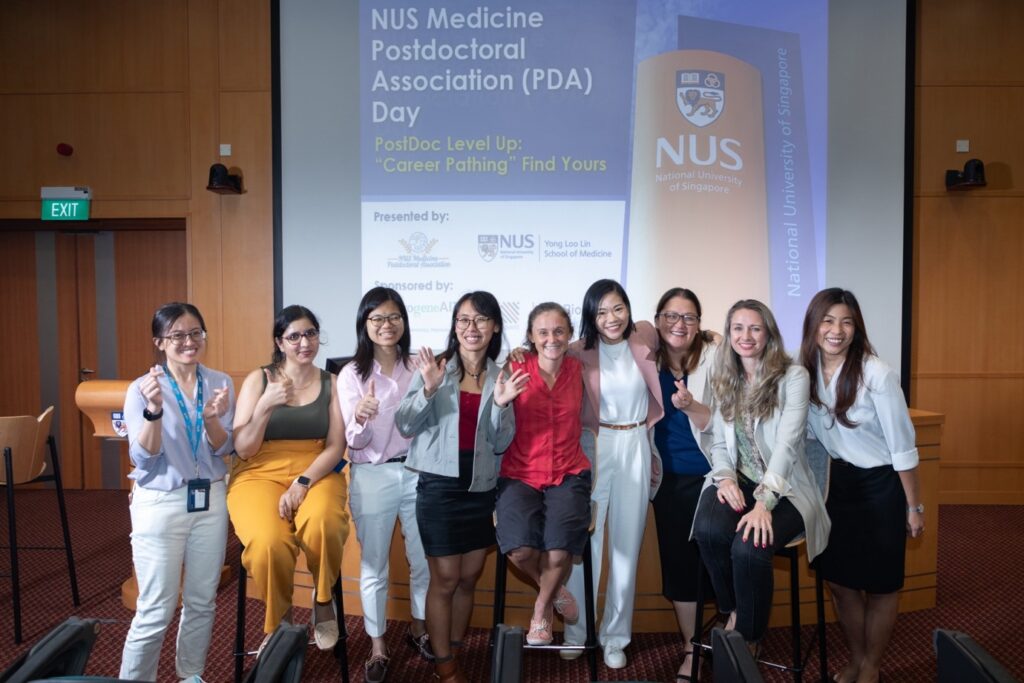
Individual Development Plan (IDP) Workshop: How to Craft Your Own Individual Development Plan
Amidst the buzz of Postdoctoral Association (PDA) Day, we hosted an IDP (Individual Development Plan) workshop tailored for postdoctoral fellows. This workshop was meticulously crafted to foster personal and professional growth, offering attendees a unique opportunity to engage with our newly developed, in-house IDP tool, as part of a pilot study overseen by the Office of Postdoctoral Affairs, evaluating its usability and efficacy for postdoctoral researchers.
Led by Assist. Prof. Sarada Harichand Bulchand and Dr. Inthrani Raja Indran, alongside a team of seasoned mentors from diverse backgrounds, the workshop unfolded over three hours of insightful discussions and interactive activities.
Together, we navigated the intricacies of the IDP process, focusing on skill assessment, goal setting and actionable planning. The workshop's success lay in the candid exchange of experiences and perspectives among participants. As stories were shared and challenges discussed, a sense of solidarity emerged, enriching the learning experience for all involved.
As the workshop drew to a close, participants left with a clearer understanding of their professional goals and a roadmap for their future endeavors.
Launch of NUS Medicine-NovogeneAIT Genomics Postdoc Grant Call 2024
In collaboration with NovogeneAIT, we launched the NUS Medicine-NovogeneAIT Genomics Postdoc Grant.
The NUS Yong Loo Lin School of Medicine and NovogeneAIT Genomics Research Support Grant Program aims to empower Postdoctoral Researchers in advancing impactful research for the community. Awarded projects will receive up to 50% off sequencing services, including proteomics, and access to NovogeneAIT Genomics' multiplatform capabilities and support.
Proposals will be reviewed by a panel from NUS Medicine and NovogeneAIT Genomics. Learn more about the Grant Program and start to apply!
Writing Impactful Grant Proposals & Publications with NUHS Research Support Unit
NUHS Research Support Unit was established to encourage more healthcare professionals and scientists in the National University Hospital (NUH) and the National University of Singapore (NUS) to publish more publications in order to showcase their scientific studies that they have achieved. For more information on the workshops in upcoming months, please visit: https://medicine.nus.edu.sg/rsu/programmes/regular-workshops/
Panel Discussion: Demystifying Transferrable Skills & How to Level UP Your Job Search
It’s a common misconception that the only useful skills that scientists bring to the table when job hunting are technical laboratory skills. While knowing cell culture, flow cytometry, protein purification, and western blots are no doubt valuable, you actually have many more underlying skills than you realize. Transferable skills are skills you can transfer, or take with you from one experience to another. In the interactive panel discussion, we were honored to have on stage with us: Dr Sannie Chong (Senior Director, AP Regulatory Policy, MSD), A/Prof Chen Zhi Xiong (Asst. Dean Education, NUS Medicine), Dr Shikha Singh (Manager ROPU ASKAN, Real world evidence, Boehringer Ingelheim) and Dr Wanxing Eugene Ho (Director, IP & Research, Mengniu Dairy) to talk to us about the transferable skills we gained during our PhD and PostDoc training and how we can showcase these skills to LEVEL UP our job search.
Key takeaways:
1 – Don’t underestimate the skillsets that we acquired during our postdoctoral trainings, such as project management, time managements and problem solving.
2 – Learn to unlearn and embrace greater challenges for better opportunities.
3 – Understand what excites you in your job and work for it.
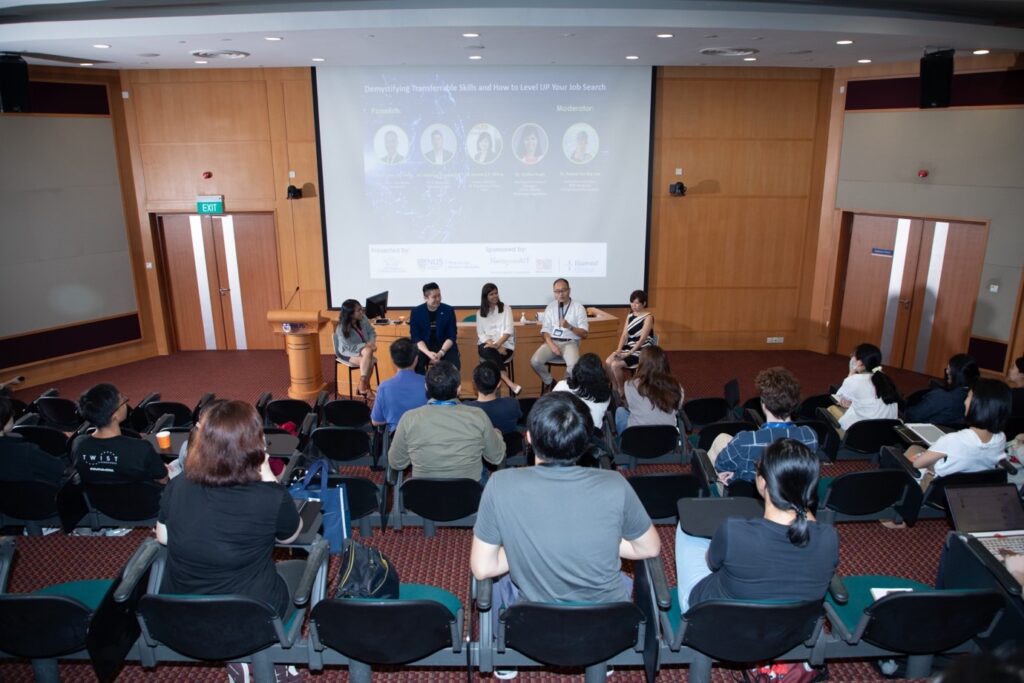
Making the Most Out of Your Mocks – Hone Your Interview Skills
The panellists consisted of esteemed industry leaders including Dr. Diana Hay (Executive Director, Business Development and IP, Arbele), Dr. Stephanie Ambrose (Country Medical Director, GSK), Dr. Venessa Ding (Deputy Director-Talent, SgInnovate), Ms Sylvia Hii (CEO, DAP Group of Companies) and Dr. Lynne Lim (CEO, NousQ Pte Ltd), who are all very experienced interviewers at their workplace, and candidates were selected from the audience. The session was very interactive, and the audience were laughing throughout the session. Importantly, the panellists have given us valuable feedback and advice on job interview skills.
Key take-home messages are that the first impressions matter, and we should be authentic and candid during the interview. We should also emphasize on our soft/transferable skills and teamwork and showcase on how we can bring new elements to the company. Additionally, the interview should be a bi-directional process which allows both the interviewers and the interviewees to know more about one another. These key points will undoubtedly help the attendees to navigate interviews more effectively by leaving a lasting positive impression on interviewers.
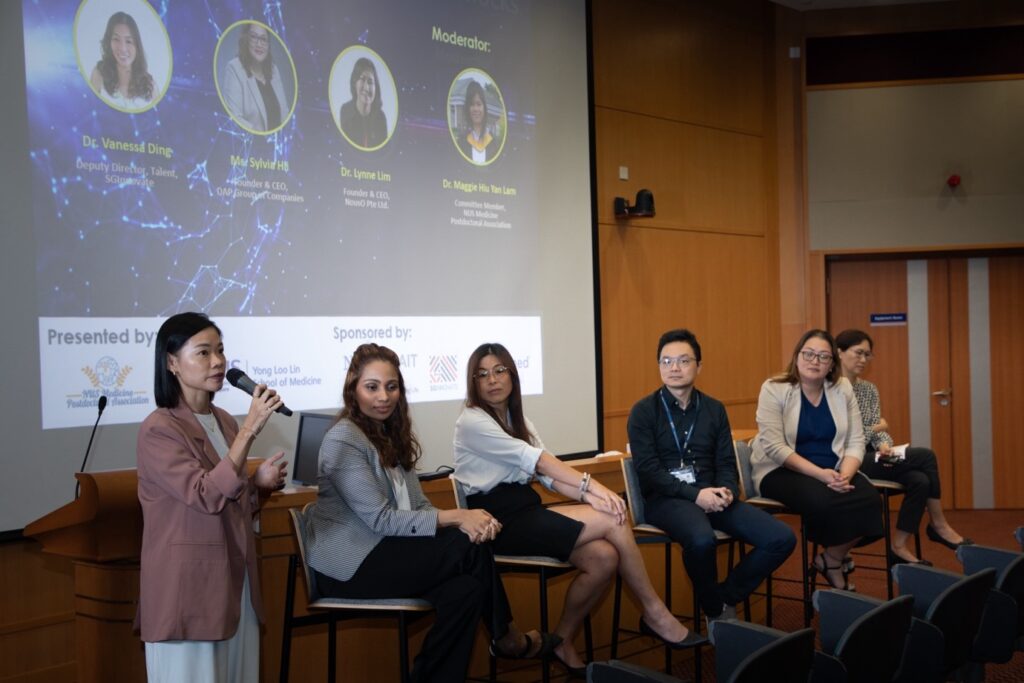
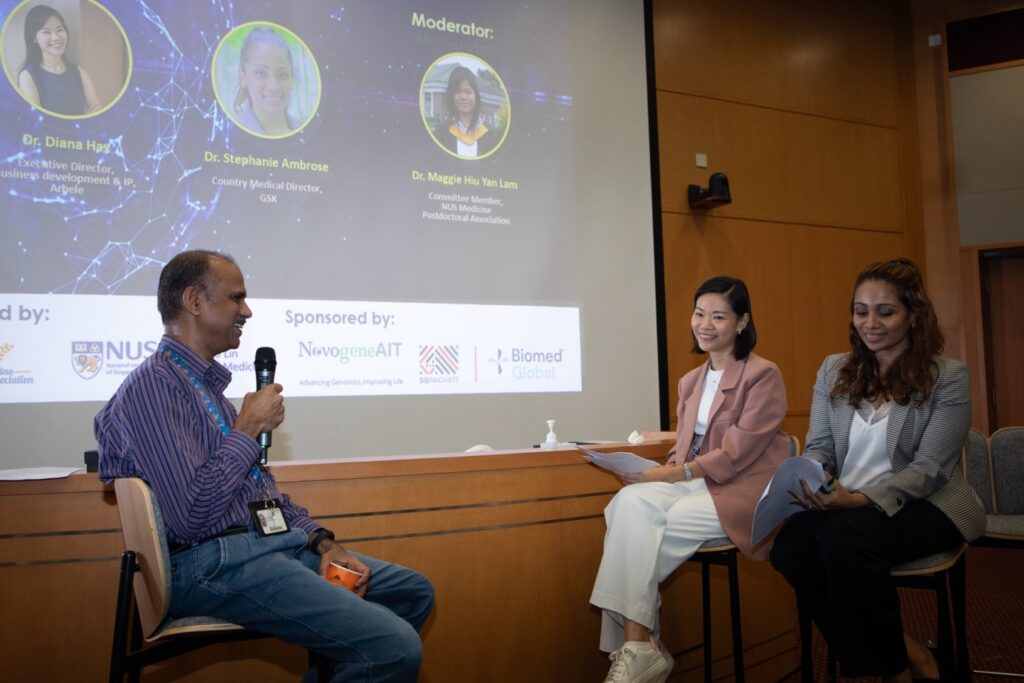
Lab to Launch: Catapulting Innovation and Talent to New Heights with SGInnovate
A session brought to us by SGInnovate. Dr Vanessa Ding promoted the HELIX Programme spearheaded by SGInnovate to assist postdoctoral fellow to transit from lab to launch. For students or postdocs who are interested in the programme, please visit https://www.sginnovate.com/apprenticeship/helix-programme for more information.
This event wouldn’t have been successful without our sponsors: NovogeneAIT, Biomed Global and SGInnovate. It was our pleasure hosting this event and we are already looking forward to our next one. Let's keep the community growing and continue to learn and grow together.
Thank you once again for being a part of our PDA Day celebration!
2022-23 Events
Mastering Effective Communication with Peers and Senior Executives – October 3, 2023
Organised by Office of Postdoctoral Affairs
Facilitated by Ms Agnes Kang, Professional Development Training
Enhancing your communication abilities can be important for achieving success in diverse roles and industries. Effective communication fosters understanding, trust and respect, creating positive environment for sharing ideas and solving problems. NUS Medicine Research Fellows had the valuable opportunity to enhance their communication skills through the “Mastering Effective Communication with Peers and Senior Executives” Workshop. This workshop was facilitated by the experienced and engaging Communication Coach, Ms Agnes Kang from Professional Development Training. Agnes is a Soft Skills trainer with more than a decade of training experience in Singapore, Hong Kong and China. She has conducted training for various leading organisations in the Retail, Transport, Education and Healthcare Industries.
In this workshop, participants acquired strategies for identifying and adjusting to different communication styles, promoting successful workplace relationships. They also gained understanding of various personality types and communication preferences. Additionally, attendees learnt to overcome communication barriers and to convey messages effectively. They developed skills to navigate challenging situations through conflict resolution techniques, fostering a shared framework for resolving workplace issues. Research Fellows have also explored the STAR approach, which enabled them to tailor their messages according to specific situations, equipping with the ability to confidently and effectively manage difficult conversations.
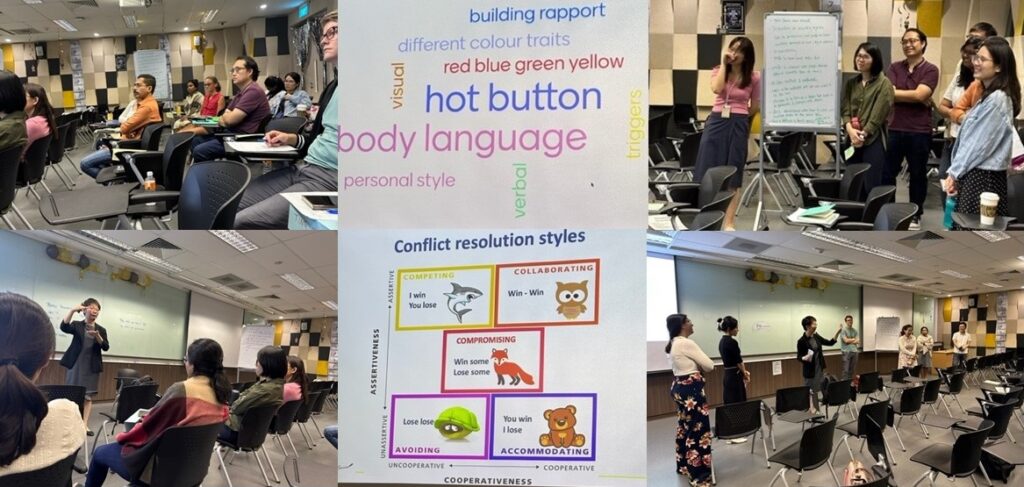
Feedback:
“I found this workshop quite insightful and informative. The main takeaway that impressed me was the importance of identifying both your own and your opponent’s “hot button” and how to handle it effectively. The idea of either avoiding pressing it or finding ways to address it by identifying the person’s “cool button” is a valuable strategy for maintaining constructive communication”.
“ I appreciated the emphasis on finding common ground when resolving conflicts. It’s a crucial point that often gets overlooked, and recognising the different personality styles that influence communication preferences is essential. Being aware of these styles can indeed serve as a key to achieving effective communication. Thank you for organising this useful workshop!”
“I had an excellent experience during the workshop. One part that stood out to me was the group activity where participants had to segregate themselves based on their perceived personality types. It was not only entertaining but also incredibly insightful to discover the common traits and communication preferences of each personality type. I’m happy I attended this workshop and look forward to many more”.
“I found the workshop truly enlightening. One key takeaway that resonated with me was the importance of turning feedback into “I” messages. This not only creates a more constructive and empathetic communication but also encourages self-awareness and personal responsibility. In addition, the advice to avoid ‘don’ts” because the brain tends not to register negative terms, made perfect sense. I found the workshop both practical and insightful, and I believe these insights will greatly improve my communication skills”.
“I greatly enjoyed and appreciated the opportunity to engage in the pre-workshop activity that allowed me to identify my own REACH Personal Style profile. It was an eye-opening exercise that helped me gain valuable insights into how I communicate, manage tasks, and relate to others. Thank you for providing this wonderful opportunity to explore and learn about myself and my communication style”.
“The pre-workshop activity set a strong foundation for the entire session, making the discussions more meaningful and relevant. It allowed me to better understand my communication preferences. I believe this will have a positive impact on my personal and professional interactions”.
“As research fellows we need more of sessions like these. Learning proper communication skills, especially when dealing with upper management and clients, is crucial in today’s workplaces. Knowing how to handle non-cooperative staff without having to remove them from the team is a skill that many of us could benefit from. Similarly, dealing with demanding superiors who may not be open to constructive discussion is a challenge, and guidance in this area would be highly valuable. It would also be incredibly beneficial to explore techniques for efficient communication during group meetings or small-group discussions. Often, such meetings can become meandering and having strategies to keep the conversation on track would be useful. I look forward to more workshops in the REINVENT Programme. Thank you for providing this opportunity for growth and development”.
Webinar: The Journal Publishing Process: Why Publish, and How to Get Published – September 15, 2023
Co-organised by: NUS Medicine Postdoctoral Association and NUS Libraries, Researcher Unbound Series
Speaker: Ben Bishop, Executive Publisher, Springer Nature
This webinar was presented by Ben Bishop, Executive Publisher of the Springer journals oncology portfolio He has worked at Springer Nature since 2011. His team are responsible for 25 journals with an annual publication count of >6,000 articles. The team works closely with external Editors-in-Chief to ensure the journals are meeting the needs of the audiences that they serve. For authors this includes fast and constructive peer review, and quick responses to submission and article formatting queries; for readers, it is ensuring that the journals produce engaging and scientifically sound articles that help to continue the advancement of cancer research and practice.
This webinar provided attendees with an overview of the scientific journal landscape, explored the reasons for choosing to publish in scientific journals, and how the publishing process works from study concept through to final publication. Furthermore, Ben revealed tips on how authors can increase their chances of a successful submission.
Ben also explored the benefits and shortfalls of the different publishing models available to authors, key considerations with regards to research integrity and ethics. The publisher also talked about various approaches available for increasing the discoverability of your research and publications.
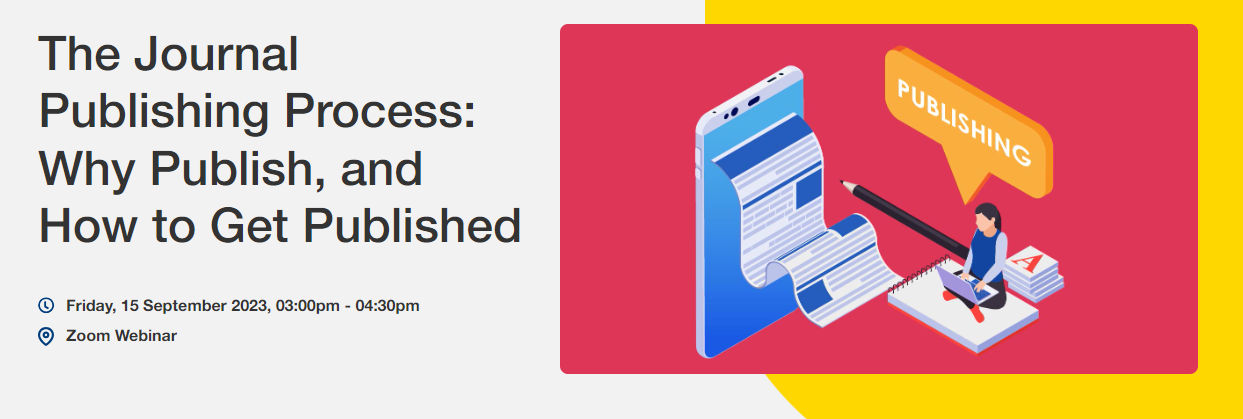
Project Management Planning: Tech Transfer of Biologics to Manufacturing Site in Singapore workshop – August 31, 2023
Co-organised: by NUS Medicine Postdoctoral Association and SGInnovate
Speaker: Dr Prasad KPP, Ex-Site Leader, Pfizer and Tessa Therapeutics
Many postdoctoral researchers aspire to transition from academia to industry but often face uncertainty about how to effectively transfer their skills. While they possess specialised knowledge gained from their research, they may wonder how these skills can be applied in the corporate world. Bridging this gap often involves recognising the transferable qualities of their expertise and acquiring complementary skills like project management.
Project management skills are highly transferable across various industries and sectors. Whether you end up in a scientific research role in a pharmaceutical company, a technical role in a technology firm, or any other position in the private sector. This workshop was co-organised with SGInnovate and offered to the participants valuable insights into the challenges and opportunities associated with managing technology transfer processes and analytical methodologies. Dr Prasad discussed project management principles within the framework of biologics technology transfer. He explained how process knowledge and analytical methods are conveyed across international sites. Furthermore, participants received guidance on monitoring progress and engaging key stakeholders. The hands-on session provided an excellent opportunity to apply project management planning through a Case Study.
Feedback:
“I found the project management workshop highly informative and practical. The content was well-structured, and the activity carried out using real-world examples was especially helpful. Thanks for a valuable learning experience!”
“Project management workshop jointly organized by NUS School of Medicine and SGInnovate was really helpful for students and postdocs who are looking for a sense on how project management works. Prasad (the speaker) is tremendously experienced and his hands on session during the workshop helps us to better structure of train of thought when it comes to managing a project. The workshop is more at intermediate level and would be more beneficial if we have it as a longer session but nonetheless, it was a great snapshot of the R&R of a project manager.”
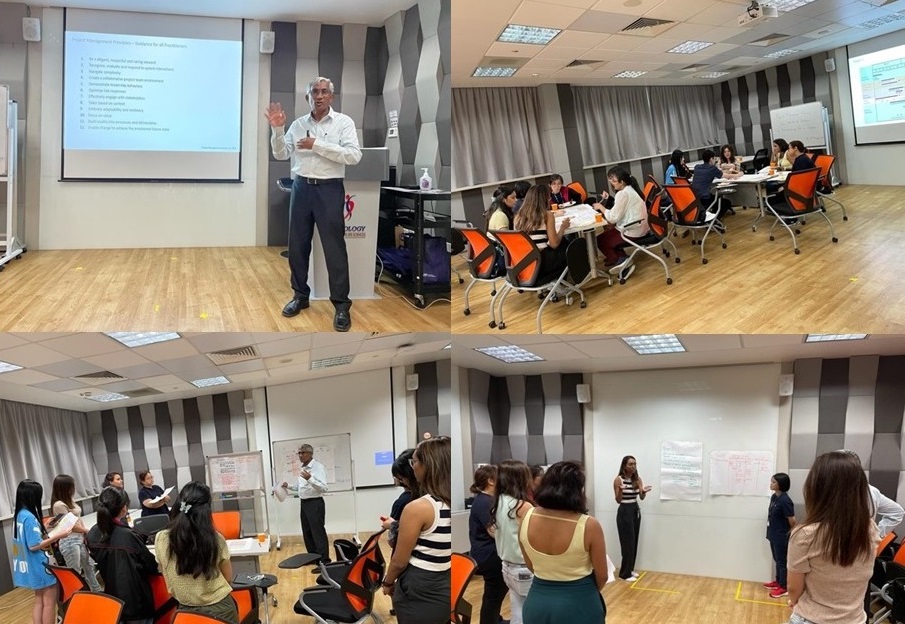
Take the Next Step in Your Biomedical Career – July 5, 2023
Co-organised: by NUS Medicine Postdoctoral Association and SGInnovate
Many researchers question whether they have the necessary skills to pursue a career in the biomedical industry. The unequivocal response is yes. Our academic background serves as the building block for an array of opportunities within various biomedical sectors. Whether you aspire to coordinate and oversee drug development as a pharmaceutical project manager or delving into research commercialisation, the potential for the career is extensive. The recent workshop co-organised with SGInnovate provided the opportunities to explore careers in the biomedical sector and mingle with prominent biotech leaders.
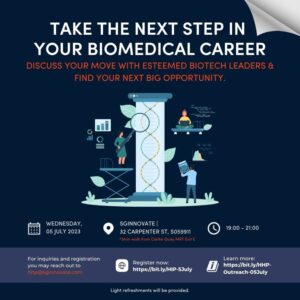
NUS Medicine - 2023 Outstanding Research Fellow Award – April 2023
In April, the Office of Postdoctoral Affairs announced a call for nominations for the NUS Medicine Outstanding Research Fellow. This award was to recognize the efforts and achievements of NUS Medicine Research Fellows, who have demonstrated excellence in research, service, mentoring and leadership. Their contributions have had substantial and positive influence on both the NUS Yong Loo Lin School of Medicine and a broader scientific community.
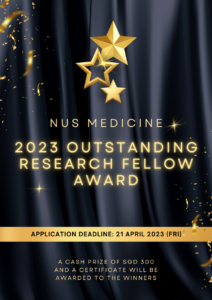

NUS Medicine – 2023 Outstanding Mentor Award for Research Fellows – April 2023
Also in April, the Office of Postdoctoral Affairs initiated a call for nominations for the Outstanding Mentor Award for Research Fellows. It is worth noting that many of the critical mentors in science often do not receive the recognition they deserve. The primary objective of this award was to acknowledge and celebrate Research Fellows within our community who have consistently demonstrated exceptional dedication, effectiveness, and diligence in fostering and aiding the growth of their mentees, which may include both students or research staff.
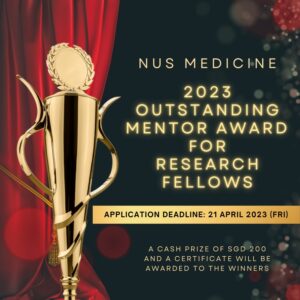

Protecting IP for CGT products and processes – May 18, 2023
Co-organised: by Office of Postdoctoral Affairs and SGInnovate, NUS Medicine.
Facilitators:
Adam Gregory, Partner, Patent Attorney. Mewburn Ellis LLP
Anna Mudge, Senior Associate, Patent Attorney, Mewburn Ellis LLP
This workshop was designed for individuals interested in Cell and Gene Therapy (CGT) development and provided an in-depth understanding of challenges and strategies required to protect intellectual property in this area. Facilitators from Mewburn Ellis LLP provided tips on how to evaluate the factors that could affect CGT IP strategy and proposed solutions to overcome challenges when developing CGT IP strategy.
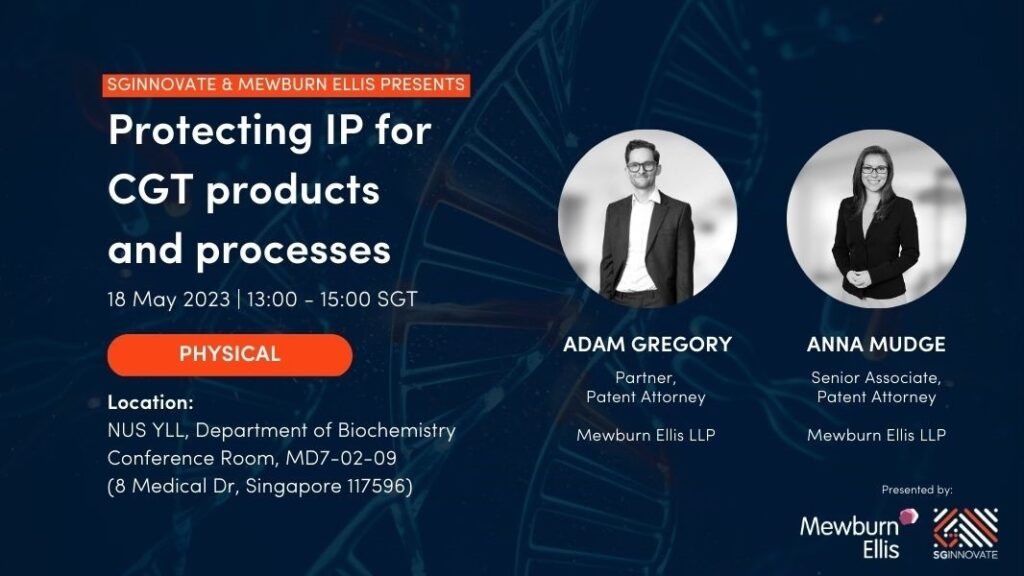
Emotional Health Course: Finding Peace in a Frantic World – June 13 - July 18, 2023
Co-organised: NUS Medicine Postdoctoral Association and Department of Physiology
Facilitators:
Assoc. Prof Celestial Yap, NUS Yong Loo Lin School of Medicine, Physiology, Programme Director.
Dr Virginia Lien, Masters in MBCT, The Mindful Compassion Project.
Have you been experiencing stress, feeling stretched thin, or simply worn out by the fast-paced demands of modern life?
We recently concluded a comprehensive 3-session course, followed by a dedicated follow-up session. The course was meticulously designed to equip participants with valuable tools for navigating the challenges presented by contemporary living. The practical techniques taught can be seamlessly integrated into daily routines, offering a simple yet highly effective means of finding relief from stress and preventing burnout.
At the core of this course lies Mindfulness-based Cognitive therapy, a well-established approach developed by psychologists at the University of Oxford (UK). This evidence-based approach empowers participants with knowledge and skills that promote psychological well-being.
The sessions were skillfully led by Dr. Virginia Lien and Assoc. Prof. Celestial Yap, who consistently demonstrated qualities of engagement, empathy, and approachability. In the words of their fellow participants: 'They were attentive listeners, consistently motivating to share our deepest concerns and fears. Their willingness to address all our questions created a safe and judgment-free environment.”
Take-home messages:
• Acknowledge the interconnectedness of thoughts, emotions, and bodily sensations and acquire skills to recognise triggers and effectively manage your responses.
• Incorporate self-compassion and mindfulness into your daily routines, such as breathing, eating, walking, and physical movement.
• Cultivate the ability to stay grounded in the present moment.
• Embrace all thoughts and emotions without judgment.
• Harness the transformative power of acknowledgment and gratitude in your life.
Feedback:
“Through the course and practices, I have become aware of my sensations and needs, both body and mind. Practicing mindful activities also helps me to be self-accepted not judgmental. Adjusting the balance between nurturing and depleting activities is also useful for me to keep calm and not over reacted.”
“Mindfulness, breathing space and befriending practices helps me get a new, better outlook towards my life events (past and present).”
“For me, the biggest struggle before coming to these sessions was to stay grounded. I felt especially ungrounded as someone who worked in a field that is completely different from my academic background. It was even more so as move to Singapore alone - and I had never lived in Singapore before.
Learning these mindfulness practices reminded me that being grounded can be in many forms. The fact that my body can sense its surrounding stimuli is a way of anchoring in and not felt as if I’ve drifted too far away.”
“I manage to find time for myself in a stress situation to calm myself down or start the day afresh when I practice in the morning.”
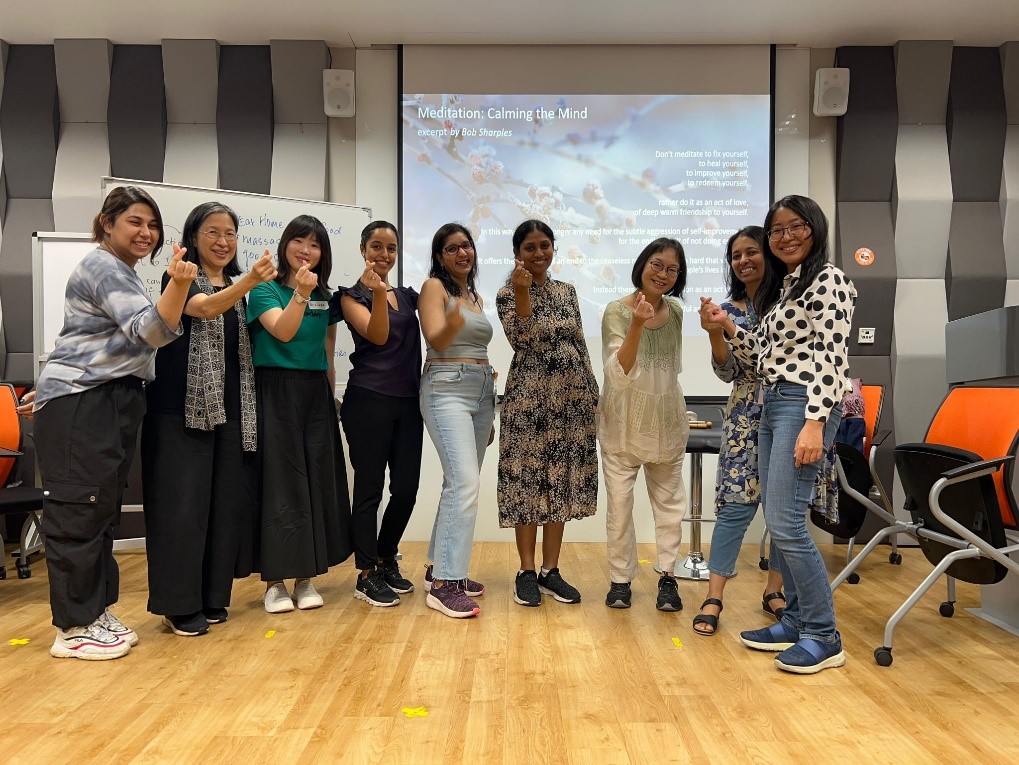
FEBS-IUBMB-ENABLE 2024 – First in Asia
Conference Kick-off Meeting, Cologne, Germany – May 15-16, 2023
FEBS-IUBMB-ENABLE conferences stand out for their unique focus on young researchers, including PhD students and postdocs, hailing from various European institutions. These annual gatherings encompass a diverse array of components, with the central highlight being a scientific symposium dedicated to exploring the latest advancements in molecular life sciences. Furthermore, these activities serve as an invaluable platform for aspiring science communicators among PhD students and postdoc fellows.
It is worth noting that funding support from IUBMB has been secured to host the ENABLE conference in Singapore. ENABLE 2024 is poised to bring together early career scientists, both from abroad and the national community. This three-day symposium will be jointly organised by NTU, NUS Medicine, Duke-NUS Medical School, and A*STAR.
The inaugural meeting to kick-start the conference took place in Cologne, Germany. A delegation from Singapore, including Dr Chew Bing Liang Alvin (President, LKCMedicine EArly Researcher Network - LEARN), Dr Madhuvanthi Chandrakanthan (Co-Chair, LKCMedicine, LEARN), and Dr Vanja Cnops (President, NUS Medicine, Postdoctoral Association - PDA), convened with members of the Scientific Organising Committee. This committee consisted of selected PhD students representing leading European Biomedical Institutes, including Radboud University Medical Centre (Nijmegen, the Netherlands), IRB (Barcelona, Spain), the European School of Molecular Medicine (Italy), the University of Copenhagen (Denmark), and the University of Cologne, (Germany). The primary purpose of this gathering was to discuss and streamline the organisational aspects of the conference.
Senior representatives from FEBS (Federation of European Biochemical Societies), Dr Francesca Fiore and Dr Vlastimil Kulda, delivered a presentation detailing the the FIE conference. Their presentation covered its objectives, scope, historical context, and future vision. In turn, the LKCMedicine representatives provided an overview of LKCMedicine, LEARN, and the conference venues.
During the meeting, attendees actively participated in team building activities. These activities served as a platform for individuals to acquaint themselves with one another, establish expectations, and cultivate strong team motivation, all geared towards ensuring the success of the ENABLE 2024 in Singapore.
Anticipate more exciting developments and events on the horizon. Stay tuned for updates!
Trivia Night, Sapore, UTown, 5-8pm – May 12, 2023
Kindly sponsored by NovogeneAIT and BD
More than 30 participants turned up, who were divided into 4 teams for the Trivia quiz. The questions ranged from general knowledge and celebrity gossip to very specialised genomic techniques. There was lots of food and drinks, dancing and singing, and the winning teams received prizes. In summary, a great evening to get to know each other outside of the lab.
Feedback:
"A big thank you to the organizers for the amazing trivia night! The free drinks and food were such a generous touch, and they added to the overall enjoyment of the evening. It was a perfect opportunity to unwind with fellow postdocs while putting our knowledge to the test. Looking forward to more events like this in the future!"
"The trivia night was a great way to bring postdocs together! It was a great opportunity for team-bonding and enjoy some quality time with colleagues. The free drinks and food were a pleasant surprise, and they definitely added to the fun. Can't wait for the next one!"
"I had a fantastic time at the trivia night! The combination of stimulating questions, delicious food and complimentary drinks created a memorable experience. It's evident that a lot of effort went into planning, and it paid off. Wonderful to see our workplace fostering a sense of community and fun.”
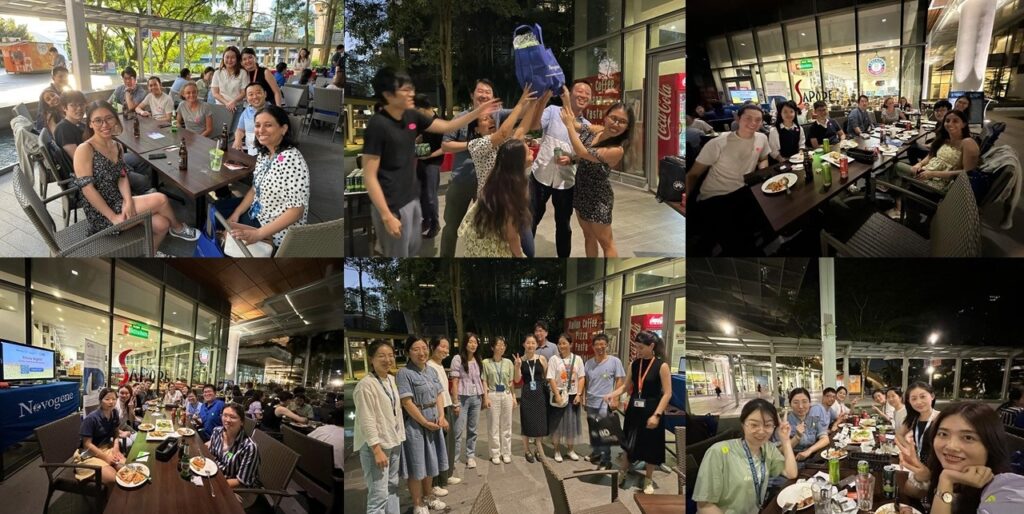
Distressing Coffee Break – April 4, 2023
Venue: Staff Lounge, CeLS, 4-6pm
The ‘Destressing coffee break’ for postdocs was a casual and enjoyable gathering where postdoctoral researchers from various departments joined to connect, exchange ideas, and build a sense of community. Held in a cosy staff lounge at the Centre for Life Sciences, the event provided a much-needed break from our busy research schedules. During the meetup, the postdocs had the chance to share their research interests and projects in a relaxed environment. Many found common ground and potential collaborations emerged as a result. The event also featured a brief discussion on work-life balance and strategies for navigating the challenges of postdoc life. Coffee, tea, and a variety of delicious snacks were available for all to enjoy, creating a warm and inviting atmosphere. The meetup lasted for about two hours but the connections made and the positive energy carried on well after the coffee break ended.
A Telegram channel was set up to organise future informal meetups, as well as for research and non-research related queries. All NUS postdocs are welcome to join our Telegram channel here!
Feedback:
"I'm so glad we organized this coffee break meetup for postdocs. It's essential to have a space where we can unwind, share experiences, and forge connections. These types of meetups are great for building a sense of community among postdocs. It reminds us that we're all in this together and that support is available."
"The choice of venue and the availability of refreshments created a warm and inviting atmosphere. It felt like a friendly gathering rather than a formal meeting. The informal setup made it easy to strike conversations with fellow postdocs from different departments. I appreciated the opportunity to network and discuss potential collaborations."
"This coffee break was a welcome break from the daily grind of research. It allowed us to step back, relax, and socialize. More of these events, please!"
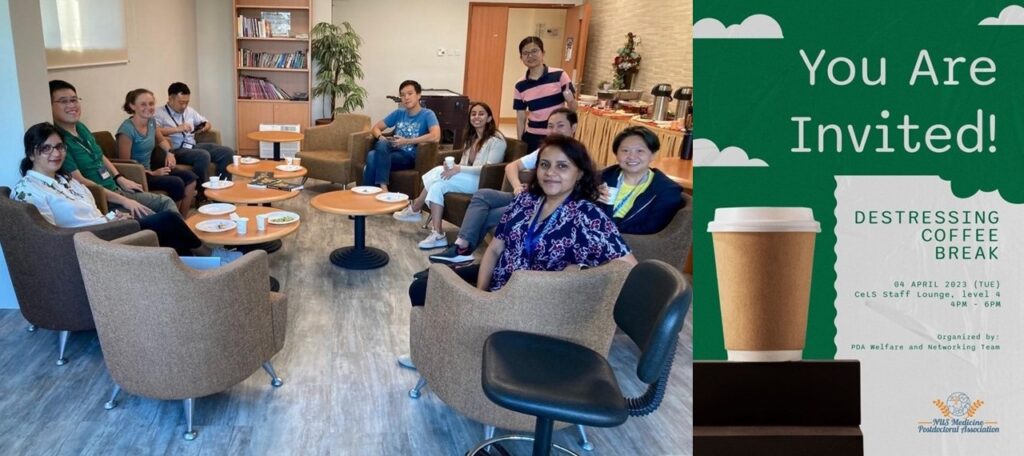
Research Manuscript Writing Seminar: Publication Secrets – March 24, 2023
Speaker: Dr Howard C. Bauchner
Professor of Pediatrics and Public Health, Boston University School of Medicine
Editor in Chief, JAMA and the JAMA Network (2011-2021)
The NUSMed Postdoctoral Association hosted a research manuscript writing seminar for postdocs and postgraduate students. The seminar was headed by Professor Howard C. Bauchner, former Editor-in-Chief of the Journal of American Medical Association (JAMA). The seminar covered the essential elements of research manuscript writing, including how to select the correct journal, write the cover letter, and structure and link the different sections of the manuscript while staying focussed on the key findings. Prof Bauchner lift up the veil of secrecy of happens to our manuscripts after submitting to a journal and provided insights into the reviewing process. There was also time to discuss evolving issues in research publishing, such as peer review, pre-prints and data-sharing. Postdocs and postgraduate students unanimously agreed that Prof Bauchner’s knowledge and insights enriched our understanding of the manuscript writing process, and we are tremendously grateful for Prof Bauchner’s time and openness in sharing his expertise with us.
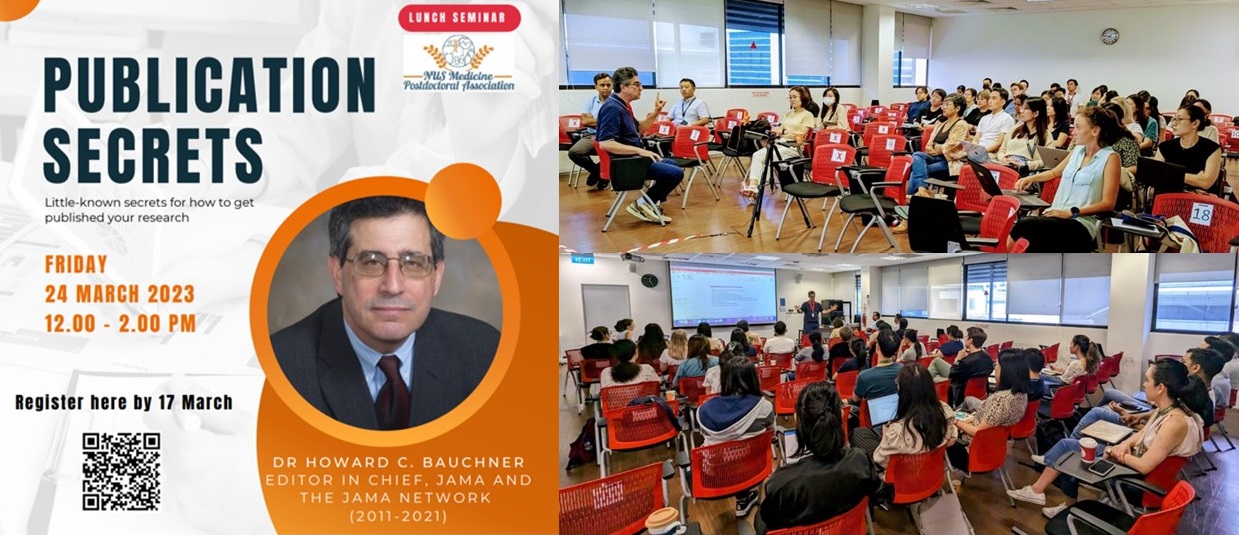
Reinvent Programme: Effective Leadership Skills Workshop – February 20, 2023
Trainer: Paul Stuart, facilitator & co-founder, Kaleidoskope.
This interactive workshop provided the tools and knowledge necessary to effectively lead and influence others without exerting direct authority. The participants have learnt to analyse, and use influencing strategies and behaviours and practice their application in various familiar work contexts.
The workshop was conducted by an experienced trainer, Paul Stuart from Kaleidoskope, Corporate and Leadership Training provider in Singapore. Paul’s leadership experience spans a range of major project management roles, together with senior positions in General Management, Human Resources, Learning & Development Operations. He has delivered a workshop that was engaging, practical and fun.
Take-home messages:
• Spend time to build trust & credibility with your team.
• Share expectations & seek feedback.
• Be a good listener & learn to ask the right questions.
• Explore different leadership styles.
• Identify the competency level of a student/research assistant and adjust your leadership style.
• Spend time to create an environment of psychological safety.
Feedback:
“Thanks for organizing this workshop. There are many points I can apply to my work/workplace. It was definitely a day well-spent!”
“The session was absolutely wonderful.”
“Learning about the push and pull influencing tactics was eye-opening, and understanding when and how to use it was very helpful. I also appreciated the opportunity to put theory to practice during the group exercises. It was fun and provided a chance to meet new people.”
“It was highly informative to learn about self-awareness and to get to know own leadership styles as well as the drawbacks of certain styles. I’ve gained a deeper understanding of how to transition from one leadership style to another and how to develop myself a leader.”
Achieving balance is the biggest challenge that leaders face since various leadership styles are effective in different situations. Although a pull approach is better, oftentimes we aren’t aware that we are pushing. Learning to distinguish between the two was very helpful.”
“The trainer provided real-life stories from the bigger world which illustrated perfectly some of the leadership principles, while the leadership scenarios from the academic research environment offered excellent opportunities to practice various influencing techniques.”
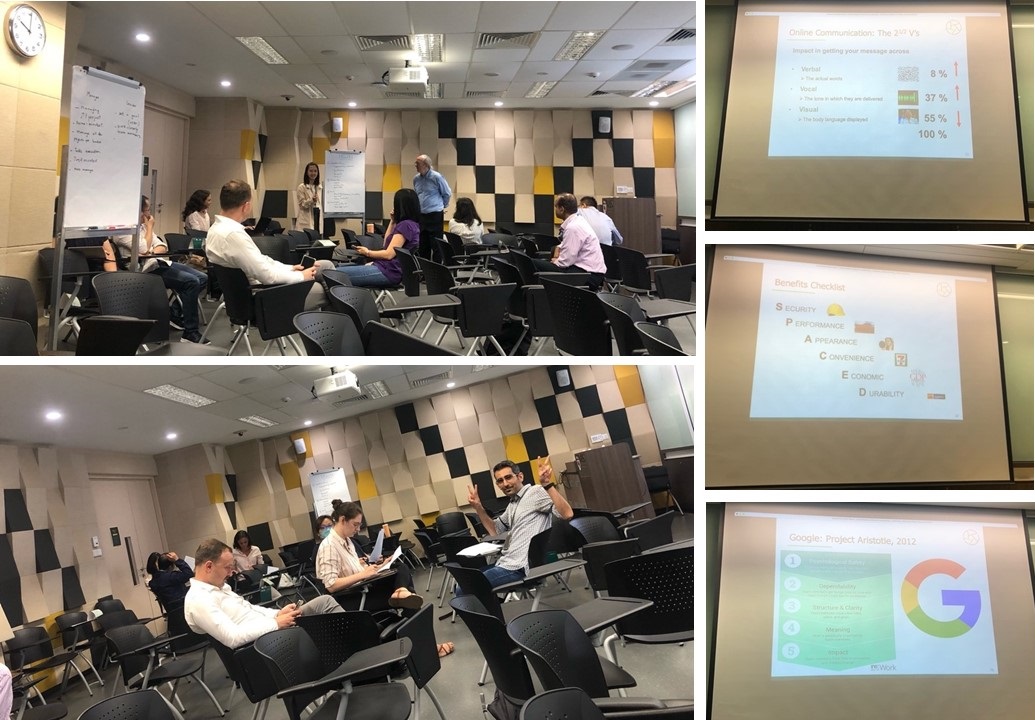
2021-22 Events
Postdoctoral Level UP: Postdoc Survival Kit: GRIT, Resilience & Support – November 23rd, 2022
Postdoctoral scientists often experience distress due to failures in their research or lack of career progression. Importantly, failures can be reframed by managing expectations and a solid support system that can help postdocs sail through their training. NUS Medicine Postdoctoral Association organised a full-day retreat curated for postdoctoral fellows, with the aim to extend a helping hand and empower them with diverse resources and toolkits. We had an exciting day featuring a Resilience Workshop, Postdoc Orientation & Framework, Pop-up Mentoring Session, and Peer Networking.
The Resilience Workshop was conducted by the accomplished trainers from The School of Positive Psychology and introduced the SPARK Resilience Model to build resilience via cognitive reappraisal. Using real-life and tailored case studies, the participants had learnt to use this model to support their everyday challenges both in their personal and professional lives.
NUS Medicine Postdoc Orientation & and Framework
This session oriented the postdocs to the available resources and ways to seek assistance for their further needs. We have also introduced the proposed Postdoc Development Framework to track professional development, career progress and transition plans in a S.M.A.R.T (Specific, Measurable, Attainable, Relevant, Timely) manner.
The Pop-up Mentoring Session was a free-styled session to help postdocs seek guidance on their concerns and professional queries. Postdocs were assembled into groups of 5 and 2 mentors were assigned to each group based on postdocs’ preferences. Mentors were asked to share about their current role, typical work day, how they attained their position, the challenges they faced and tips to manage work-life balance. Postdocs were encouraged to seek for mentors’ opinion on something they had been working on or potential next career steps.
Peer Networking and Games
The value of a strong peer support system is unquestionable, from sharing experiences, ambitions, and aspirations to the ease of communication, exchange of ideas and asking for help. Postdocs were offered a brilliant opportunity to network informally and build strong bonds through lively activities and games. This was a lively afternoon where friendly competitiveness, ambition and team work shined through.
Feedback:
“Developing resilience is such a great topic, especially for researchers with their work’s ups and downs. I’m grateful the workshop provided helpful thought patterns and examples to dissect negative responses to stress. I find the SPARK model is practical and realistic and will try to use in some situations”.
“Awesome event! Look forward to having more of such events and participate in mentoring sessions!”
“Thanks for organising the Postdoc Level UP! It was helpful to be introduced to the Framework and the Individual Development Plan. I shall definitely keep them in mind and will be looking forward for the Individual Development Plan to roll out.”
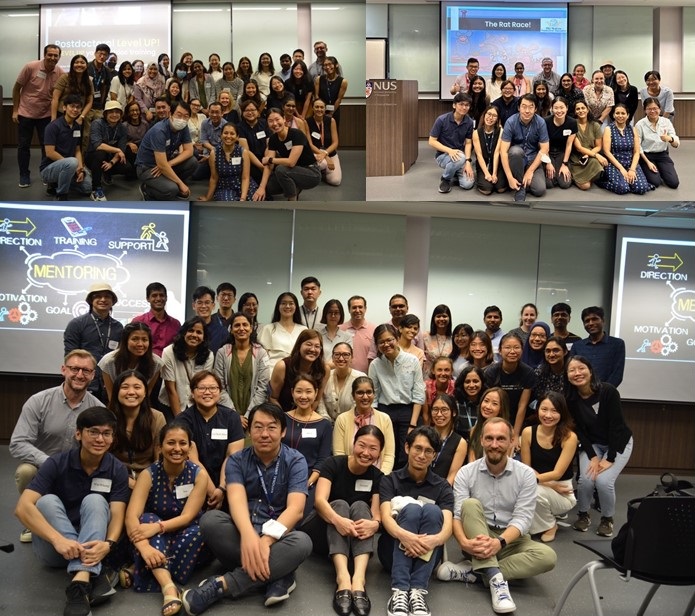
Coaching for Postdocs – September, 2022
In September, the NUS Medicine Office of Postdoctoral Affairs, in collaboration with NUS Medicine faculty members who have graduated from the NUS Medicine Associate Coach Training Programme for ontological coaching, has launched Coaching for Postdocs. This initiative is aimed to support postdocs who may be looking for some life coaching. The coaching conversations can be on any topic or goal where the postdocs may wish to develop or do better, such as health, relationships, communication, career aspirations and goals.
Research Fellows’ Group Mentoring – February - December, 2022
The NUS Medicine Office of Postdoctoral Affairs launched the Research Fellows’ Group Mentoring Sessions for NUSMed postdoctoral research fellows. Each session hosted 5 postdocs who were grouped according to the year of training. The objective of the programme was to provide further support to postdocs’ professional development, understand the challenges and co-create a community of support. Topics discussed included individual postdoctoral journeys, career objectives, personal and professional development undertakings necessary to achieve their career aspirations.
NUSMed-Advisory Mentorship Programme – September - November, 2022
Effective and timely mentorship is crucial for postdocs’ professional development and career progression, yet it is often lacking or overdue. We have partnered with Advisory, a youth-led non-profit organisation dedicated to empowering young Singaporeans to make informed career and further education choices, to initiate a 3-month long mentorship programme tailored specifically to postdoctoral trainees. We have engaged mentors from both academia and biotechnology sector to provide NUS Medicine postdocs with meaningful professional insights and direction. The Programme involved three individual meetings, once a month.
Monthly PDA Social gatherings – August 4, September 6, 2022
We were excited to resume face-to-face networking activities for postdoctoral peers organised by the Welfare Committee. During the 3-hour meet-ups research fellows were happy to share their aspirations, ambitions, research challenges and scientific discussions while engaging in ice-breaker games, such as Research Bingo, and munching on snacks. The winners of the Research Bingo went away with the edible gifts thinking of the next gathering.
Feedback:
“It was a really lovely get-together! I was pleased to catch up with old friends and get to know new ones. It will certainly help me navigate the campus better”.
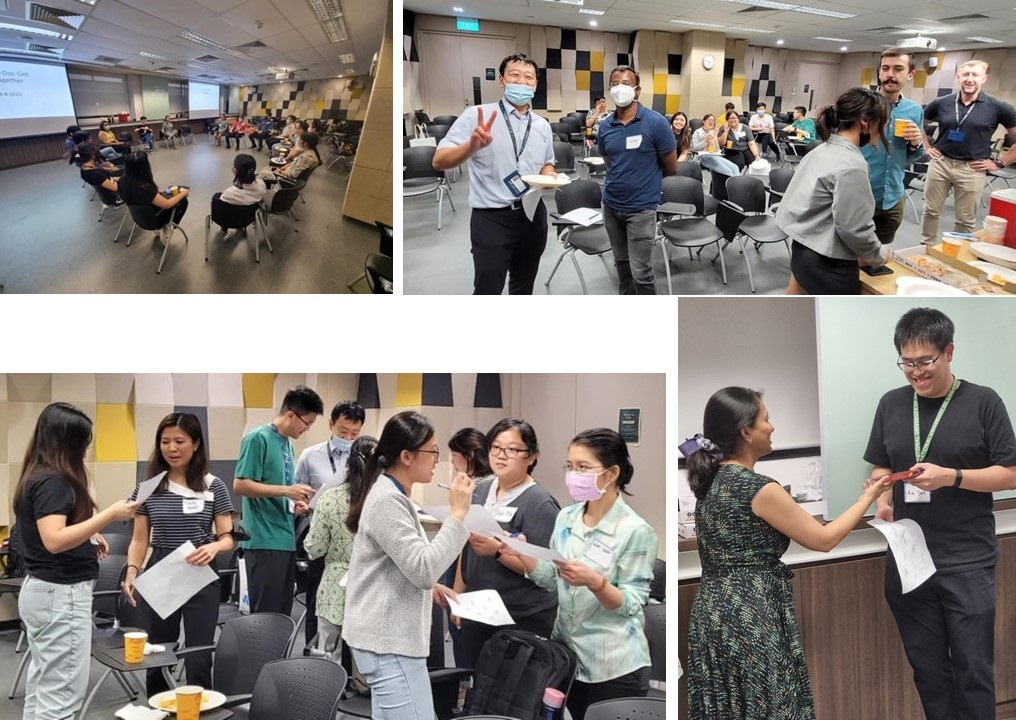
Building Professional Brand with LinkedIn - Rock your profile – August 16, 2022
Speakers:
Victoria Ng, Member Support Consultant, LinkedIn
Clarence Lim, Talent Account Director, LinkedIn
LinkedIn is the world’s largest professional network with more than 830 million members in more than 200 countries worldwide. It is far more than a job search platform but a virtual first impression and a potential opening to an exciting connection that could lead to the next big career move.
The objective of the seminar was to emphasise the value of a LinkedIn profile to develop your professional brand and the practical ways to achieve that. The webinar was customised for the researchers’ community and taught postdoctoral trainees how to build an engaging profile that speaks directly to their target audience.
The speakers described methods to boost social presence and expand professional networks through LinkedIn. They gave practical tips on how to showcase the skills and accomplishments across the platform as well as how to land a job by building a compelling profile.
Take-home messages:
1. Tips for writing a summary, listing accomplishments, etc.
2. Use Endorsement and recommendation functions to build connections.
3. Join relevant groups to engage in discussions and network with a specific group.
4. Use relevant keywords, keep actively posting, reacting, commenting on posts, include hashtags to stand a better chance for your profile to be seen by a potential recruiter.
Feedback:
“Linkedin is a great social/ career platform. Tips on building a researcher profile and maintaining online presence were very useful as it is not always straightforward considering complex scientific language and technical skills that need to be described”.
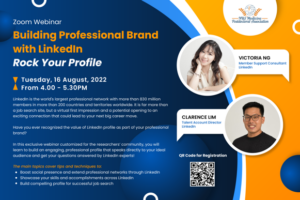
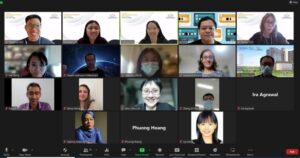
NUS Medicine Partners with Hummingbird Biosciences: Interested in joining a team contributing to the future of precision medicine? – July 27, 2022
Speaker: Dr Garry Khoo, Vice President, CMC, Hummingbird Bioscience
Hummingbird Bioscience was invited to talk about drug development in a fast-paced environment, their integrated approach to finding right targets, molecules and patients as well as job opportunities in the company. The talk was followed by a vibrant Q&A session where Dr Khoo along with six other Hummingbird’s employees shared about their career journeys and lab-based and non-lab roles at Hummingbird Bioscience. The seminar culminated with a networking session between the NUS Medicine postdoctoral fellows and Hummingbird’s professionals.
Take-home messages:
1. Biotech industry involves professionals with diverse skills and any one individual cannot possess all of them.
2. A postdoc needs to be prepared to assume different roles and learn new skills.
3. Important to think of a “killer experiment” aimed to disprove a hypothesis faster.
Feedback:
“It was a great sharing session. It was interesting to learn about Dr Khoo’s professional journey and that it had taken him various roles to arrive to where he is today. I was also impressed to be given an opportunity to interact with the 6 other Hummingbird’s employees, whose expertise ranged from Scientists to Project Management to Business Development to Communication”.
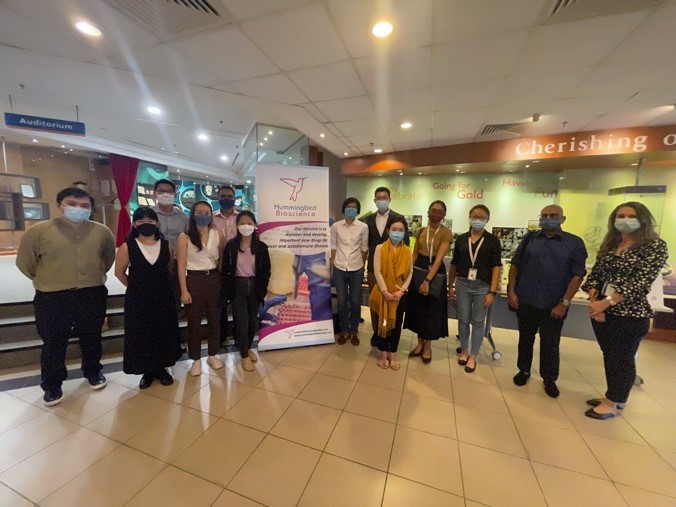
Translational Medicine Research Symposium – June 3, 2022
To encourage the collaboration and learning of the postdocs, NUS Medicine Office of Postdoctoral Affairs and Postdoctoral Association were involved in co-organising the Translational Medicine Research Symposium along the NUS Medicine Pharmacology team. NUS postdoctoral research fellows and graduate students from Yong Loo Lin School of Medicine were invited to share their work through selected oral presentations. The symposium focused on preclinical/clinical research including discoveries in disease mechanisms, biomarkers, therapeutic targets, and technologies that enhance our understanding of human diseases and potential applications in medicine. The symposium was graced by the presence of the Dean of NUS Medicine, Prof. Chong Yap Seng and Prof. Harvey Lodish, a founding member of the Whitehead Institute for Biomedical Research at MIT, who gave a keynote speech. In addition, oral presentation speakers were invited for lunch with Prof. Lodish for a conversation on career development.
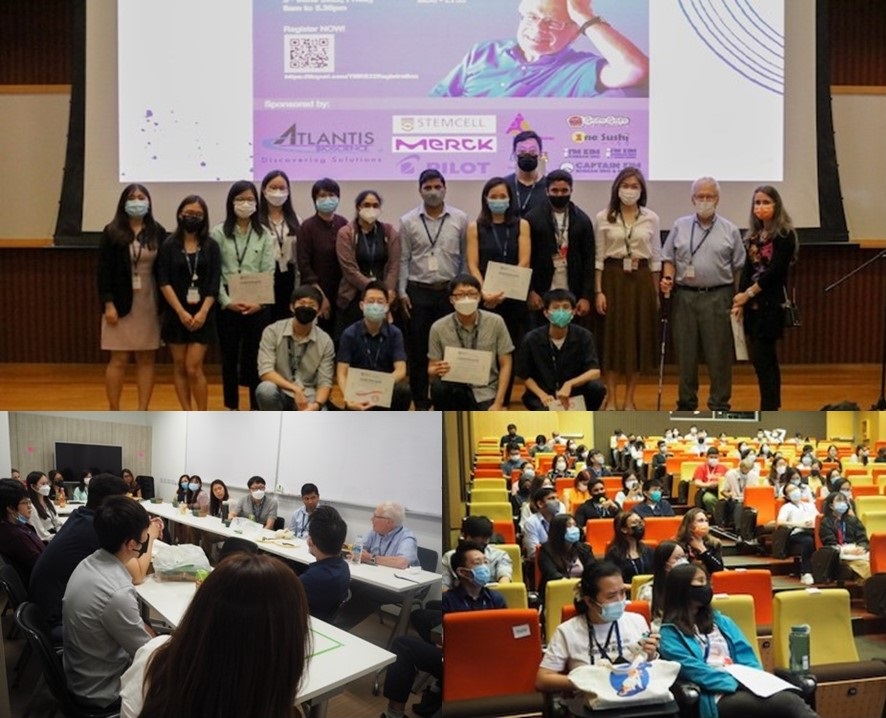
Teaching Career Inspiration Talk Series: A researcher? An educator? Or should I C.A.R.E? – May 30, 2022
Speaker: Dr Ivan Low, Lecturer, Director for continuous education teaching, Department of Physiology.
Education is essential to professional development and technological progress. To inspire NUSMed postdoctoral fellows and graduate students to embark on an Education career, we invited Dr Ivan Low to share about his passion for teaching. Dr Low attained his PhD at the NUS Yong Loo Ling School of Medicine, where he serves as Lecturer and Director for continuous education. In addition to his educator role, he is actively involved in his disciplinary research as he heads a Human Performance and Applied Physiology Laboratory. Ivan has won several Excellence Awards for his teaching engagements. He talked about his academic journey, challenges he continues to face and opportunities the educator track offers.
Take-home messages:
1. Finding the right mentor is essential to help shape your career.
2. Effective teaching involves 4 components: Prepare well to create Relevant Context; Ask Questions to train reasoning and critical thinking; Invoke Reflection to promote deeper learning; Deliver effectively by avoiding cognitive overload.
3. Find your own interest and passion to persevere and achieve your aspirations.
Feedback:
“The talk was truly inspirational. The talk was filled with lessons from Dr Ivan Low's life experiences. His commitment to research and dedication to educate the next generation of medical professionals is exemplary. Since different educators might have different career paths and perspectives on teaching, it would be great to hear from lecturers and professors from different departments. Speakers could talk about the topic of their choice as long as it would be beneficial to those wanting to become educators”.
“I find the talk inspiring as transitioning from a researcher role to an educator role is not mainstream and Dr Ivan is one of the few role models for researchers who wish to pursue a similar career path. His experiences from the transition are valuable for aspiring educators who are afraid about the uncertainties and challenges they might face. Thank you for organising this talk”.
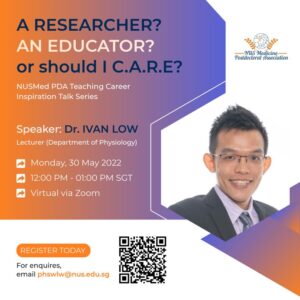
Talent Programmes in Biotechnology and Pharmaceuticals – May 26, 2022
Speakers:
Veronica Puah, Executive Director, Community & Brand, SGInnovate
Dr Sashi Kesavapany, Director, Human Health Potential, Biomedical Sciences, SGInnovate
As more and more postdocs expressed interest in pursuing careers in industry, companies have started to create their own talent development programmes to train postdocs on the industry side of science. SGInnovate was invited to talk about their initiatives to develop and connect the highly qualified, talented scientists with high-potential start-ups and to indicate pathways for successful transitions to biotechnology industries. SGInnovate highlighted lab-based and non-lab positions currently in-demand and how to best use research skills in a commercial biotech organisation. The seminar was followed by an engaging Q&A and networking sessions with talent professionals and postdoctoral peers.
Take-home messages:
1. Singapore’s biotechnology industry is projected to grow in the next few years.
2. The demand for highly qualified postdocs possessing relevant skills is set to increase.
3. Postdocs need to be aware of the available positions and the necessary skills.
4. SGInnovate is a platform offering job search, courses, workshops, competitive industrial internships and networking opportunities.
Feedback:
“This is a great platform for us, postdocs to make a career shift into the industry!”
“ This is amazing! I would definitely consider it!”
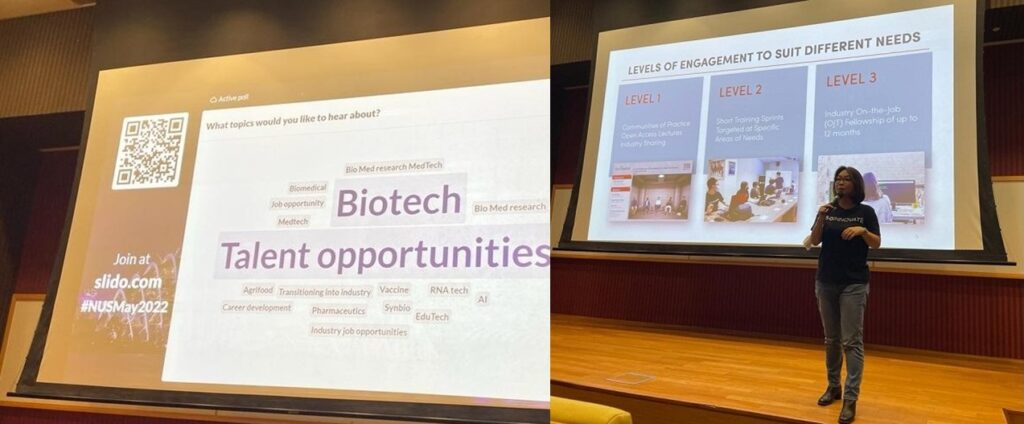
Art for Health – April 29, 2022
Speakers:
Ms Kng Mian Tze, Artist & Senior Manager, National Gallery Singapore
Ms Loo Hwee Hwee, Senior Art Therapist, National University Hospital
Art therapy is a powerful tool that can bring comfort and relief from the everyday. Organised by the Welfare Committee, this online workshop introduced attendees to techniques to manage chronic stress using a selection of artworks from the Care Collection curated by the National Gallery and Singapore Art Museum. The artworks were selected based on seven themes: Courage, Connection/Disconnection, Resilience, Hope, Growth, Self-Love/Self-compassion and Being in the Present. The workshop included ice-breaker activities, sharing how the artworks made the attendees feel as well as a hands-on activity to generate a feel-good photo/video art using objects in the immediate vicinity.
Take-home messages:
1. Consider colours and textures of artworks and think of feelings they invoke.
2. Accept your feelings and consider potential solutions. Look for clues in the artworks.
3. Surround yourself with feel-good objects and start creating art.
Feedback:
“It was a useful group session that compelled you to confront your emotions, accept them, relate to others and emerge with a positive, hopeful state of mind”.
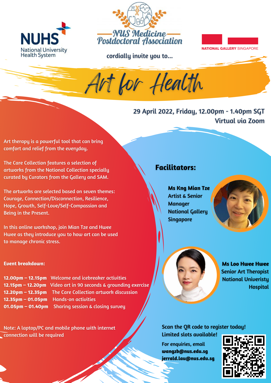
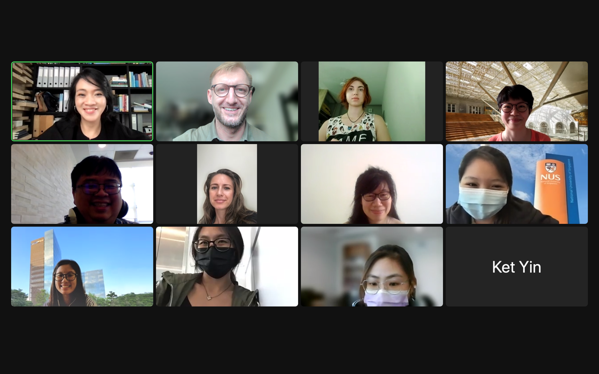
Panel Discussion Webinar: “Successful Transitional stories from Postdoc to PI” – March 24, 2022
Speakers:
Asst. Prof. Benoit Malleret, Department of Microbiology and Immunology
Asst. Prof. Adrian Teo, Department of Biochemistry, Medicine
Asst. Prof. Rufaihah Abdul Jalil, Department of Surgery
Paths to transition from postdoctoral research fellow to principal investigator are diverse and highly competitive. A Panel Discussion among the three principal investigators (PI), who have recently attained independent positions, was organised to offer postdoctoral research fellows a first-hand practical information. The panellists discussed strategies and qualities to adopt for the transition to become a PI; shared the aspects to pay attention to, challenges they faced and what they did to overcome them.
Take-home messages:
1. Publish consistently and work out a trajectory towards becoming a PI.
2. Be ready to develop new expertise and learn to manage a project using small grants.
3. Important to train a pioneer batch of research assistants when establishing a lab.
4. Gaining overseas research experience could be useful as it will encourage to compete internationally and establish collaborations.
5. It is critical to seek efficient and timely mentorship to get constructive feedback and guidance.
Feedback:
“It’s been amazing!”
“It was a brilliant sharing session, filled with relevant, straight-forward advice and direction; I wish It was a longer, 2-hour session”.
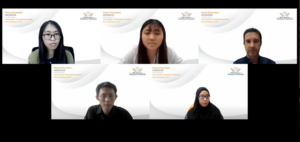
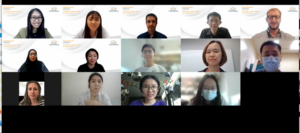
Masterclass in Executive Presence & High-Performance Presentation – February 17, 2022
Speaker: Pamela Wigglesworth, Communication Consultant, CEO Experiential Hands-on Learning
We kicked-off our programme with a stellar masterclass in Executive Presence & High-Performace Presentation co-organised by NUSMed Postdoctoral Association and Duke-NUS CDEP. Pamela Wigglesworth is a communication consultant, international speaker, author, and a CEO of Experiential Hands-on Learning working with individuals across multiple industries to empower and educate on executive presence and presentation skills.
In this masterclass, she explained the meaning of the executive presence and provided tips on how to become a charismatic communicator. Finally, she offered a few techniques to structure an impactful message and enhance online presentations. Attended by 144 participants, the audience was a mix of postdoctoral scientists and graduate students from NUS Medicine, A*STAR, and Duke-NUS.
Take-home messages:
- Get to know your audience
- Structure your presentation well to engage with your audience and make them well-informed.
- Summarise and link each topic in the presentation to make you sound rhetoric, eloquent, and clear in your message.
- Case, creativity, and delivery are important presentation benchmarks.
Feedback:
“Learnt to be concise, clear and confident!”
“Great tips for presenting to senior management, useful tips for connecting with a reluctant audience”.
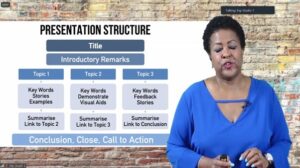
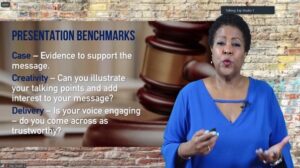
2020-21 Events
10X Genomics scientific webinar - June 11, 2021
The 10X Genomics Scientific webinar was organised to provide post-docs the opportunity to better understand the single-cell RNASeq technology which is fast becoming the go-to technique to identify and characterize rare cell types and biomarkers, or examine therapeutic mechanisms of action on a cell-by-cell basis with multi-omic characterization of tens of thousands of cells. We would like to thanks Dr Leo Chan, the Scientific & Technology Advisor at 10X Genomics for this interesting webinar, where he discussed the technologies and services available at 10xGenomics, using which one can explore cellular heterogeneity, novel targets, and biomarkers combined with gene expression, surface protein expression, or CRISPR edits in each cell – a complete picture from single cells at true resolution.
Forming effective Collaborations & Networks in the COVID era - May 28, 2021
During the hour-long Career & Development seminar, Dr Vandana Ramachandran, Director of Research & Academic Affairs at Singapore Eye Research Institute, shared tips on effective networking both during and prior to the COVID-19’s digital era. Dr Vandana briefly touched upon her personal experiences in networking and collaboration in her career when physical meetings were still the norm. She shared how networking may happen at any moment in time, even in the few minutes of an elevator ride. Some general tips for networking include reaching out to strangers for help when needed, putting in efforts to maintain a relationship after the initial contact phase and focusing on what one can give to the new contact instead of asking what one may receive from the newly establish contact.
Dr Vandana went onto highlighting the differences in the pre- and COVID-19 times, with most networking activities being conducted virtually. During COVID-19 times, digital presence in personal and professional social media becomes one’s name card, brand and identity. She also shared tips on virtual networking, including the use of technology like LinkedIn and ZOOM to connect with others, joining online breakout rooms and coffee chats, and inviting overseas speakers for webinars. Once again, she stressed that these new relationships should be “kept warm” with continual emails, phone calls and virtual coffee dates.
Thank you Dr Vandana Ramachandran for the insights and sharing your valuable time.
Reimagining Career Possibilities: Biotech Start-ups - May 28, 2021
The second industry webinar series organised by the NUSMed Postdoctoral Association, "Reimagining Career Possibilities: Biotech Start-ups" was led by our invited speaker Assistant Prof. Minh Le, the co-founder of Carmine Therapeutics, a start-up company based on red blood cell EVs in Singapore and Boston. An insightful seminar, Dr Minh Le shared with us some of the key decisions, critical 'breaks' and 'mistakes' and lessons drawn from her career leading to the birth of Carmine therapeutics.
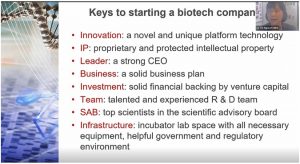
Dr Minh Le began with a quick overview of the Boston research landscape, and why Carmine Therapeutics was first set up in Boston: its proximity to her alma mater MIT, and the support programs from Boston startup accelerators and incubators being the key factors. She touched upon the start-up journeys of other now-famous brands like Moderna (known for the COVID-19 vaccine). She highlighted the benefits for biotech start-ups to focus on translational research on gene therapy, applications in rare diseases and their drug development, such as tax credits and market exclusivity. Dr Minh Le also drew from her own experience and shared with us how she manages her work-life balance especially in the context of Women in STEM.
It was a great opportunity for us to learn what it is like to take lab break throughs to innovative biotech startups, the critical success factors and support available for them. Attended by 45 pax, the audience was a mix of post-docs and graduate students from NUS Medicine, A*STAR and Duke-NUS. We thank Dr Minh Le for time and insights.
Passion and Perseverance Never Fail - April 29. 2021
As part of the Career Inspiration Talk Series, we invited Dr. Michelle Chang, a PhD alumnus of NUS Medicine who transitioned to teaching and is currently the co-founder of Geno House Tuition & Enrichment Centre. She has also authored well-regarded assessment books. Dr Chang shared with us her journey on the path less travelled to become an entrepreneur, the challenges faced in setting up a tuition centre in a country already saturated with them. Her success lay in their USP which was an emphasis on science and a hands-on teaching method which encouraged intellectual curiosity.
She also shared with us the other challenges and benefits of an entrepreneurial lifestyle over the years such as flexible work hours, choice of business location and branding. Most of all, the importance of passion and perseverance in any career path for success. Thank Dr Chang for such an inspiring talk.
Brief Overiew of Research Planning, Basic Design, Statistical Test & Sample Size - April 1, 2021
This seminar on statistics was led by Assistant Prof. Hla Myint Htoon (Eye ACP/Senior Reasearch Fellow, SERI ) who has been working in outcomes research since 2007 with Singapore Eye Research Institute and has co-authored more than 120 ophthalmology papers. Dr. Hla Myint Htoon first shared a brief overview of the basic principles and concepts of statistics in research. Followed by important criterial in study design, analytical method used for the experiment and sample size need for the experiment as well. And for studies involving animals, a pilot study with small number of animals was recommended when an experiment was designed and tested for the first time.
During the Q&A section, more specific questions were asked by participants relating to their own research. The webinar was attended by around 40 participants. Thank Dr Htoon for your time.
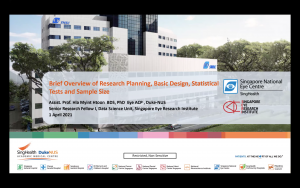
Reimagining Career Possibilities: Venture Capital - March 31, 2021
Dr Carolyn Ng, the Managing Director of Vertex Ventures HC, who has taken the route less travelled and established her career from a biomedical PhD to the venture capital (VC) sector, shared with us her journey, key decisions she made and deep dives into the critical 'breaks' and 'mistakes' made and lessons drawn in her career. It was a great opportunity for us to learn about venture capitalist, the current trends and how to transition into it!
The webinar was attended by 102 participants who were a mix of post-docs and graduate students from NUS Medicine and post-docs from fellow SG research institutes including A*STAR, Duke-NUS, NTU LKC Medicine
The speaker first began with a quick personal sharing of her life before VC as a PhD student at NUS Medicine, and subsequently shared about why she made the switch, first to a pharma strategy consulting firm, then to VC. Next, the speaker also shared about what is VC and answered questions along the way posted by the participants. Some of the topics raised during the webinar included work-life balance as a VC, availability of internships in Singapore for VC and the pre-requisites for VC (whether financial/investment knowledge is required).
The speaker has made a good point about going out to learn on the job instead of furthering studies again in order to make the transition. We are very thankful to Dr Carolyn for sharing her life journey & insights with us.
Mind Body Medicine I & II - March 18 & 25, 2021
The #2 & #3 of the NUS Medicine Mental Wellness Series, the two-part Mind Body Medicine seminars were led by Dr. Maleena Suppiah Cavert, an healthcare expert helming the undergrad & postgrad medical education at NUHS. She leads the staff well-being & health initiatives at NUHS, collaborating with counterparts in the healthcare sector and the Ministry of Health. A trained MBSR facilitator with her PhD on empathy in healthcare, she feels strongly about the importance of mental wellbeing for the success of any organization and was a great fit for this series.
The first session MBM session gave us a broad overview on the subject of Mental Health and was attended by 30 participants. The talk began with a survey with the participants about their mental health, if they have ever seeked help, or would want to seek help if needed. Perhaps unsurprisingly, most participants were reluctant to seek help due to the social stigma and a more serious organisational concern that their Supervisors at work are informed if Post-docs go the the University Health Centre for consultation or counselling. Dr Maleena then made a very striking comparison: "If you were to break your arm, would you visit a specialist or ignore it, hoping it would go away by itself?"
Yet, we avoid taking any active measures or seek help for our mental wellbeing. The speaker went on to discuss some important habits for mental wellness starting with Self-Compassion which resonated with many and was a nice call-back to the earlier talk on ways to overcome impostor syndrome. A very informative video from the School of Life underscored the need for it for self-care. Gratitude journaling, deep breaths and mindfulness were also touched upon.
The second session was with a smaller group of 9 participants and was a cosy conversation with the participants sharing their personal concerns and perspectives. Dr Maleena shared her insights on those concerns specifically - it was almost a mini-group counselling session. There was a lot of cross-conversation with senior post-docs providing their experience to fresher postdocs or new PhD students struggling with 'failure' or burn out with research.
The 2-sessions felt too short to cover the large breadth of the topic of mental wellbeing & we hope to bring more such sessions with specific topics with deeper insights. We are very thankful to Dr Maleena for sharing her valuable insights with us.
Imposter Syndrome, when the perfectionist feels like a fraud & how to overcome it - 26 February 2021
Often times, in the research community, the importance of mental health and tackling critical mental issues like imposter syndrome is overlooked & ignored. Doused in the never-ending academic rat race, the researchers are perennially suffering, knowingly or unknowingly, from issues that hinder them from growth & leading an overall healthy lifestyle.
Surprisingly, more than 70% of the academic professionals are estimated to experienced the Imposter Syndrome at some point in their career, which impedes the growth of the individual as well as the institution. The importance of mental health well-being is of high priority in big multinational firms. However, there’s little to no action taken to understand and address such issues like imposter syndrome among the post-doctoral fellows in research institutions. Realizing this huge gap, the moderators of Welfare committee of NUSMed-Postdoctoral Association, organized an empowering webinar to educate and create awareness of the impact of the Imposter Syndrome.
The resulting Mental Well-being Series#1 on “Imposter Syndrome, when the perfectionist feels like a fraud, & how to overcome it” showed great resonance in the postdoc community with 120 participants from NUS Medicine, A*STAR and NTU joining in for the webinar. The session was led by experienced speakers, Dr. Lakshmi Ramachandran (Program Manager, Duke-NUS & Science Coach) and Anupama Murali (ICF Certified Coach & Keynote Speaker). The approach and strategy employed by these experienced coaches made the session very eloquent and powerful. Through this interactive webinar, not only did we understand the key emotional states and conditions to identify oneself with imposter syndrome, but also learned how to handle the situation once identified.
The speakers began with a quick survey of what others said about us versus how we saw ourselves and the results were very telling. While others say that the audience do things well, are achievers and juggle tasks well, the audience themselves had a much lower bar for themselves, checking off boxes such as their work is far from perfect, they don’t know anything well, etc. With the largest word clouds being “stressed,” “anxious” and “inadequate”.
Dr Lakshmi went on to give the academic context, statistics and types of Imposter Syndrome, characterized by self-doubt, inadequacy and fear of failure. Ironically, the imposter syndrome affects highly accomplished people, both men and women across all age groups, often with co-morbidity with anxiety and depression. Although medically not identified as a condition, this often leads to anxiety and depression that can be best treated with coaching, psychotherapies and trainings.
Ms Anupama guided us through the powerful 3R strategy of “reconnect, reframe and reach-out” taught how such situations should be managed & find answers under given situations. We were shown how to refocus and channelize our mindset to “power the but” which can help motivate us to take positive actions. The key lies in accepting oneself and harnessing the power of curiosity to grow and emerge as a leader. The concept of 'Enoughness' was very insightful. This was followed by a lively Q&A. A very enjoyable and illuminating session.
We are very thankful to the speakers Dr Lakshmi Ramachandran and Anupama Murali for sharing with us their invaluable insights. This was one of the first mental well-being series conducted by the NUSMed Postdoctoral Association and definitely not the last. The positive feedback from the participants signifies that such sessions are the need of the hour.
Tips & Automation For Live Cell Imaging by Zeiss - February 3, 2021
Attended by 55 participants, this seminar was led by Tan Shin Ming, an Imaging Application Specialist from ZEISS. He shared how live-cell imaging can benefit our research and demonstrate strategies and techniques to attain a successful and beautiful live-cell image. Topics include an array of cutting edge tools that Zeiss has developed, challenges in live-cell imaging, and other imaging tools that are beneficial for live-cell imaging. Thank you Tan Shin Ming for the knowledge session.
Prepare for your Career Transition: Resume and Cover Letter Writing for Postdocs - 14 January, 2021
The NUSMed Postdoctoral Association organised a Career & Development Virtual Session on 14 January, 2021 to help NUSMed postdocs prepare for career transitions by inviting Mr Linus Mok, with 7 years of experience in talent acquisition and HR development to share his tips on resume writing and self-marketing via LinkedIn.
Attended by 34 NUSMed postdocs it was a valuable session with Linus sharing the differences between a Curriculum vitae and a resume, the pitfalls and clichés to avoid when writing either. He also advised the use of a short paragraph of personal statement in the CV or resume as a quick ‘sales pitch,’ to impress recruiters and hiring managers by describing job achievements via the CAR (Challenge – Action – Results) method and the why-and- how-to tailor make resumes when applying to different job openings. Linus also highlighted the significance of a professional social media platform, LinkedIn, in job search – an avenue for potential employers to get to know a job seeker as a human on the whole. He also shared tips on creating captivating LinkedIn profiles, followed by Q&A.
We thank Mr Linus Mok for the very educational seminar and look forward to bringing you more such valuable sessions.
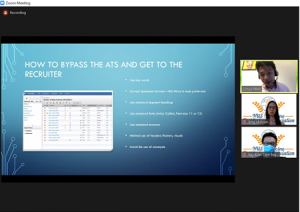
Finding Your Impact Factor in Life - January 11, 2021
Dr Chen Zhi Xiong, an NUS alumnus and currently the Assistant Dean for Education at NUS Medicine shared with us his motivation to become a lecturer, and how he got there, along with advise for 34 attending post-doctoral fellows.
His journey as an aspiring scientist began with his primary-3 essay! During his PhD, he was given the opportunity to teach as a teaching assistant (TA) as part of the requirements for the PhD program. He enjoyed teaching so much that he volunteered to teach more than required. The students also engaged with him about non-school matters and he realised that his teaching had an impact beyond academic aspects. The joy of seeing students grow from learning is a form of an impact he would rather chase than “Journal Impact Factors”.
He also shared that biomedical research is not the only form of research one can participate in. As an educator, he utilizes critical thinking skills in research relating to education, where his work could impact how education is conducted.
Dr Chen then ended off the talk with some 3 tips that one should not do to find their calling – do not be too quick to seek closure, do not shy away from struggles and do not stick with conventions or be afraid of stigma. Instead, find your purpose in life by having an open mind.
Dr Chen also addressed a question about mentorship in the lab and how valuable is that for applying for lecturing positions. He stated that while there are many different techniques for teaching a small/large class or mentoring, mentoring is one style of teaching that he considers to be one of the most valuable experience. He mentioned that it is very personal and many other aspects such as empathy does not apply in the context of a classroom setting.
A truly motivational and impactful talk! Thank you Dr Chen.
NUS Medicine Postdoctoral Olympics - 18 December 2020
Led by the Welfare committee, the 'Postdoctoral Olympics' was NUS Medicine Postdoctoral Association's first-ever online games day. A social event to allow postdocs to interact & network with their peers in a casual setting & to relax and just have some fun after the stressful year. Full of games with a 'Science-y' twist, it was a great 2 hours spent together virtually.
Games included Research BINGO, using research manuscript titles full of puns for participants to cross out. Titles like “Tooth, tooth and nothing but the tooth: how belief in the Tooth fairy can engender false memories” and “miR miR on the wall, who's the most malignant medulloblastoma miR of them all?” drew a lot of laughter and inspiration for our research manuscript titles for future! This was followed up with the GUESS WHO/WHAT played in teams to guess pictures of famous people (scientists, fictional characters, politicians, singers, & more) and biological equipment/concepts (Mitosis & Halliday junctions anyone?) instantaneously to earn points - which was far more difficult than anticipated & took 12 rounds before Team B won. We ended with TRIVIA – fastest finger first about questions from all topics from OSCARS-2020 to Nobel Prize for Medicine 2020.
An enjoyable experience to connect virtually and interact. Looking forward to more such social events in the future.

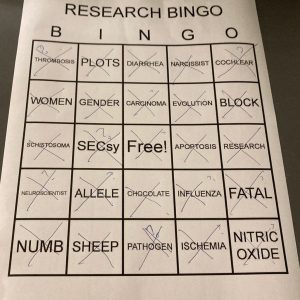
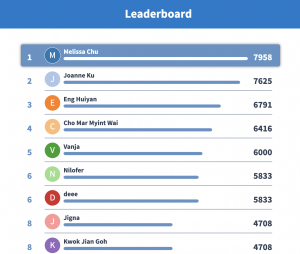
2019-20 Events
Postdoc and Postgraduate Career Development Virtual Session: Which Career is the Best Fit? - Associate Professor Pablo Bifani - 24 August 2020
The NUSMed Postdoctoral Association organised a Career Development Virtual Session on 24 August 2020 which was focused on "Which Career is the Best Fit". We were honoured to have Associate Professor Pablo Bifani from the Department of Microbiology & Immunology (NUS), who also hold joint-Professorship at the Singapore Immunology Network (SIgN), A*STAR, and the London School of Hygiene and Tropical Medicine (LSHTM), U.K., to share with 43 participants his work experience in academia (institutes and universities), industry, and start-up companies across the globe. Prof Pablo also shared insights of the working structure and requirements of the industries and companies which he worked in, and was well-received by the audience for the information. The overall session satisfaction was highly rated by the participants.
We thank Associate Professor Pablo for the informative and enlightening talk and we look forward to bringing you more of such valuable sessions.
Postdoc and Postgraduate Career Development Virtual Session: Which Career is the Best Fit? - Dr KOH Shuwen - 27 July 2020
The NUSMed Postdoctoral Association organised a Career Development Virtual Session on 27 July 2020 which was focused on "Which Career is the Best Fit". We were honoured to have Dr Koh Shuwen, Director of the NUHS Innovation Transfer Office, to share with 44 participants her experience, anecdotes and perspective on how to look outside of academia for the next career option. Questions from participants were also adeptly answered with relevant pointers discussed with tips and resources. The overall session satisfaction was highly rated by the participants.
“Dr. Koh's slide was the most helpful. [sic] benefit way more from very blunt, straight to the point suggestions..”
“[sic] good to bring someone from Industry to give a similar talk and share their views on opportunity"
We thank Dr Koh for the informative and enlightening talk and we look forward to bringing you more of such valuable sessions.
Nature Research Academies: Author Training Webinar - Logically Structuring your Manuscript - 29 May 2020
The goal of publishing a study is to ensure that the field understands the significance and impact of the author’s research. Doing so will not only help advance the field but also establish the reputation and influence of the author amongst their peers. This webinar provides practical insights and strategies to help authors achieve this goal.
Feedback from the participants include:
• “I liked the webinar. It is very useful for young researchers, like me.”
• “This webinar is very useful in terms of guiding me to write a manuscript. The content is well organised, and supported by good example and clear explanation.”
• “I really liked how clear and structured everything was laid out. More importantly, it helped me appreciate things from 2 angles- the editor, and the reader.”
• “Important strategies on writing and structuring the manuscript was given. However, I'd hope to see more advice on how to write for different specific journals instead of only traditional broad-based journals.”
• “I liked how the webinar was structured and the trainer was clear and engaging. He backed many of the points he gave with real life examples which helped with my understanding. However, i feel like the webinar was slightly short and more hands on activity could be provided.”
This seminar is organized by the NUS Medicine Postdoctoral Association
Seminar - LLP, GRIP, JUMPSTART, Executive Deep Tech Programme - 04 December 2019
This seminar is conducted with the aim of allowing our postdocs to find out more about the commercialization programmes (LLP, GRIP, JUMPSTART, Executive Deep Tech programme) that could bring their innovation idea to commercial reality and the resources available to support entrepreneurial learning and aspirations! From individuals to teams, from product prototyping and market validation to start-ups ready to scale, such programmes are able to provide a comprehensive suite of mentorship, funding, support, and other resources to bring ventures to greater heights!
This session is jointly brought to you by the NUSMedicine Postdoctoral Association and Industry Liaison Office.
NUS Medicine - Merck Scientific Partnership Seminar - 18 October 2019
The objective of this seminar is to begin conversations and foster collaborations between academia in NUS Medicine and the industry so as to synergize our research capabilities for more impactful outcomes. This year we see presentations from both NUS Medicine and Merck for potential collaboration.
This seminar is organized by the NUS Medicine Postdoctoral Association REINVENT Team in partnership with Merck Life Science and Merck Biopharma.
2018-19 Events
NUSMed Postdoctoral Fellowship (PDF) engagement session - 17 April 2019
Grant Enhancement Training workshop by SCRI (Singapore Clinical Research Institute) and MSC - 6 March 2019
SCRI and the MSC jointly-organised the Grant Enhancement Training workshop whereby participants get to pick up tips in writing good grant applications for medical research projects. The NUSMed Postdoctoral Association President, Simbu, kicked off the workshop with a brief introduction of the association.
Practical Approach to Biostatistics Part 1 - 27 February 2019
The workshop discussed key statistical and research experimental design concepts that are relevant for both in vitro and in vivo animal studies. In addition, Dr Kenneth Ban from MSC Data analytics Core introduced a free statistical tool which can be applied for power calculations and key statistical analysis. 53 participants attended the workshop.
Sharing session on Lean Launchpad Singapore - 16 January 2019
The NUSMed Postdoctoral Association organised a sharing session by two Lean Launchpad Singapore (LLP) alumni, Dr. Gunnar Poplawski and Dr. Irwin Cheah. The Lean Launchpad Programme was conducted to help research scientists and engineers turn their inventive technologies into commercially viable products and feasible business ventures. They shared their experiences and challenges as different leads in spearheading an interesting project revolving around a brain health supplement.
Career Development Seminar - 10 October 2018
The NUSMed Postdoctoral Association organised a career development talk on 10 October 2018 which was focused on "Preparing for Your Next Step". Hosted by Dr Cheong Jit Keong (Department of Biochemistry), we were honoured to have his mentor, Professor Shirish Shenolikar from Duke-NUS, share with 52 participants his experience, anecdotes and perspective as a scientist who have been through the rigours of academia and the industry. He walked through with us his learning journey from academia to industry, the different (and contrasting) expectations in the two fields, the importance of mentorship and mentors (not to be confused with your Principal Investigators) and right down to the books that he would recommend in picking up soft skills that might be especially useful in our research career. It was an entertaining and enlightening talk and we look forward to organising the next follow-up career development seminar.
Medical Science Cluster Day - 15 August 2018
The NUSMed Postdoctoral Association participated in the Medical Science Cluster day with a booth publicising for our association and for our membership recruitment drive. We also took the opportunity to interact and liaise with the various core facility teams and to jointly organize several workshops with them in the upcoming months.
Social Event (Launch of NUSMed Postdoctoral Association) - 20 July 2018
The NUSMed Postdoctoral Association was officially launched on 20th July 2018 commemorating a milestone for School.
The event started with Associate Professor Kevin Tan Shyong Wei and Professor Hooi Shing Chuan congratulating the the team on the formation of the Association. Associate Professor Lina Lim Hsiu Kim shared her postdoctoral experience at John Hopkins University Medical School and her journey to becoming a faculty member in NUS Medicine and Residential Fellow at Tembusu College. Next, Dr Cheong Jit Kong recalled his experience as a founding member of Duke-NUS Early Career Scientists Association (DUNES). This was followed by Dr Inthrani's brief on the new professional development framework for the postdoctoral fellows called the REINVENT programme (more details in the link).
The evening ended off with the community of postdoctoral fellows bonding over dinner. The event was a great success, as captured by the vibrant smiles on everyone. We look forward to more friendships and collaborations among the postdoctoral fellows!


